JAMES VI and i
The True Law of Free Monarchies
(1598)
Before becoming king of England, James VI wrote a book about his views on the proper rights and power of monarchs. His views expressed in this work, while he sat on the throne in Scotland, would foreshadow the Stuart’s claims to power
Introduction
What follows is a short excerpt from a book published by James VI of Scotland, who would become King of England after Queen Elizabeth’s death in 1603. Here he explains his understanding of the rights and powers of kings. Does he believe Kings should have any restraints? If they do wrong, who is to judge or punish them? How are kings chosen?
Holly Brewer
Further Reading
Sources
- James I. The True Lawe of Free Monarchies, or, The Reciprock and Mutuall Dutie Betwixt a Free King and His Naturall Subjects. 2nd Edition. (London: T. C[reede], 1603.)
- Library of Congress, Law Library Rare Books Collection. JC153.JC 1603
- Transcription by Michael Becker and Dylan Bails.
Cite this page
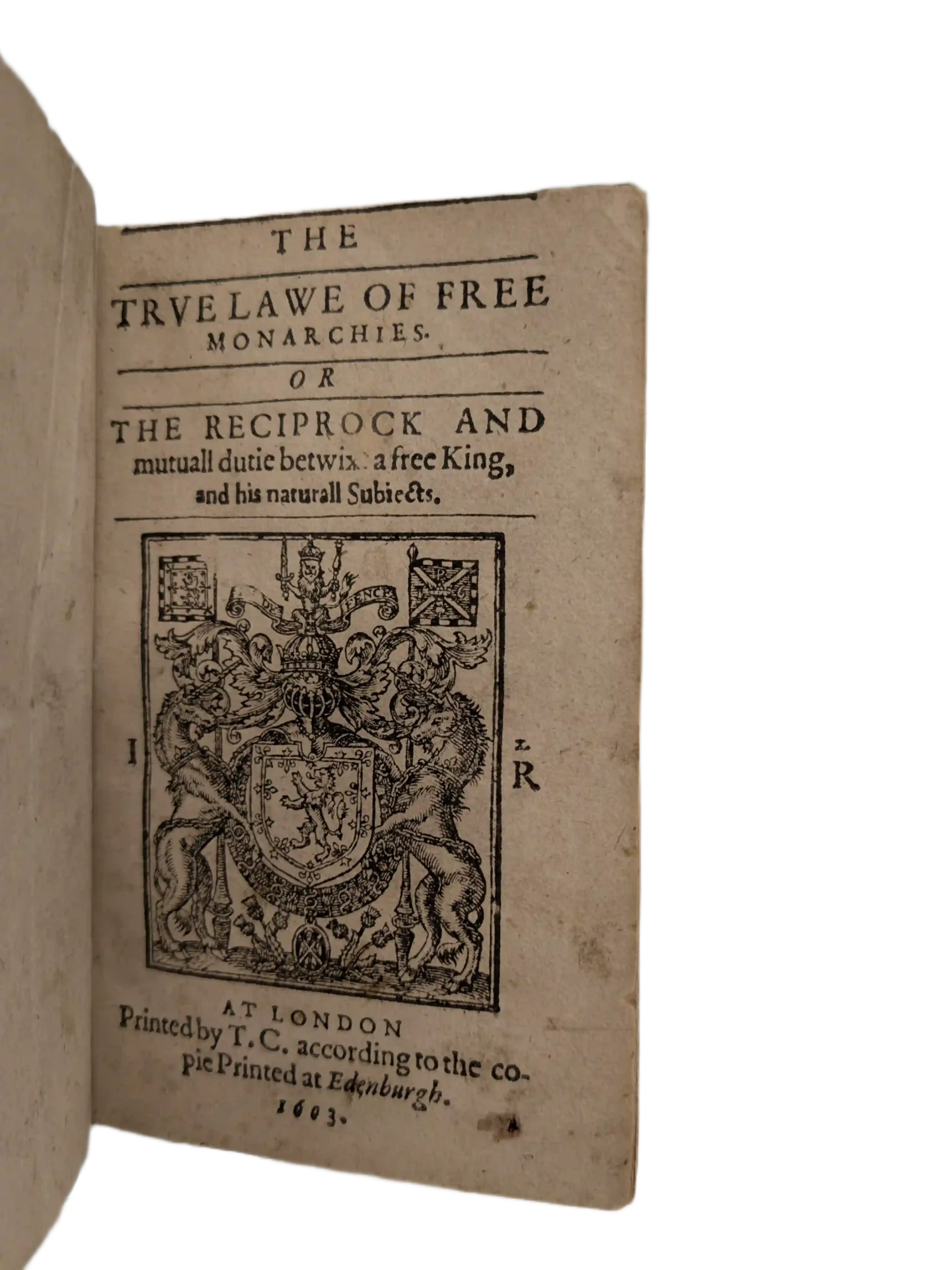
THE
TRUE LAWE OF FREE
MONARCHIES.
OR
THE RECIPROCK AND
mutuall dutie betwixt a free King,
and his naturall Subjects.
AT LONDON
Printed by T.C. according to the co-
pie printed at Edenburgh.
1603.
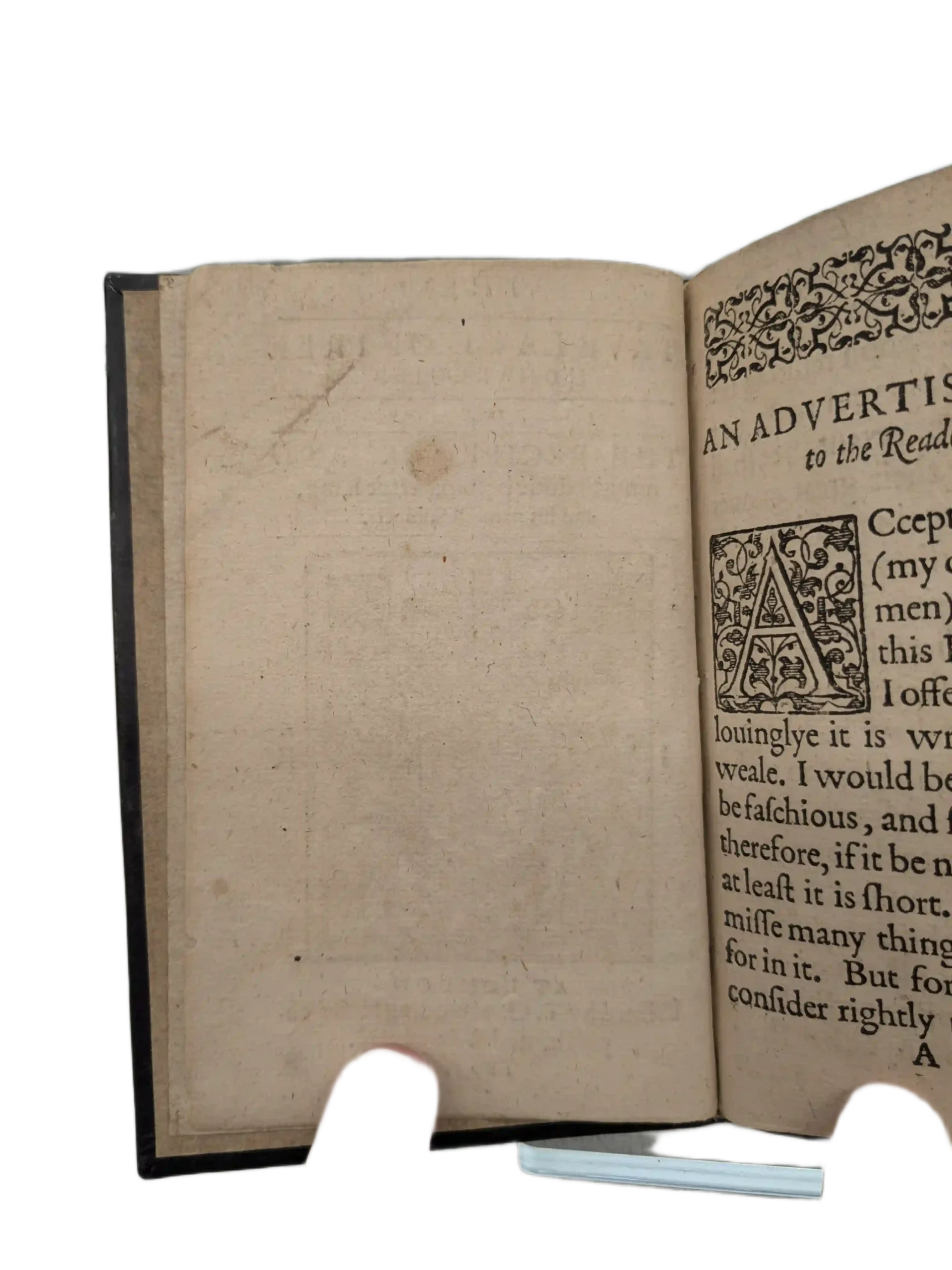
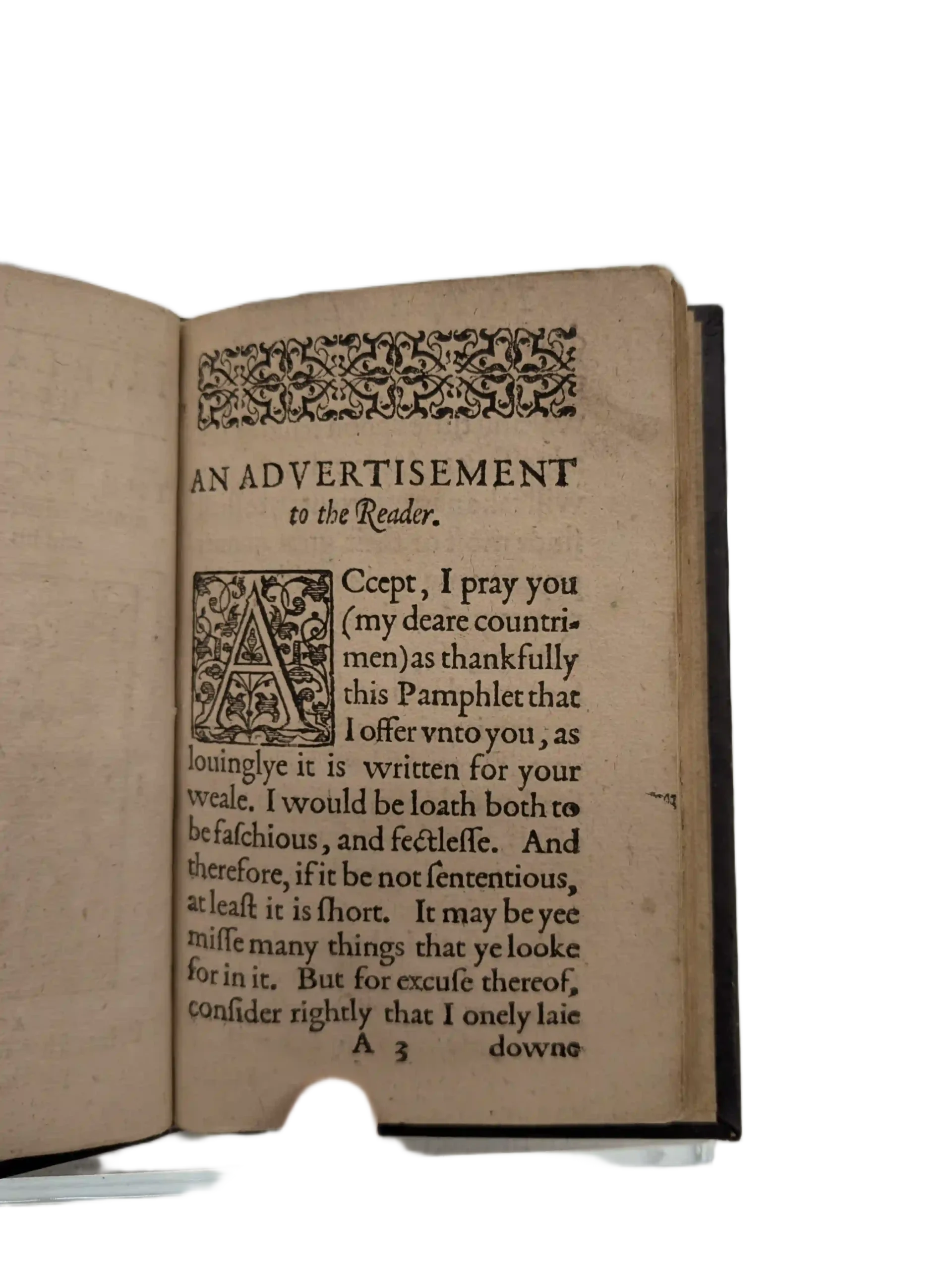
AN ADVERTISEMENT
to the Reader.
ACcept, I pray you
(my deare countri-
men) as thankfully
this Pamphlet that
I offer unto you, as
lovinglye it is written for your
weale. I would be loath both to
be faschious, and fectlesse. And
therefore, if it be not sententious,
at least it is short. It may be yee
misse many things that ye looke
for in it. But for excuse thereof,
consider rightly that I onely laie
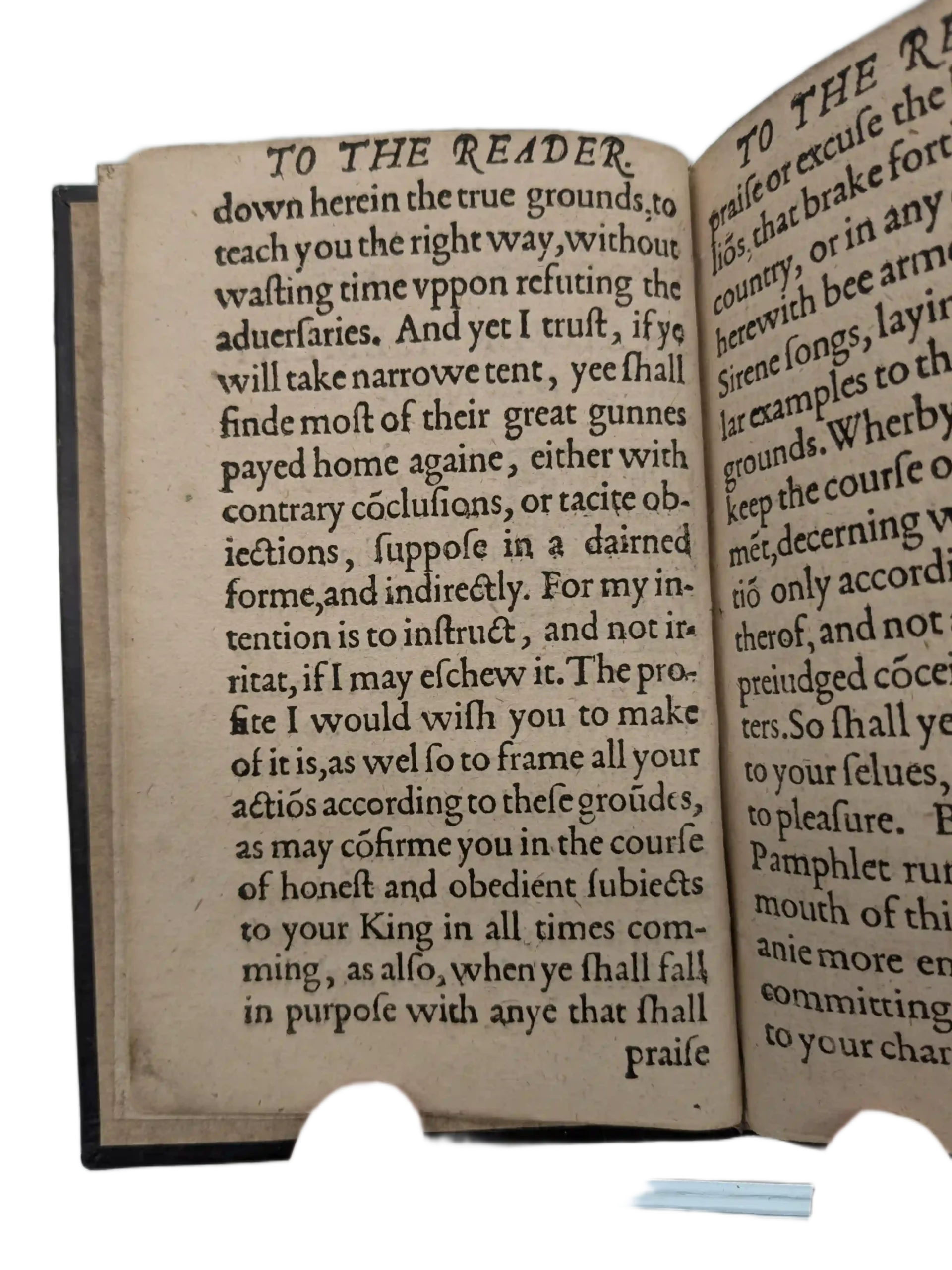
down herein the true grounds to
teach you the right way, without
wasting time uppon refuting the
adversaries. And yet I trust, if ye
will take narrowe tent, yee shall
finde most of their great gunnes
payed home againe, either with
contrary conclusions, or tacite ob-
jections, suppose in a dairned
forme, and indirectly. For my in-
tention is to instruct, and not ir-
ritat, if I eschew it. The pro-
site I would wish you to make
of it is, as wel so to frame all your
actions according to these groundes,
as may confirme you in the course
of honest and obedient subjects
to your King in all times com-
ming, as also, when ye shall fall
in purpose with anye that shall
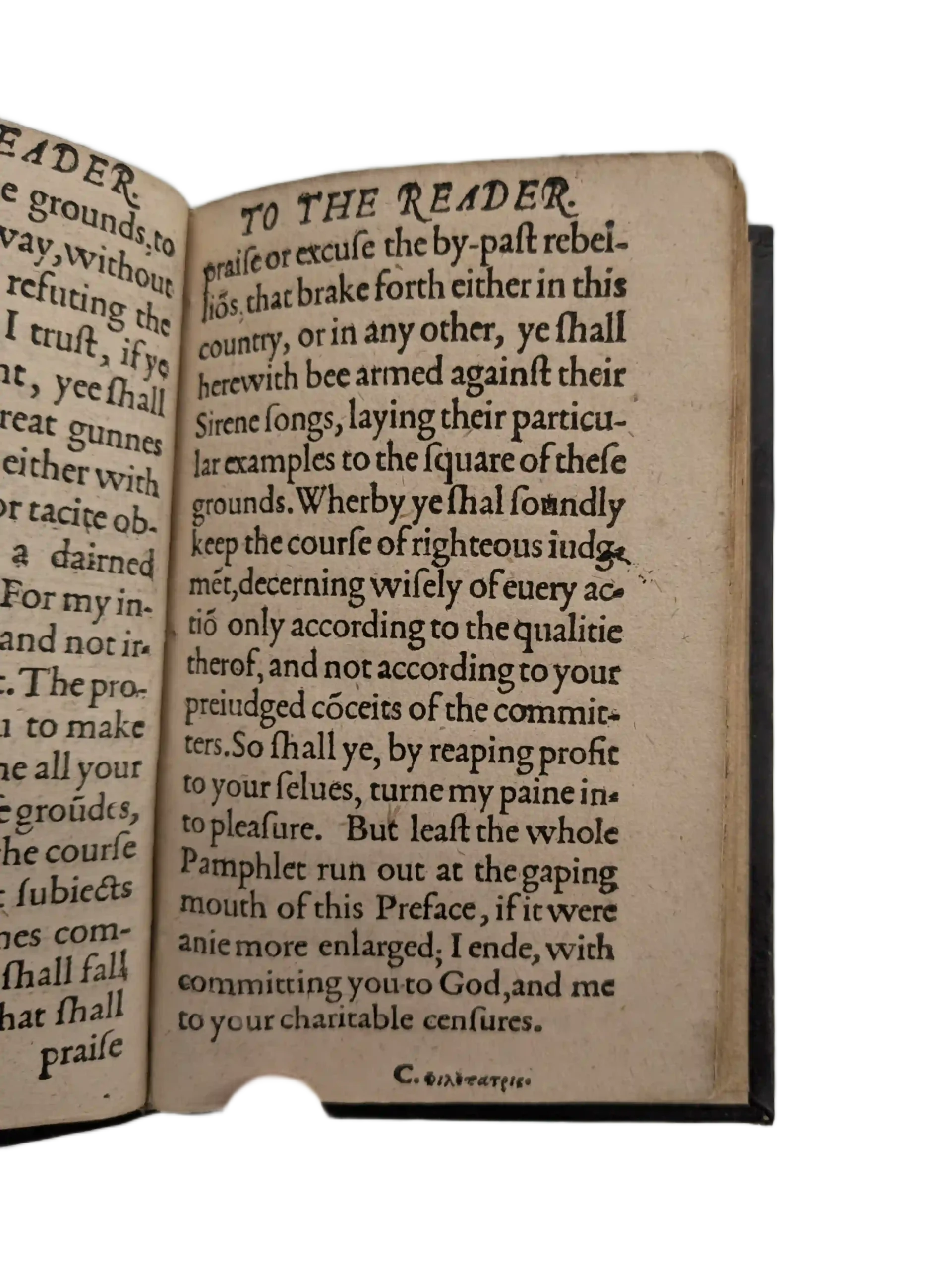
praise or excuse the by-past rebel-
lions, that brake forth either in this
country, or in any other, ye shall
herewith bee armed against their
Sirene songs, laying their particu-
lar examples to the square of these
grounds. Wherby ye shall soundly
keep the course of righteous judge-
ment, decerning wisely of enery ac-
tion only according to the qualitie
therof, and not according to your
prejudged conceits of the commit-
ters. So shall ye, by reaping profit
to your selves, turne my paine in-
to pleasure. But least the whole
Pamphlet run out at the gaping
mouth of this Preface, if it were
anie more enlarged; I ende, with
committing you to God, and me
to your charitable censures.
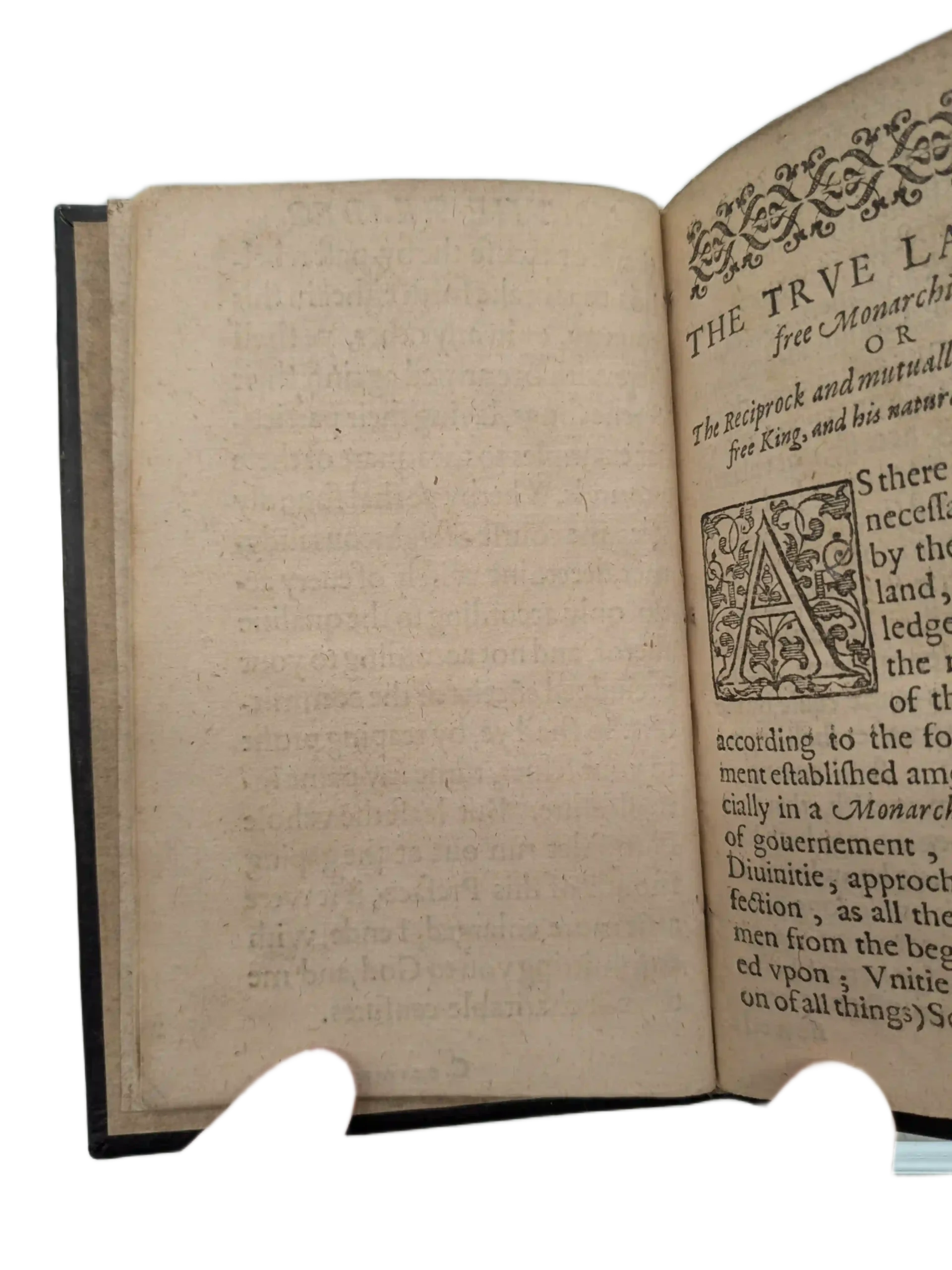
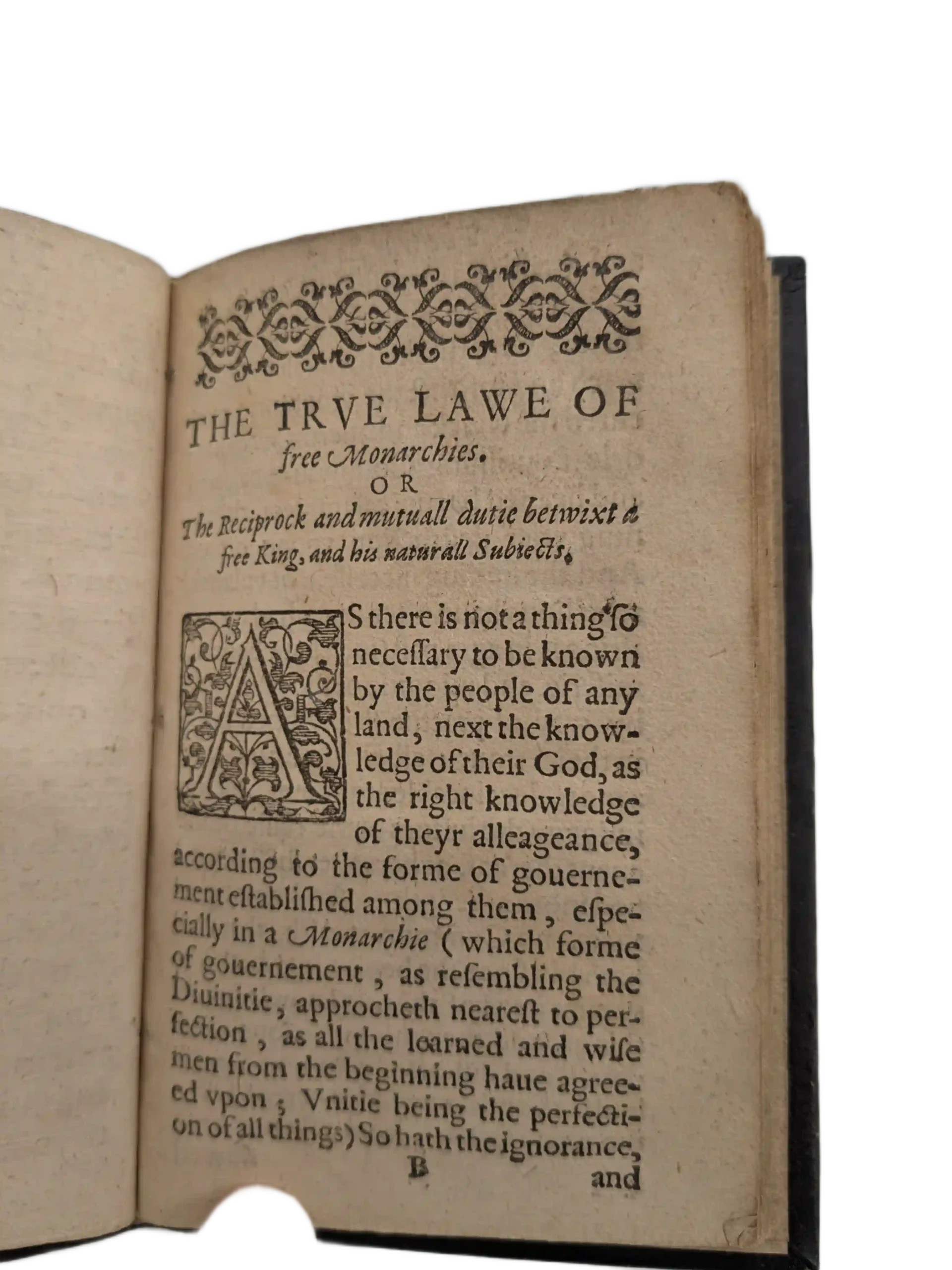
THE TRUE LAWE OF
free Monarchies,
OR
The Reciprock and mutuall dutie betwixt a
free King, and his naturall Subjects,
AS there is not a thing so
necessary to be known
by the people of any
land, next the know-
ledge of their God, as
the right knowledge
of theyr alleageance,
according to the forme of governe-
ment established among them, espe-
cially in a Monarchie ( which forme
of governement, as resembling the
Divinitie, approcheth nearest to per-
fection, as all the learned and wise
men from the beginning have agree-
ed upon; Unitie being the perfecti-
on of all things) So hath the ignorance,
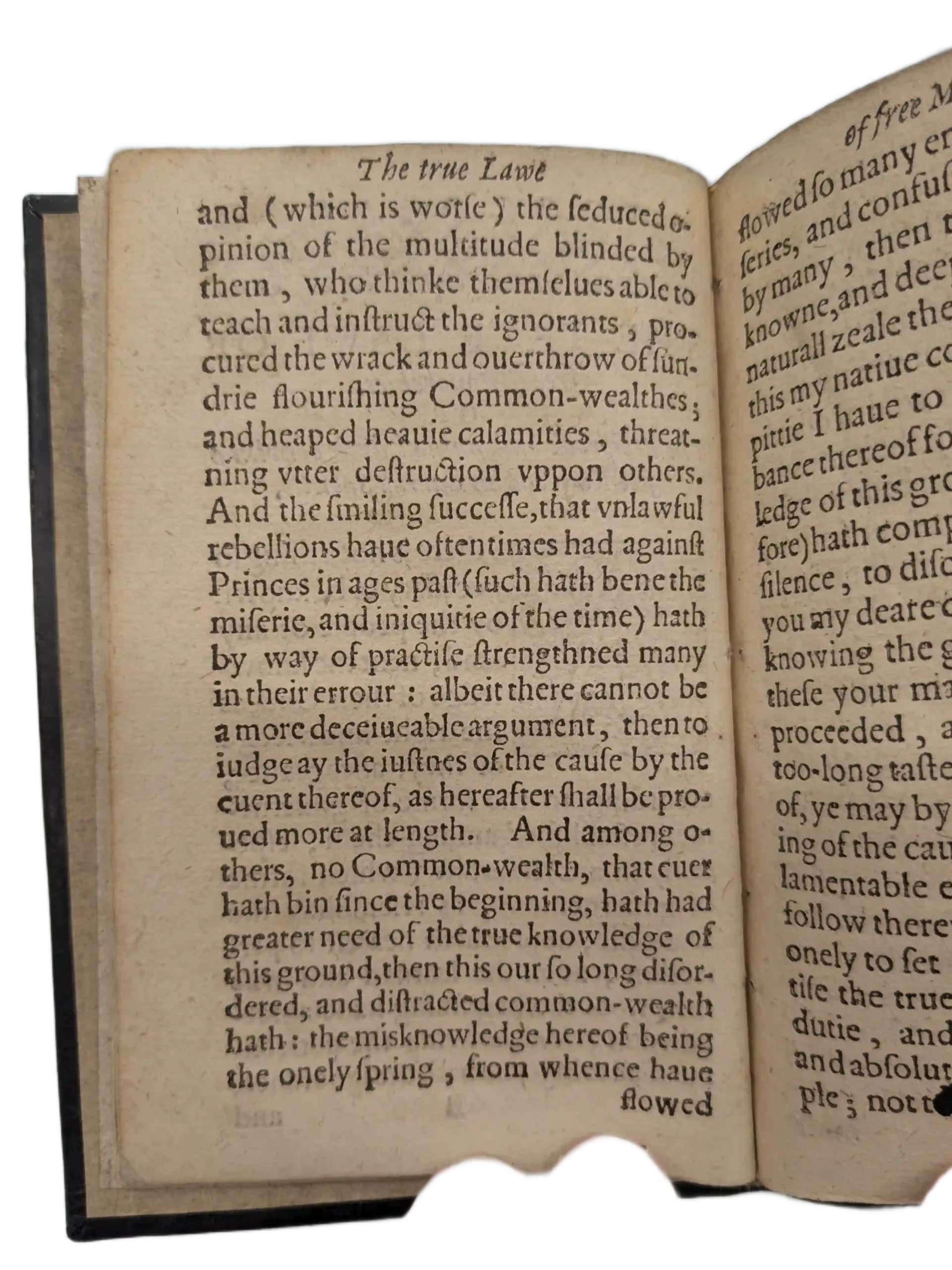
and ( which is worse ) the seduced o-
pinion of the multitude blinded by
them, who thinke themselves able to
teach and instruct the ignorants, pro-
cured the wrack and overthrow of sun-
drie flourishing Common-wealthes;
and heaped heavie calamities, threat-
ning utter destruction uppon others,
And the smiling successe, that unlawful
rebellions have oftentimes had against
Princes in ages past (such hath bene the
miserie, and iniquitie of the time ) hath
by way of practise strengthned many
in their errour : albeit there cannot be
a more deceiveable argument, then to
judge ay the justnes of the cause by the
event thereof, as hereafter shall be pro-
ved more at length. And among o-
thers, no Common-wealth, the ever
hath bin since the beginning, hath had
greater need of the true knowledge of
this ground, then this our so long disor-
dered, and distracted common-wealth
hath : the misknowledge hereof being
the onely spring, from whence have
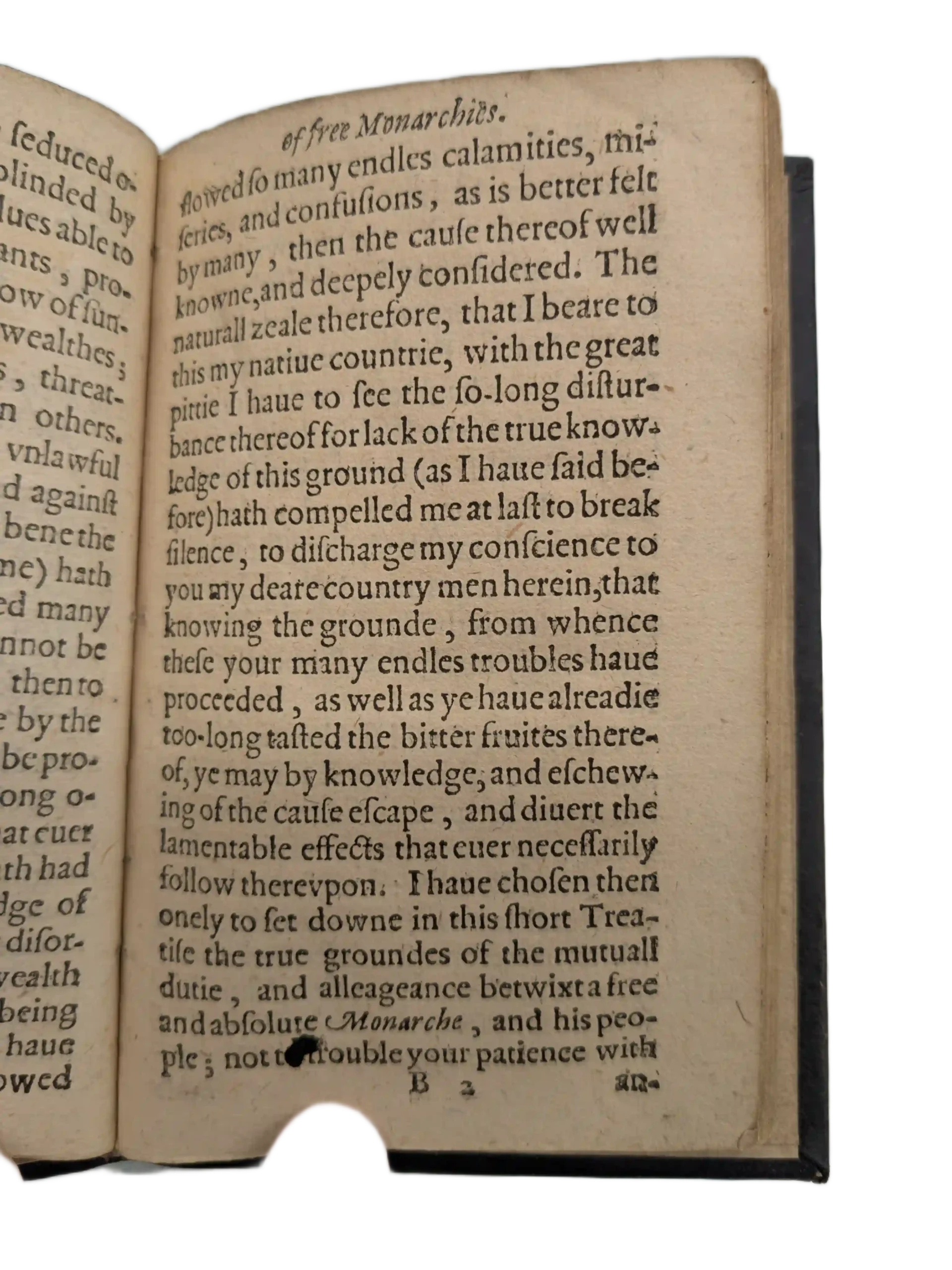
flowed so many endles calamities, mi-
series, and confusions, as is better felt
by many, then the cause thereof well
knowne, and deepely considered. The
naturall zeale therefore, that I beare to
this my native countrie, with the great
pittie I have to see the so-long distur-
bance thereof for lack of the true know-
ledge of this ground (as I have said be-
fore) hath compelled me at last to break
silence, to discharge my conscience to
you my deare country men herein, that
knowing the grounde, from whence
these your many endles troubles have
proceeded, as well as ye have alreadie
too-long tasted the bitter fruites there-
of, ye may by knowledge, and eschew-
ing of the cause escape, and divert the
lamentable effects that ever necessarily
follow thereupon. I have chosen then
onely to set downe in this short Trea-
tise the true groundes of the mutuall
dutie, and alleagence betwixt a free
and absolute Monarche, and his peo-
ple ; not to trouble your patience with
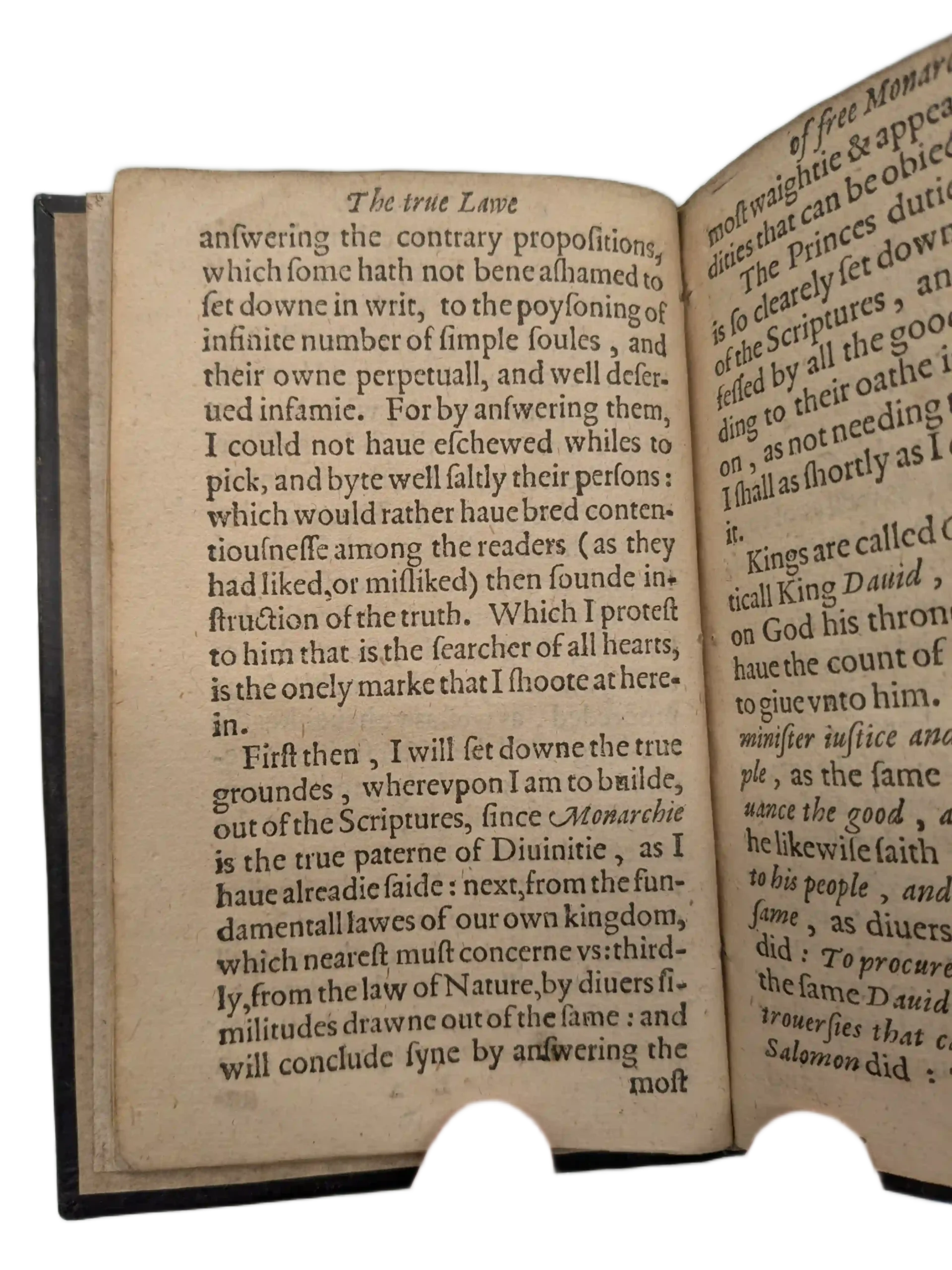
answering the contrary propositions,
which some hath not bene ashamed to
set downe in writ, to the poysoning of
infinite number of simple soules, and
their owne perpetuall, and well deser-
ved infamie. For by answering them,
I could not have eschewed whiles to
pick, and byte well saltly their persons :
which would rather have bred conten-
tiousnesse among the readers (as they
had liked, or misliked) then sounde in-
struction of the truth. Which I protest
to him that is the searcher of all hearts,
is the onely marke that I shoote at here-
in.
First then, I will set downe the true
groundes, whereupon I am to builde,
out of the Scriptures, since Monarchie
is the true paterne of Divinitie, as I
have alreadie saide : next, from the fun-
damentall lawes of our own kingdom,
which nearest must concerne us: third-
ly, from the law of Nature, by divers si-
militudes drawne out of the same : and
will conclude syne by answering the
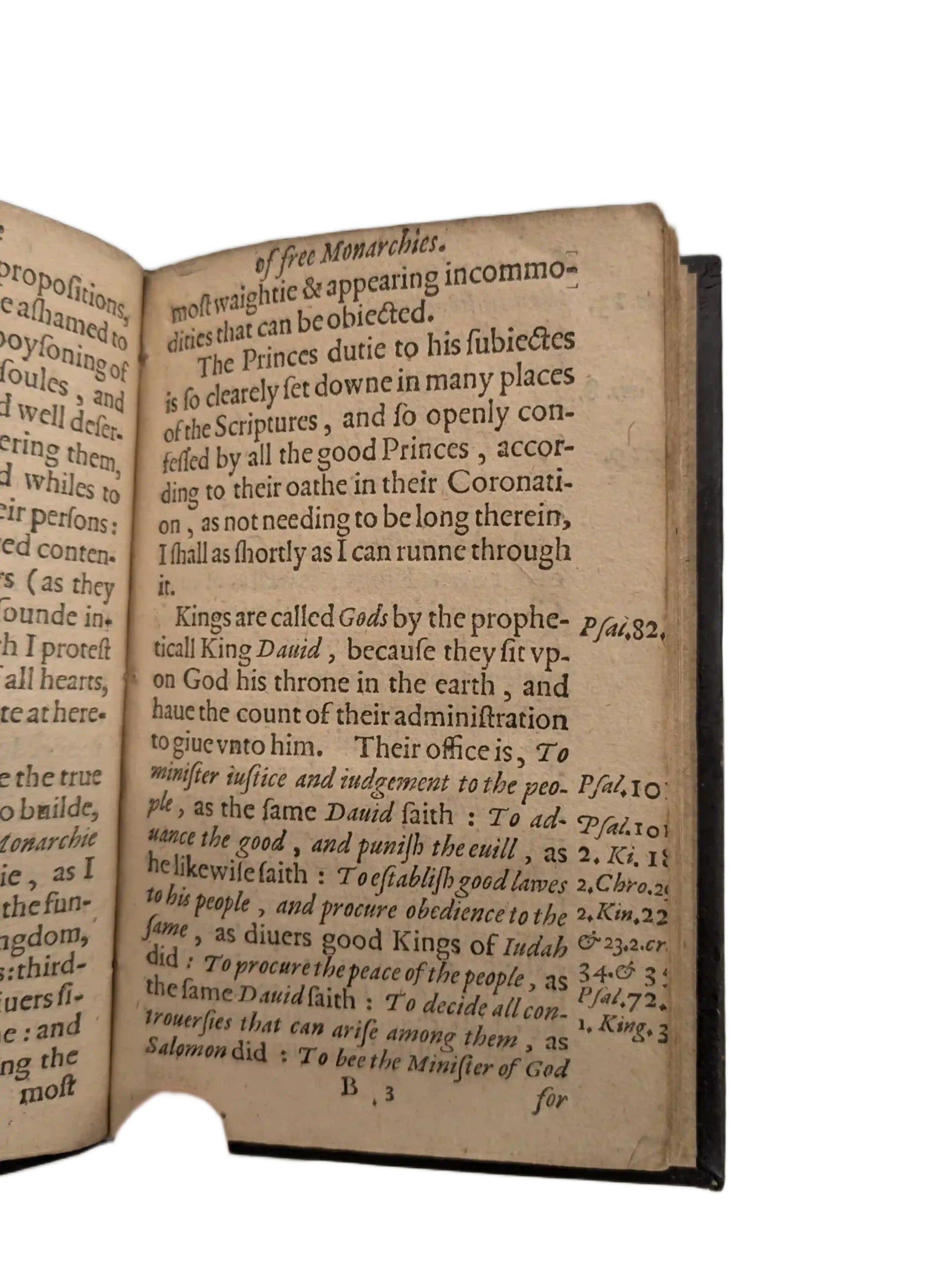
most waightie & appearing incommo-
dities that can be objected.
The Princes dutie to his subjectes
is so clearely set downe in many places
of the Scriptures, and so openly con-
fessed by all good Princes, accor-
ding to their oathe in their Coronati-
on, as not needing to be long therein,
I shall as shortly as I can runne through
it.
Kings are called Gods by the prophe-
ticall King David 1Psal. 82 , because they sit up-
on God his throne in the earth, and
have the count of their administration
to give unto him. Their office is, To
minister justice and judgement to the peo-
ple, as the same David saith 2Psal. 101. 2 King 18. 2 Chro 29. 2 Kin 22. & 23.2.34, & 35. Psal 72 1 King. 3. : To ad-
vance the good, and punish the evill, as
he likewise saith : To establish good lawes
to his people, and procure obedience to the
same, as divers good Kings of Judah
did : To procure the peace of the people, as
the same David saith : To decide all con-
troversies that can arise among them , as
Salomon did : To bee the Minister of God
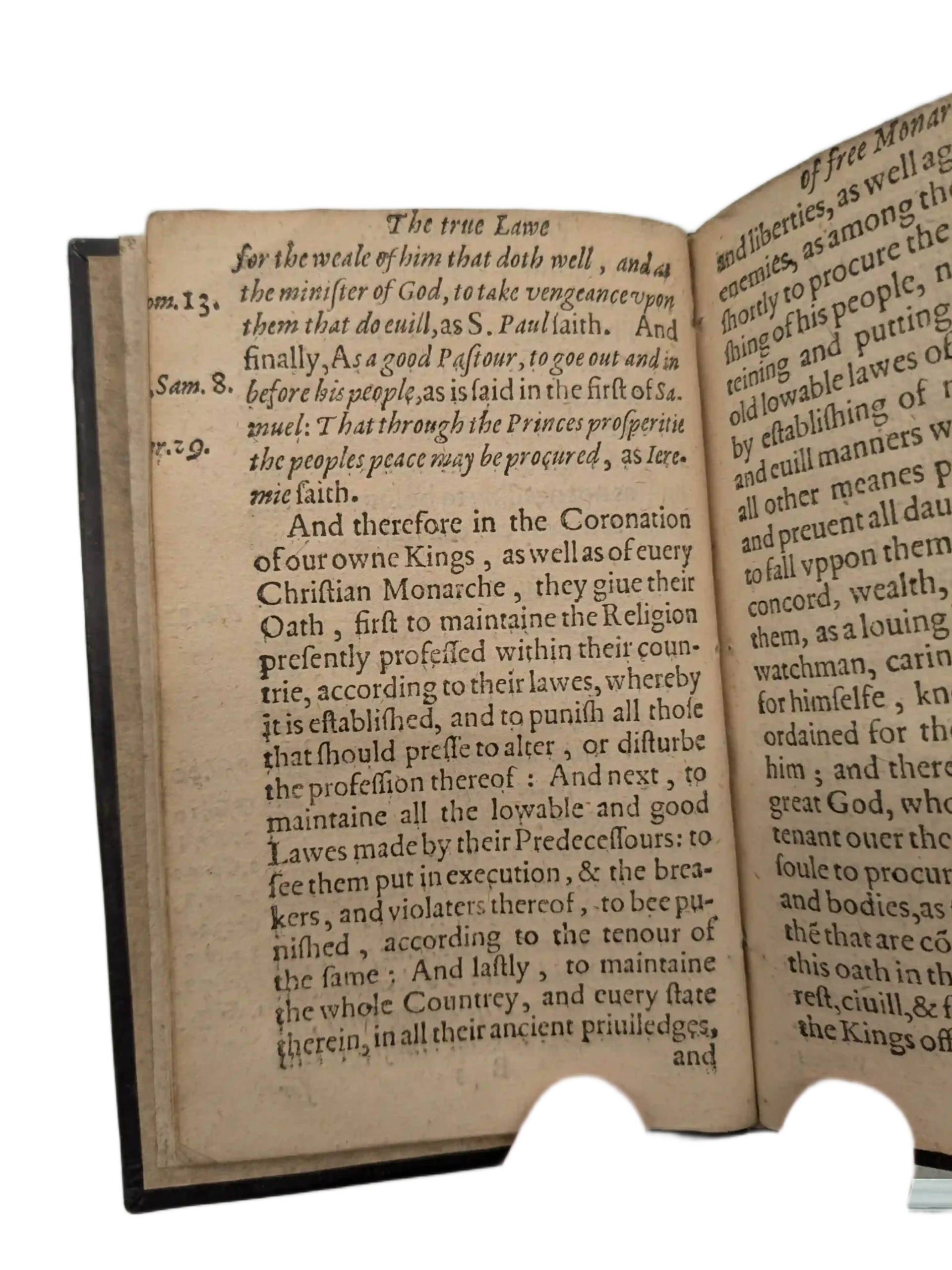
for the weale of him that doth well, and as
the minister of God, to take vengeance upon
them to do evill, as S. Paul saith 3Rom. 13.. And
finally, As a good Pastour, to goe out and in
before his people, as is said in the first of Sa
muel 41 Sam. 8..: That through the Princes prosperitie
the peoples peace may be procured, as Jere-
mie saith. 5Jer.29.
And therefore in the Coronation
of our owne Kings, as well as of every
Christian Monarche, they give their
Oath, first to maintaine the Religion
presently professed within their coun-
trie, according to their lawes, whereby
it is established, and to punish all those
that should presse to alter, or disturbe
the profession thereof : And next, to
maintaine all the lowable and good
Lawes made by their Predecessours: to
see them put in execution, & the brea-
kers, and violaters thereof, to bee pu-
nished, according to the tenour of
the same; And lastly, to maintaine
the whole Countrey, and every state
therein, in all their ancient priviledges,
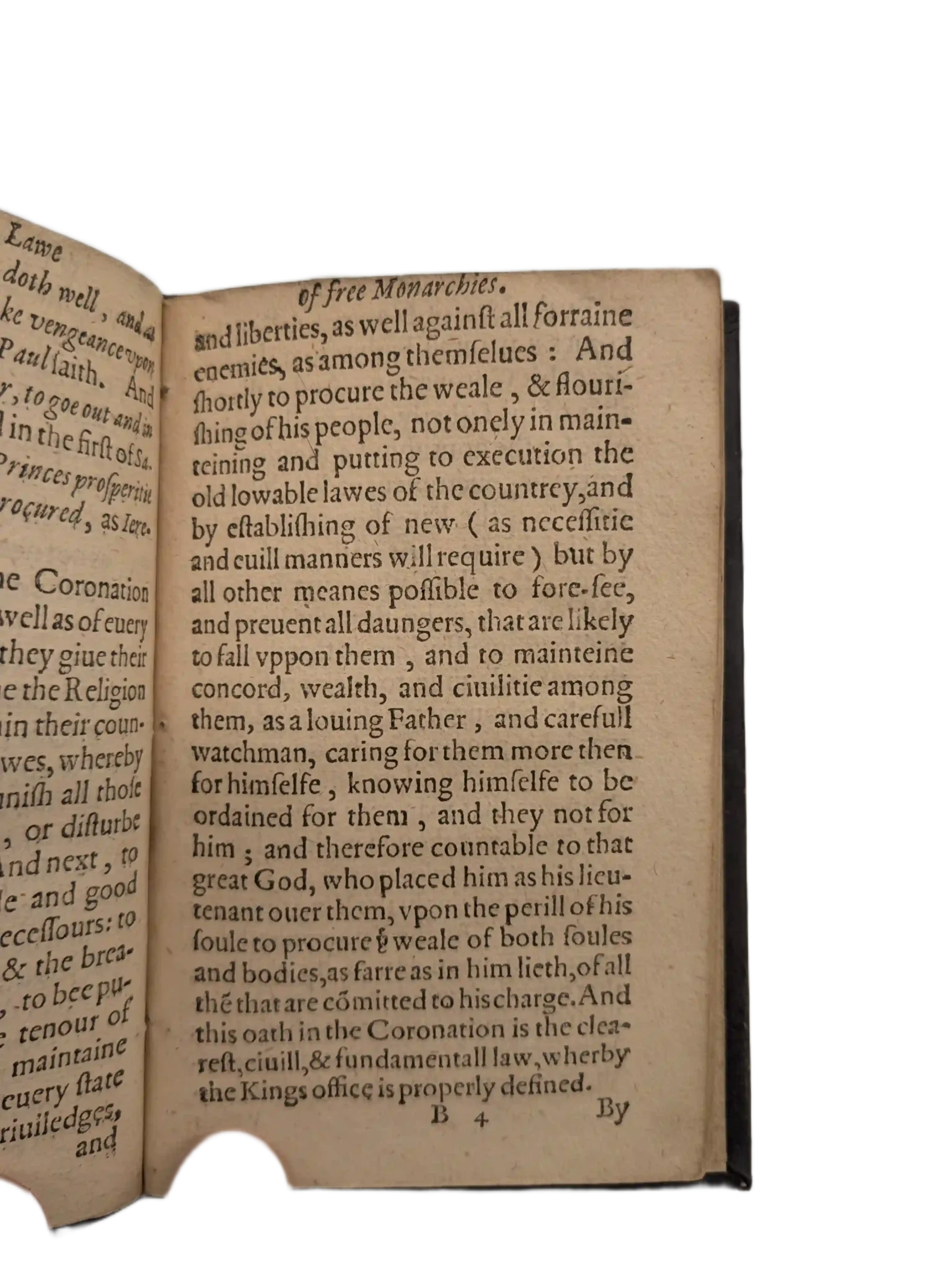
and liberties, as well against all forraine
enemies, as among themselves : And
shortly to procure the weale, & flouri-
shing of his people, not onely in main-
teining and putting to execution the
old lowable lawes of the countrey, and
by establishing of new ( as necessitie
and evill manners will require ) but by
all other meanes possible to fore-see,
and prevent all daungers, that are likely
to fall uppon them, and to mainteine
concord, wealth, and civilitie among
them, as a loving Father, and carefull
watchmen, caring for them more then
for himselfe, knowing himselfe to be
ordained for them, and they not for
him ; and therefore countable to that
great God, who placed him as his lieu-
tenant over them, upon the perill of his
soule to procure & weale of both soules
and bodies, as farre as in him lieth, of all
them that are commited to his charge. And
this oath in the Coronation is the clea-
rest, civill, & fundamentall law, wherby
the Kings office is properly defined.
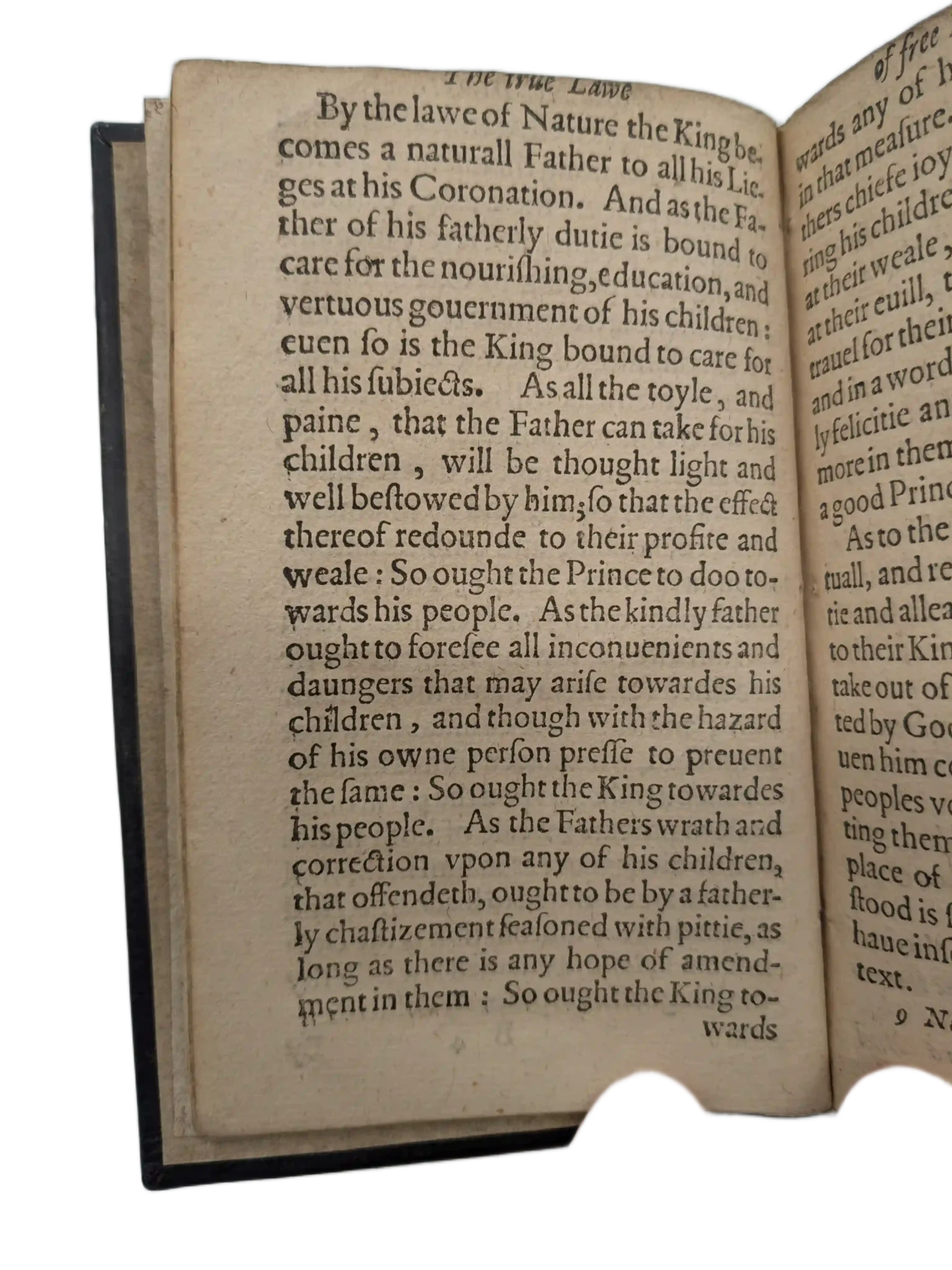
By the lawe of Nature the King be-
comes a naturall Father to all his Lie-
ges at his Coronation. And as the Fa-
ther of his fatherly dutie is bound to
care for the nourishing, education, and
vertuous government of his children :
even so is the King bound to care for
all his subjects. As all the toyle, and
paine , that the Father can take for his
children , will be thought light and
well bestowed by him; so that the effect
thereof redounde to their profite and
weale : So ought the Prince to doo to-
wards his people. As the kindly father
ought to foresee all inconvenients and
daungers that may arise towardes his
children , and though with the hazard
of his owne person presse to prevent
the same : So ought the King towardes
his people. As the Fathers wrath and
correction upon any of his children,
that offendeth, ought to be by a father-
ly chastizement seasoned with pittie, as
long as there is any hope of amend-
ment in them : So ought the King to-
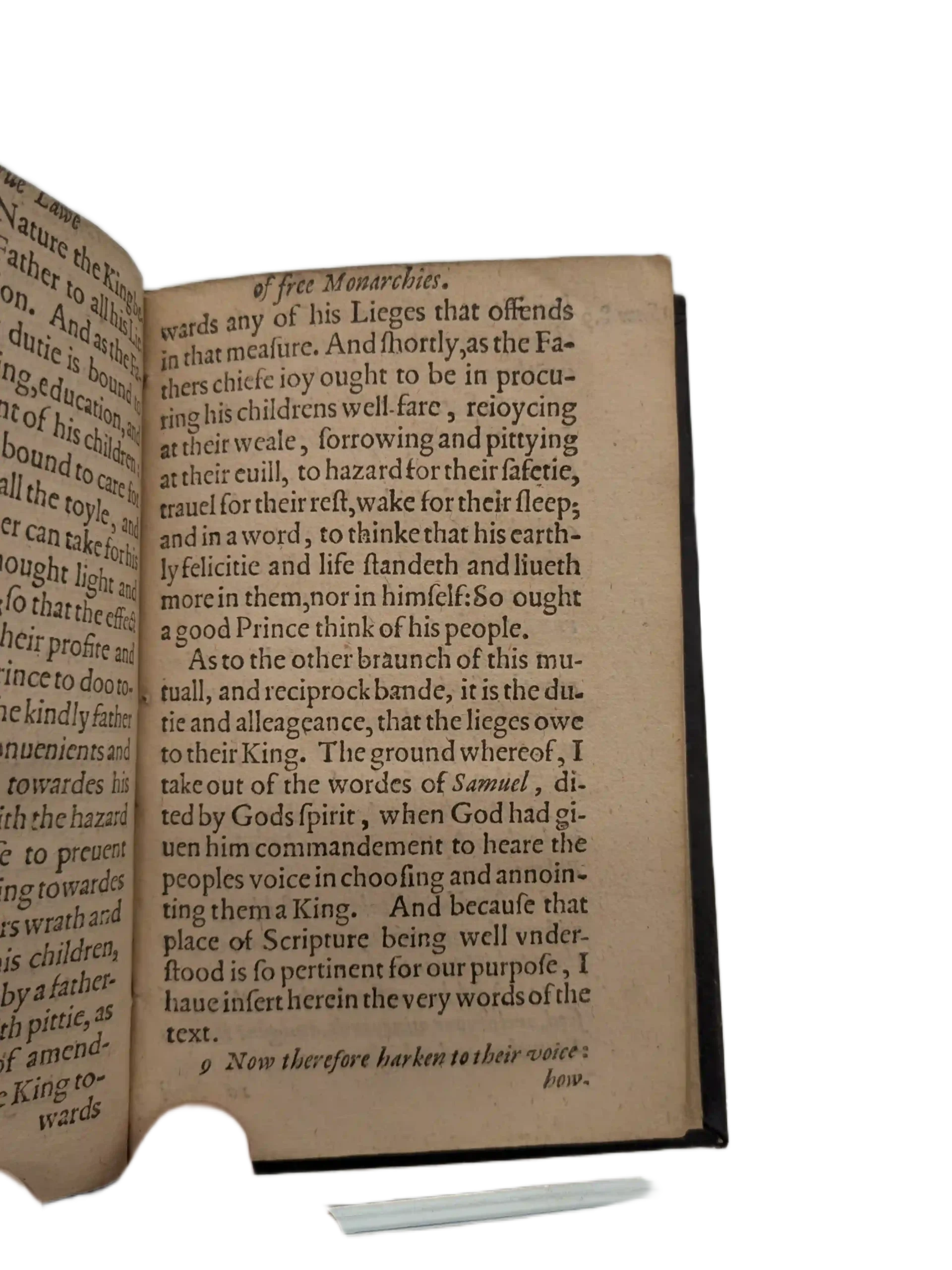
wards any of his Lieges that offends
in that measure. And shortly, as the Fa-
thers chiefe joy ought to be in procu-
ring his childrens well-fare, rejoycing
at their weale, sorrowing and pittying
at their evill, to hazard for their safetie,
travel for their rest, wake for their sleep;
and in a word, to thinke that his earth-
ly felicitie and life standeth and liveth
more in them, nor in himself: So ought
a good Prince think of his people.
As to the other braunch of this mu-
tuall, and reciprock bande, it is the du-
tie and alleageance, that the lieges owe
to their King. The ground whereof, I
take out of the wordes of Samuel, di-
ted by Gods spirit, when God had gi-
ven him commandement to heare the
peoples voice in choosing and annoin-
ting them a King. And because that
place of Scripture being well under-
stood is so pertinent for our purpose, I
have insert herein the very words of the
text.
9 Now therefore harken to their voice:
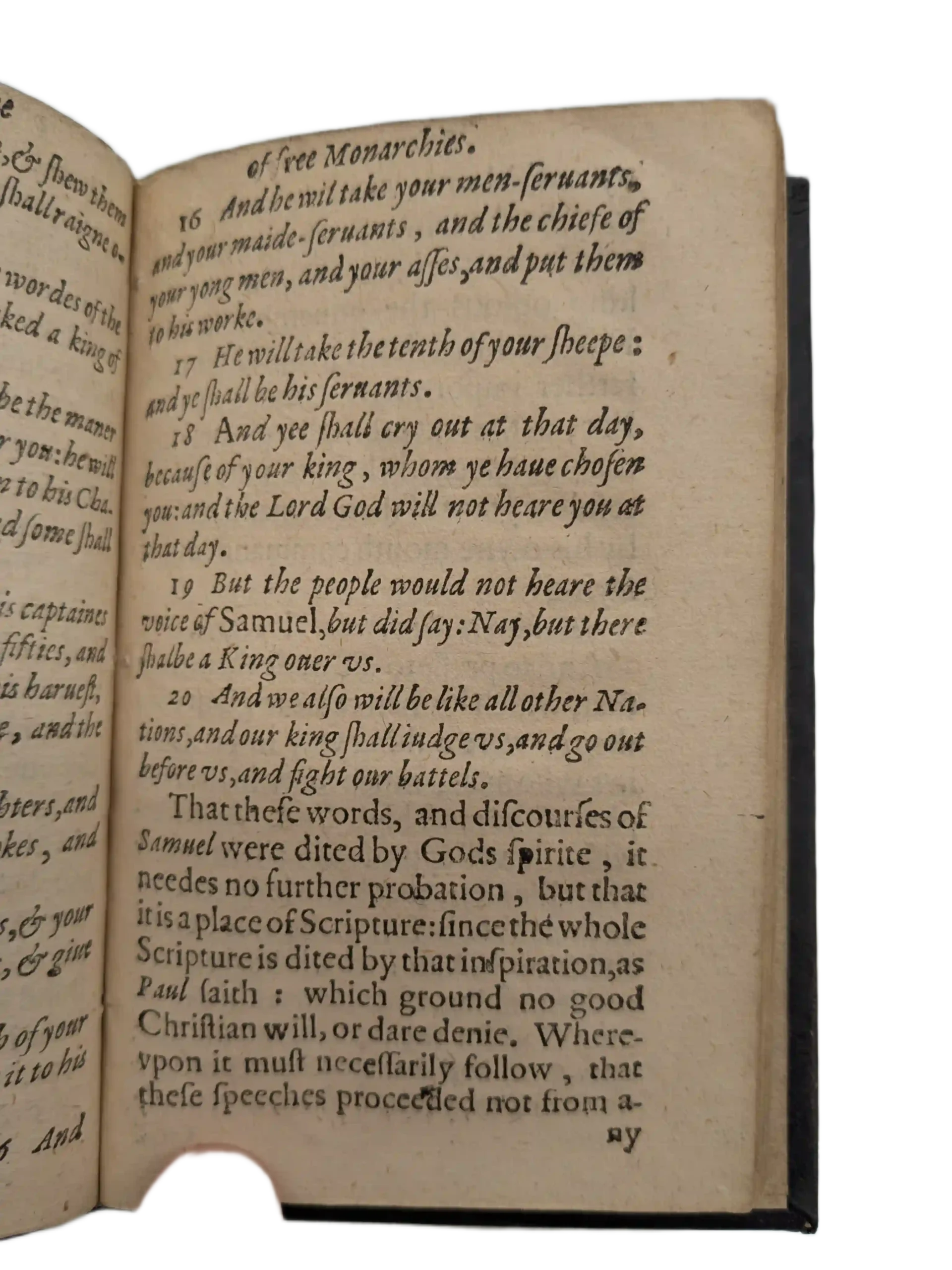
16 And he wil take your men-servants,
and your maide-servants, and the chiefe of
your yong men, and your asses, and put them
to his worke.
17 He will take the tenth of your sheepe:
and ye shall be his servants.
18 And yee shall cry out at that day,
because of your king, whom ye have chosen
you: and the Lord God will not heare you at
that day.
19 But the people would not heare the
voice of Samuel, but did say: Nay, but there
shalbe a King over us.
20 And we also will be like all other Na-
tions, and our king shall judge us, and go out
before us, and fight our battels.
That these words, and discourses of
Samuel were dited by Gods spirite, it
needes no further probation, but that
it is a place of Scripture: since the whole
Scripture is dited by that inspiration, as
Paul saith : which ground no good
Christian will, or dare denie. Where-
upon it must necessarily follow, that
these speeches proceeded not from a-
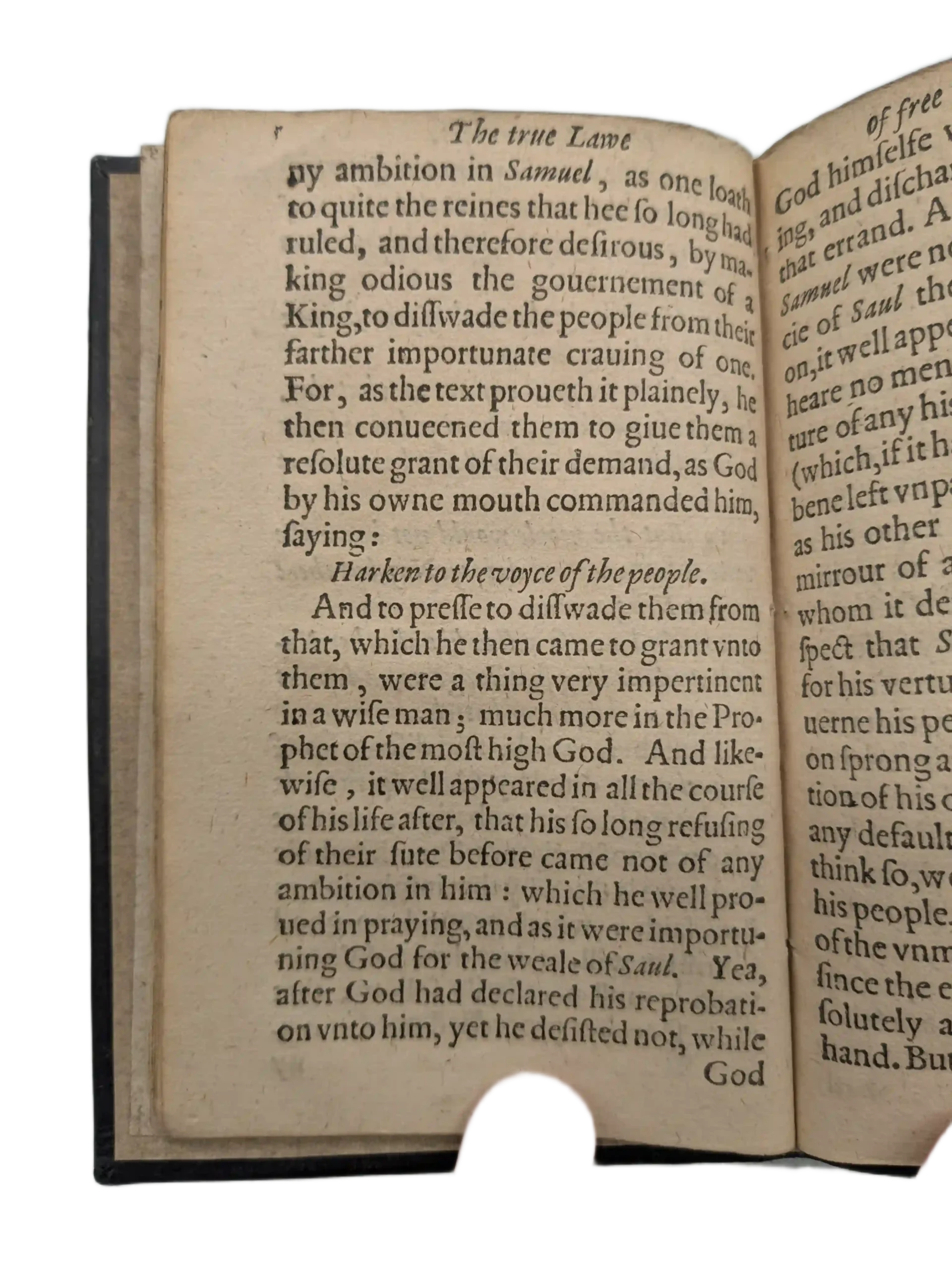
ny ambition in Samuel, as one loath
to quite the reines that hee so long had
rules, and therefore desirous, by ma-
king odious the governement of a
King, to disswade the people from their
farther importunate craving of one.
For, as the text proveth it plainely, he
then conveened them to give them a
resolute grant of their demand, as God
by his owne mouth commanded him,
saying:
Harken to the voyce of the people.
And to presse to disswade them from
that, which he then came to grant unto
them, were a thing very impertinent
in a wise man; much more in the Pro-
phet of the most high God. And like-
wise, it well appeared in all the course
of his life after, that his so long refusing
of their sute before came not of any
ambition in him : which he well pro-
ved in praying, and as it were importu-
ning God for the weale of Saul. Yea,
after God had declared his reprobati-
on unto him, yet he desisted not, while
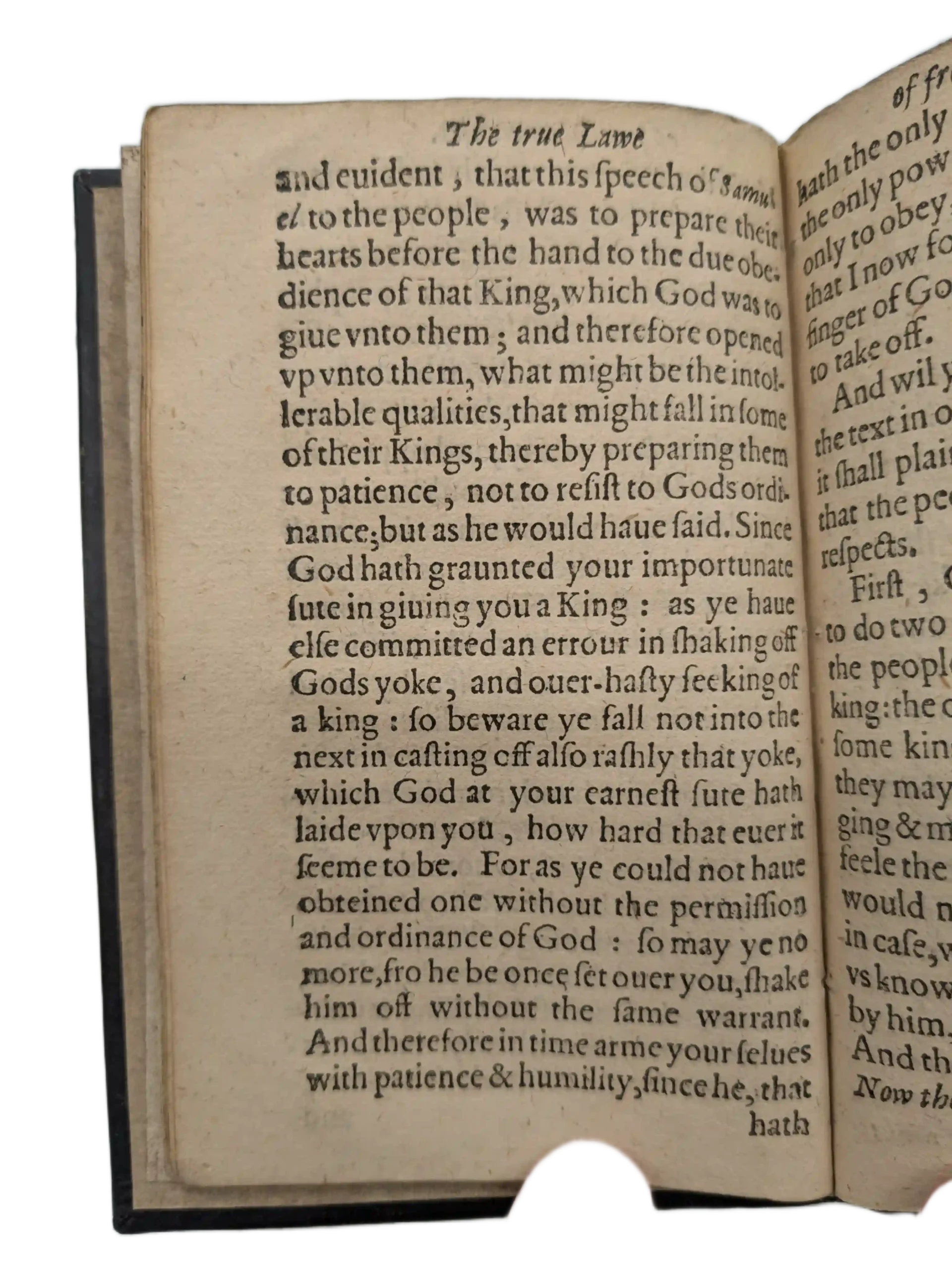
and evident, that this speech of Samu-
el to the people, was to prepare their
hearts before the hand to the due obe-
dience of that King, which God was to
give unto them; and therefore opened
up unto them, what might be the intol-
lerable qualities, that might fall in some
of their Kings, thereby preparing them
to patience, not to resist to Gods ordi-
nance; but as he would have said. Since
God hath graunted your importunate
sute in giving you a King : as ye have
else committed an errour in shaking off
Gods yoke, and over-hasty seeking of
a king : so beware ye fall not into the
next in casting off also rashly that yoke,
which God at your earnest sute hath
laide upon you, how hard that ever it
seeme to be. For as ye could not have
obteined one without the permission
and ordinance of God : so may ye no
more, fro he be once set over you, shake
him off without the same warrant.
And therefore in time arme your selves
with patience & humility, since he, that
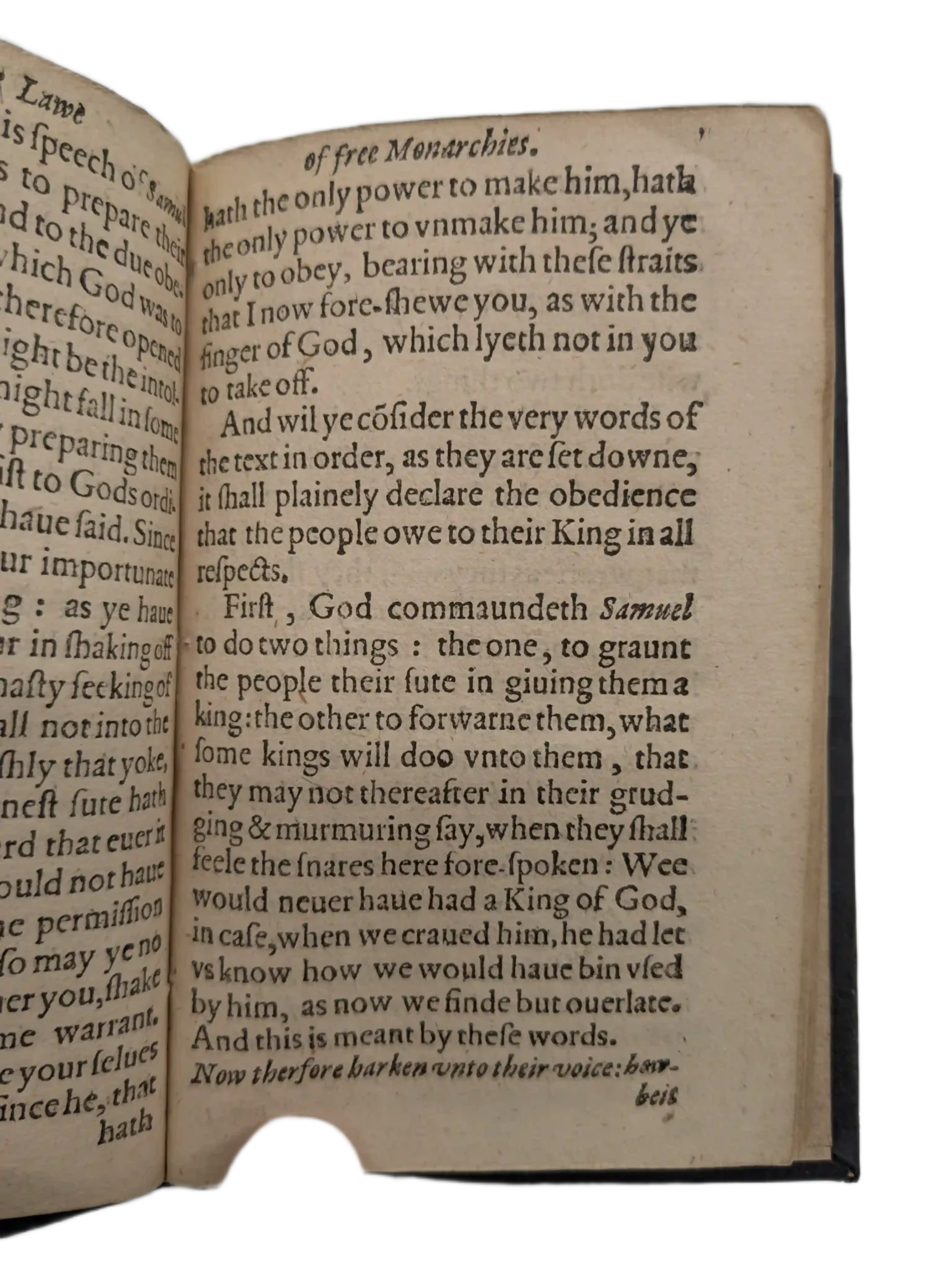
hath the only power to make him, hath
the only power to unmake him; and ye
only to obey, bearing with these straits
that I now fore-shewe you, as with the
finger of God, which lyeth not in you
to take off.
And wil ye consider the very words of
the text in order, as they are set downe,
it shall plainely declare the obedience
that the people owe to their King in all
respects.
First , God commaundeth Samuel
to do two things : the one, to graunt
the people their sute in giving them a
king: the other to forwarne them, what
some kings will doo unto them , that
they may not thereafter in their grud-
ging & murmuring say, when they shall
feele the snares here fore-spoken : Wee
would never have had a King of God,
in case, when we craved him, he had let
us know how we would have bin used
by him, as now we finde but overlate.
And this is meant by these words.
Now therefore barken unto their voice: how-
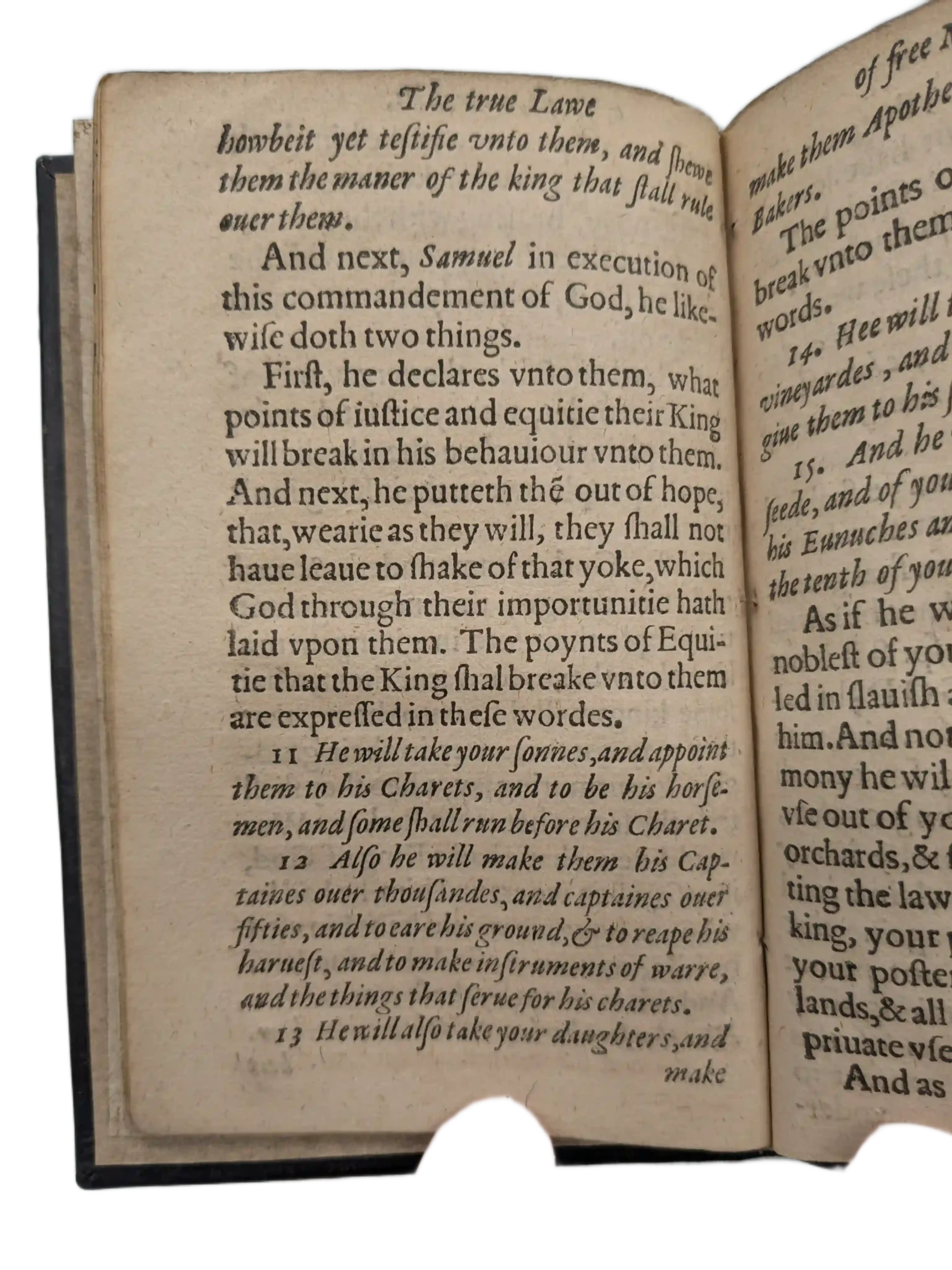
howbeit yet testifie unto them, and shewe
them the maner of the king that stall rule
over them.
And next, Samuel in execution of
this commandement of God, he like-
wise doth two things.
First, he declares unto them, what
points of justice and equitie their King
will break in his behaviour unto them.
And next, he putteth them out of hope,
that, wearie as they will, they shall not
have leave to shake of that yoke, which
God through their importunitie hath
laid upon them. The poynts of Equi-
tie that the King shal breake unto them
are expressed in these wordes.
11 He will take your sonnes, and appoint
them to his Charets, and to be his horse-
men, and some shall run before his Charet.
12 Also he will make them his Cap-
taines over thousands, and captaines over
fifties, and to care his ground, & to reape his
harvest, and to make instruments of warre,
and the things that serve for his charets.
13 He will also take your daughters, and
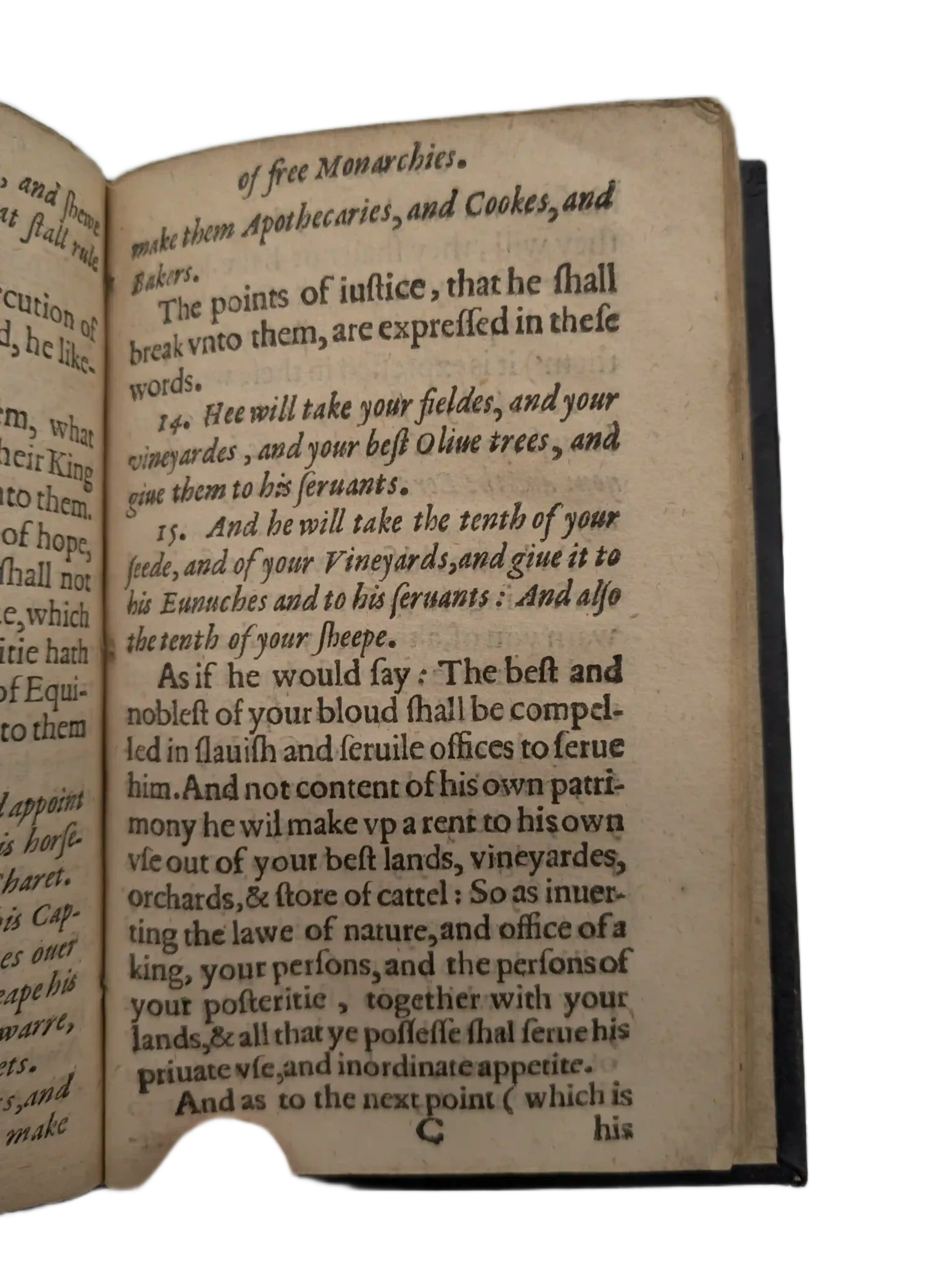
make them Apothecaries, and Cookes, and
Bakers.
The points of justice, that he shall
break unto them, are expressed in these
words.
14. Hee will take your fieldes, and your
vineyardes, and your best Olive trees, and
give them to his servants.
15. And he will take the tenth of your
seede, and of your Vineyards, and give it to
his Eunuches and to his servants: And also
the tenth of your sheepe.
As if he would say : The best and
noblest of your bloud shall be compel-
led in slavish and servile offices to serve
him. And not content of his own patri-
mony he wil make up a rent to his own
use out of your best lands, vineyardes,
orchards, & store of cattel : So as inver-
ting the lawe of nature, and office of a
king, your persons, and the persons of
your posteritie, together with your
lands, & all that ye possesse shal serve his
private use, and inordinate appetite.
And as to the next point (which is
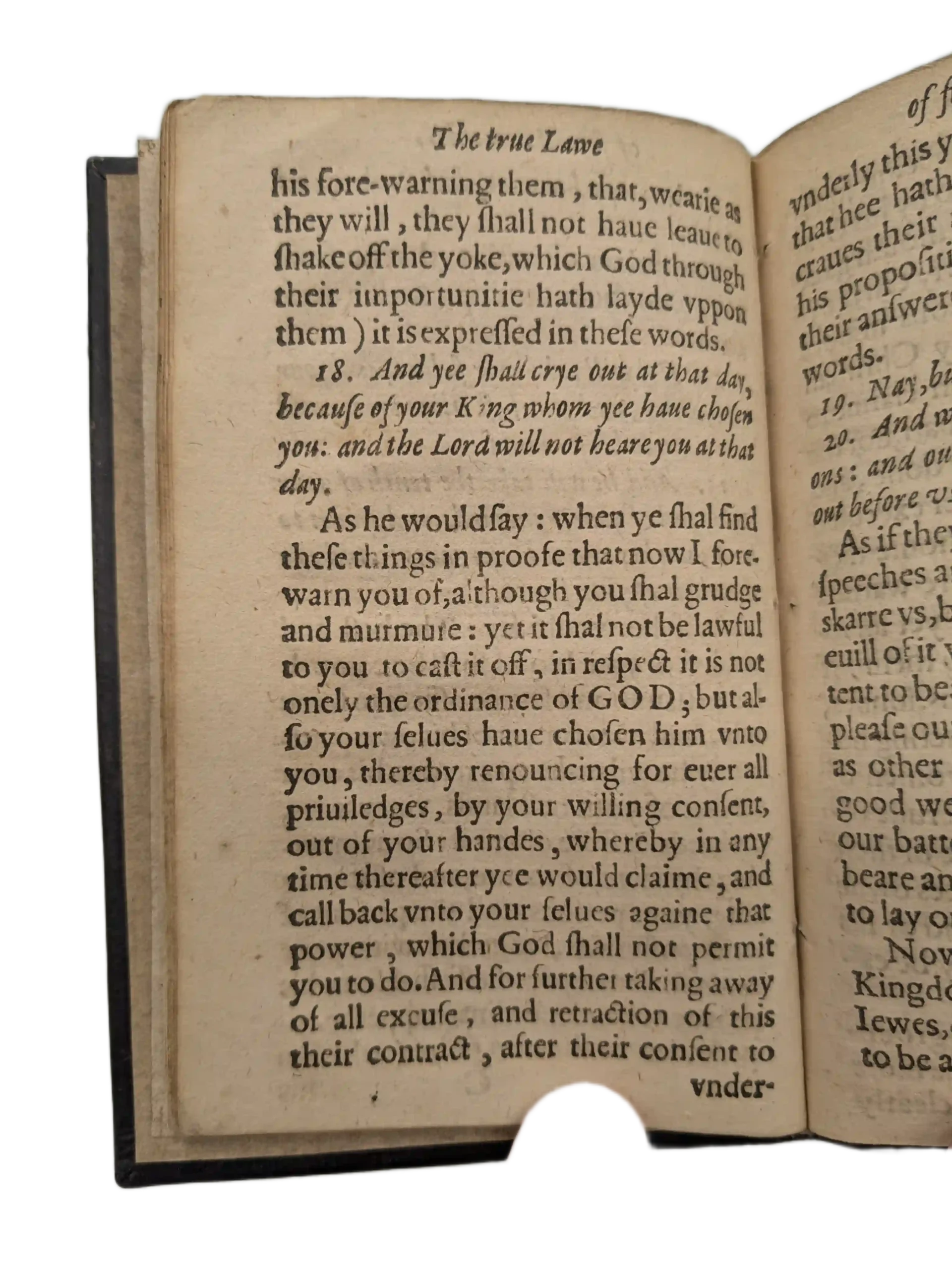
his fore-warning them, that, wearie as
they will, they shall not have leave to
shake off the yoke, which God through
their importunitie hath layde uppon
them ) it is expressed in these words.
18. And yee shall crye out at that day,
because of your King whom yee have chosen
you: and the Lord will not heare you at that
day.
As he would say : when ye shal find
these things in proofe that now I fore-
warn you of, although you shal grudge
and murmure: yet it shal not be lawful
to you to cast it off, in respect it is not
onely the ordinance of GOD; but al-
so your selves have chosen him unto
you, thereby renouncing for ever all
priviledges, by your willing consent,
out of your handes, whereby in any
time thereafter yee would claime, and
call back unto your selves againe that
power , which God shall not permit
you to do. And for further taking away
of all excuse, and retraction of this
their contract, after their consent to
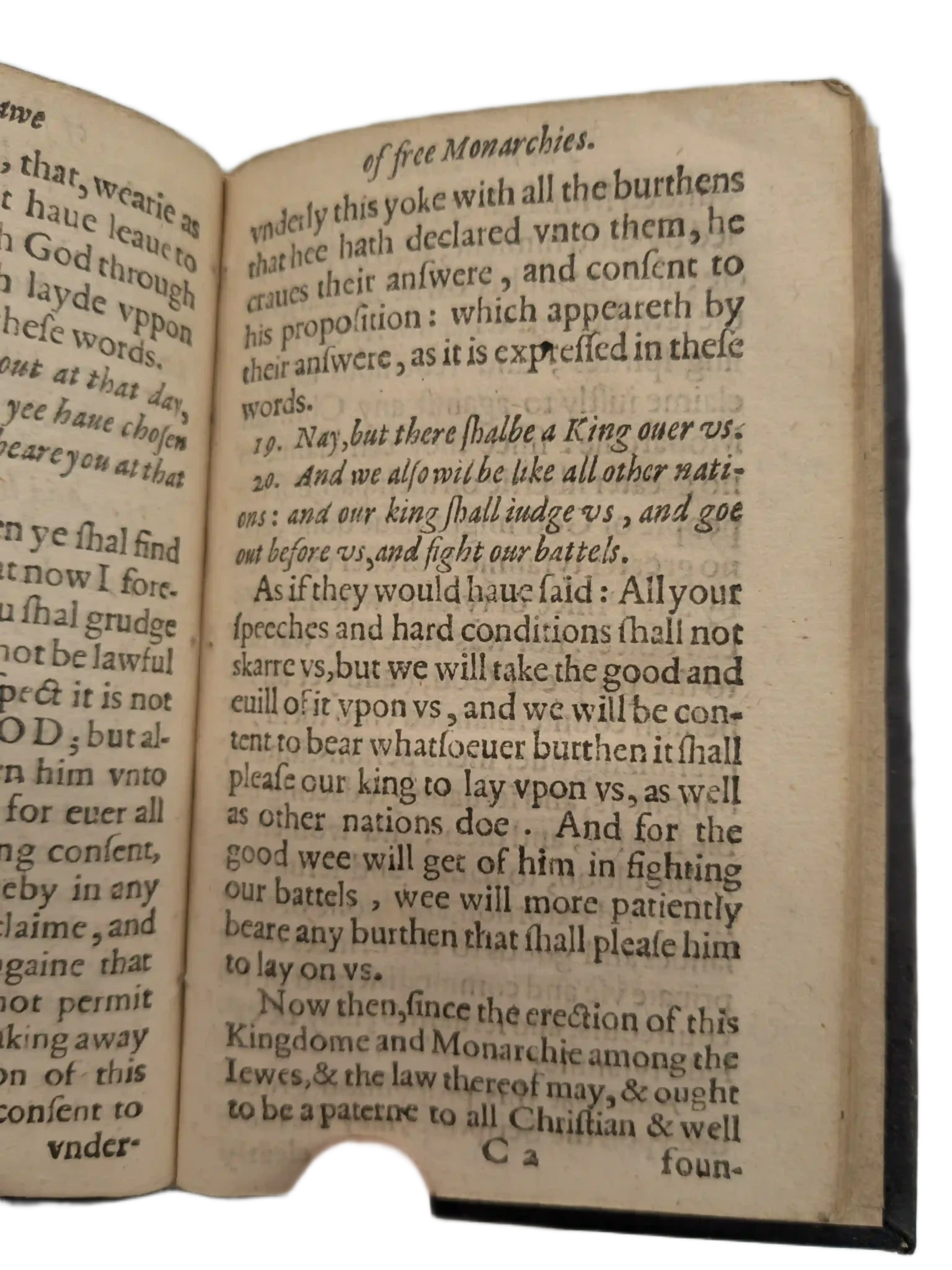
underly this yoke with all the burthens
that hee hath declared unto them, he
craves their answere , and consent to
his proposition: which appeareth by
their answere, as it is expressed in these
words.
19. Nay but there shalbe a King over us.
20. And we also wil be like all other nati-
ons: and our king shall judge us, and goe
out before us, and fight our battels.
As if they would have said: All your
speeches and hard conditions shall not
skarre us, but we will take the good and
evill of it upon us, and we will be con-
tent to bear whatsoever burthen it shall
please our king to lay upon us, as well
as other nations doe . And for the
good wee will get of him in fighting
our battels , wee will more patiently
beare any burthen that shall please him
to lay on us.
Now then, since the erection of this
Kingdome and Monarchie among the
Jewes, & law thereof may, & ought
to be a paterne to all Christian & well
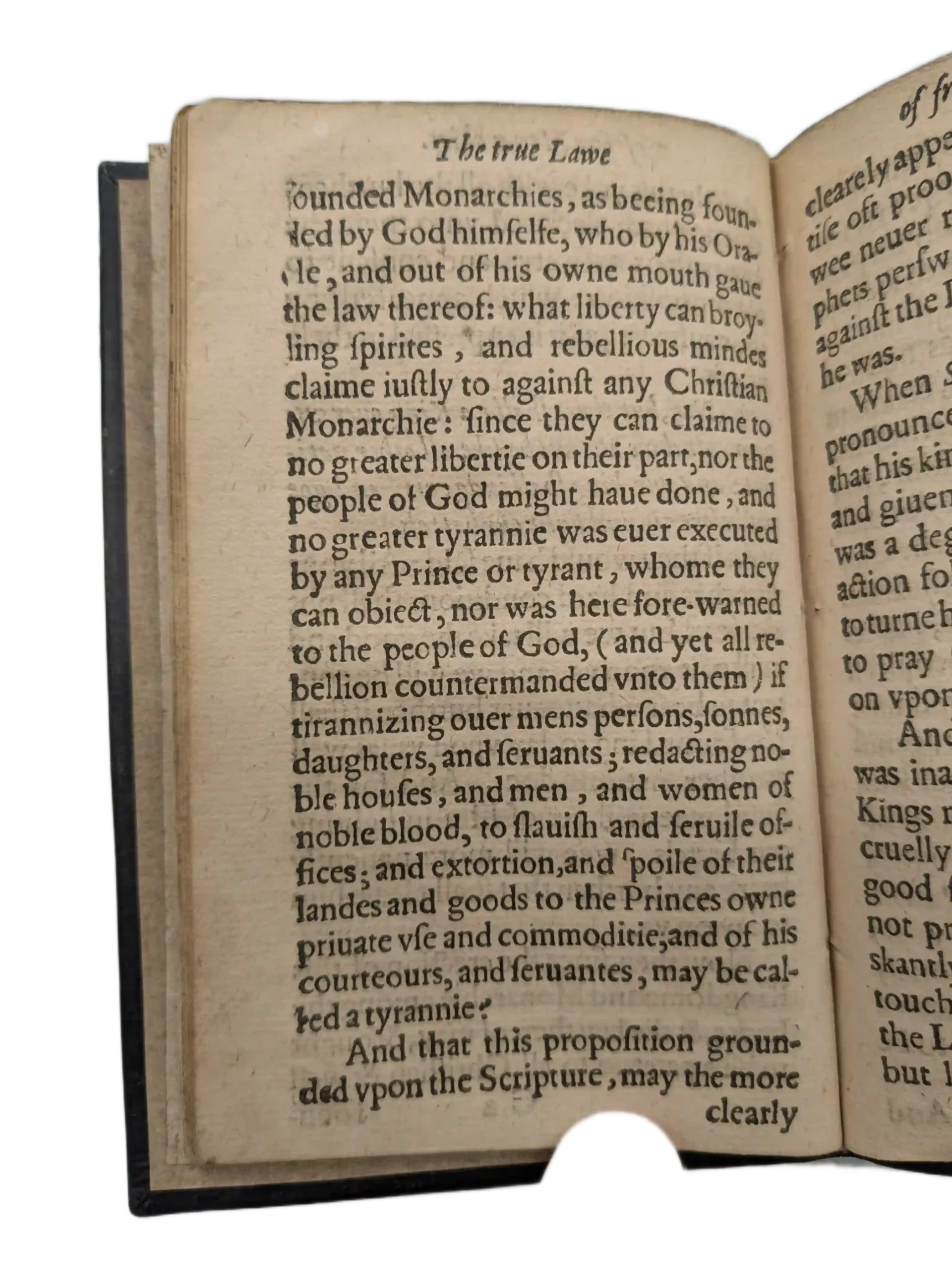
founded Monarchies, as beeing foun-
ded by God himselfe, who by his Ora-
cle, and out of his owne mouth gave
the law thereof: what liberty can broy-
ling spirites, and rebellious mindes
claime justly to against any Christian
Monarchie: since they can claime to
no greater libertie on their part, nor the
people of God might have done, and
no greater tyrannie was ever executed
by any Prince or tyrant, whome they
can object, nor was here fore-warned
to the people of God, ( and yet all re-
bellion countermanded unto them ) if
tirannizing over mens persons, sonnes,
daughters, and servants; redacting no-
ble houses, and men, and women of
noble blood, to slavish and servile of-
fices; and extortion, and spoile of their
landes and goods to the Princes owne
private use and commoditie, and of his
courteours, and servantes, may be cal-
led a tyrannie?
And that this proposition groun-
ded upon the Scripture, may the more
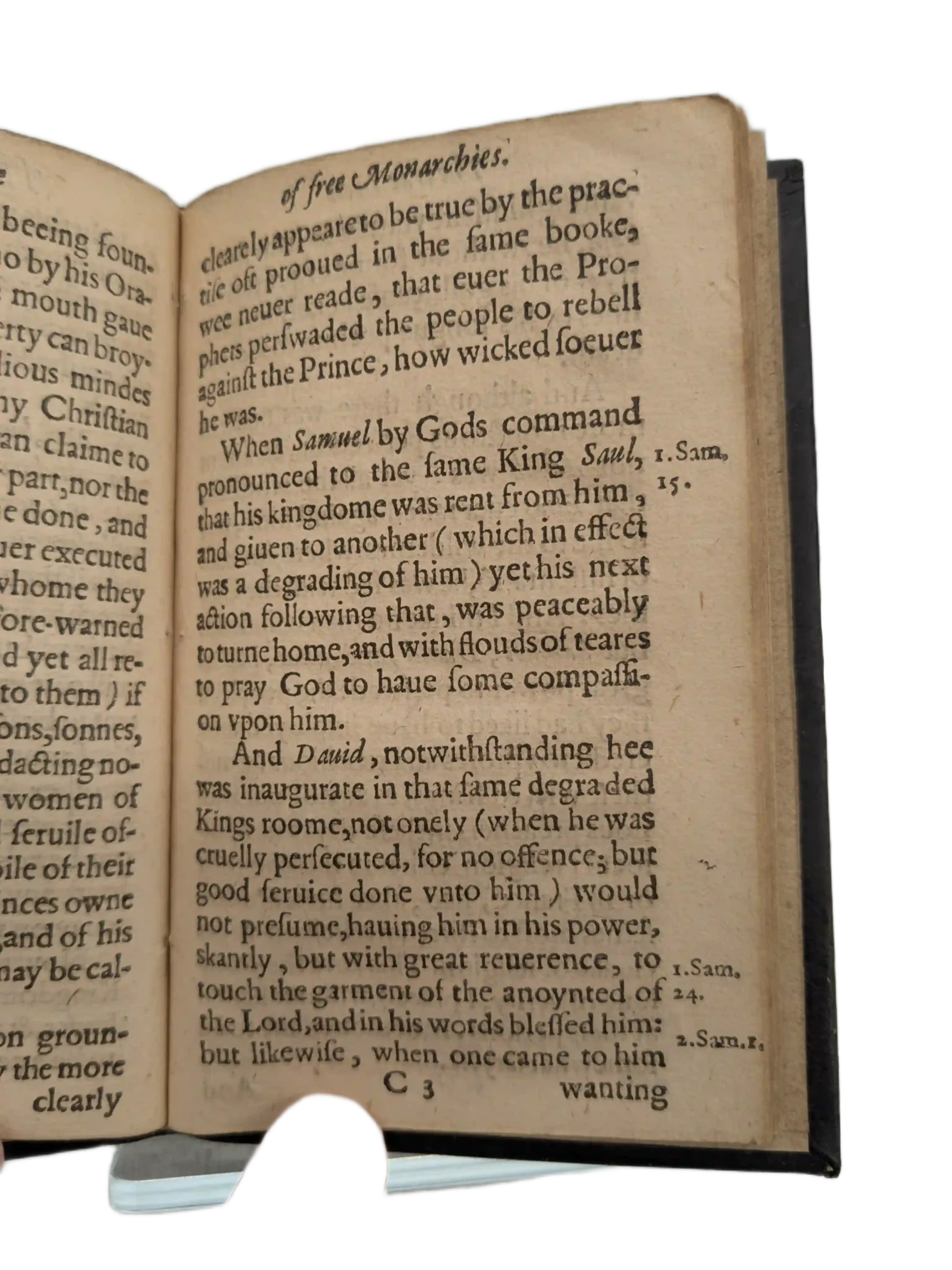
clearely appeare to be true by the prac-
tice oft prooved in the same booke,
wee never reade, that ever the Pro-
phets perswaded the people to rebell
against the Prince, wicked soever
he was.
When Samuel by Gods command
pronounced to the same King Saul, {I. Sam, 15.}
that his kingdome was rent from him,
and given to another ( which in effect
was a degrading of him ) yet his next
action following that, was peaceably
to turne home, and with flouds of teares
to pray God to have some compassi-
on upon him.
And David, notwithstanding hee
was inaugurate in the same degraded
Kings roome, not onely (when he was
cruelly persecuted, for no offence; but
good service done unto him ) would
not presume, having him in his power,
skantly, but with great reverence, to {1. Sam. 24.}
touch the garment of the anoynted of
the Lord, and in his words blessed him: {2. Sam. 1.}
but likewise, when one came to him
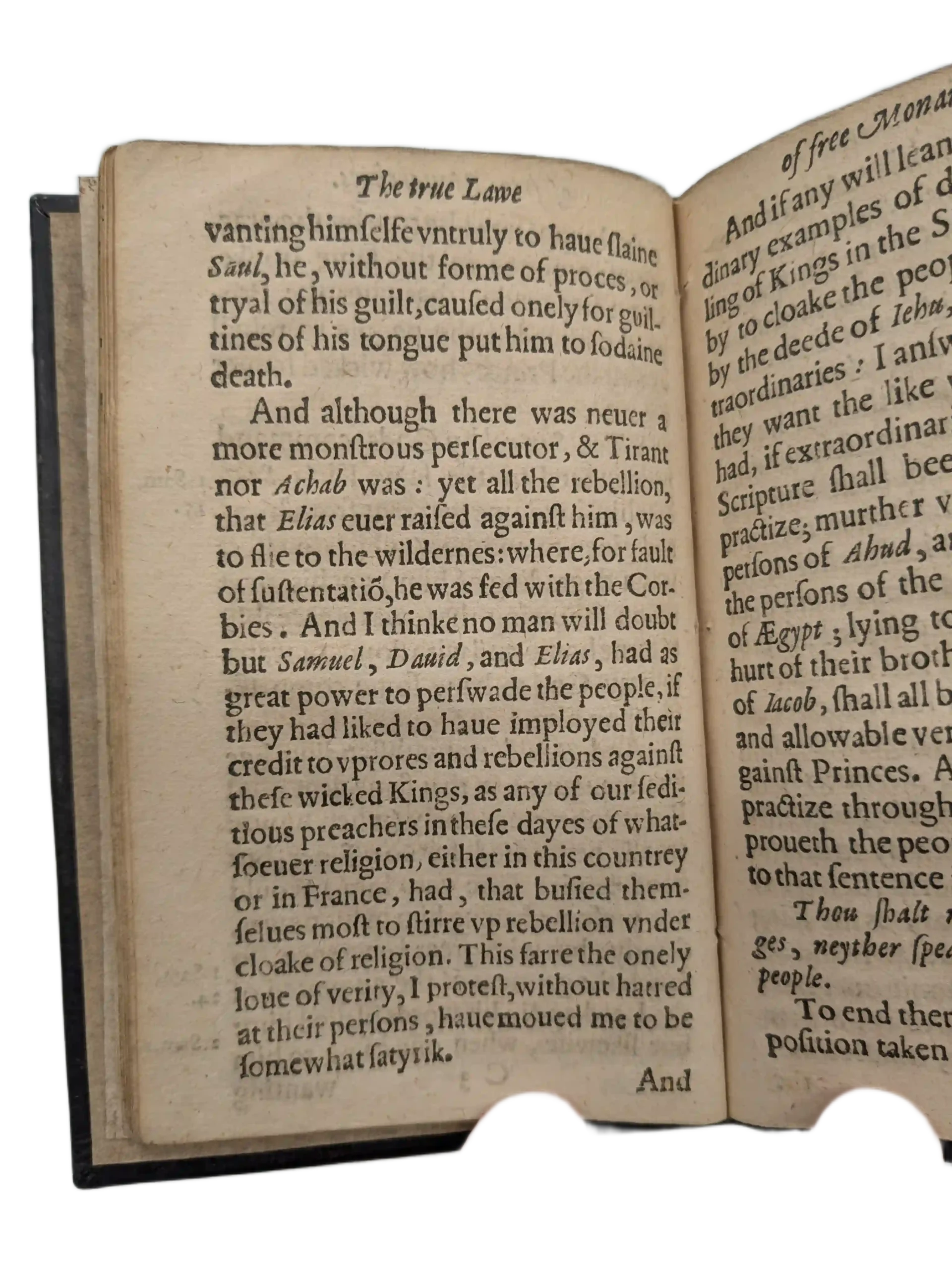
wanting himselfe untruly to have slaine
Saul, he, without forme of proces, or
tryal of his guilt, caused onely for guil-
tines of his tongue put him to sodaine
death.
And although there were never a
more monstrous persecutor, & Tirant
nor Achab was : yet all the rebellion,
that Elias ever raised against him, was
to flie to the wilderness: where, for fault
of sustentation, he was fed with the Cor-
bies. And I thinke no man will doubt
but Samuel, David, and Elias, had as
great power to perswade the people, if
they had liked to have imployed their
credit to uprores and rebellions against
these wicked Kings, as any of our sedi-
tious preachers in these dayes of what-
soever religion, either in this countrey
or in France, had, that busied them-
selves most to stirre up rebellion under
cloake of religion. This farre the onely
love of verity, I protect, without hatred
at their persons, have moved me to be
somewhat satyrik.
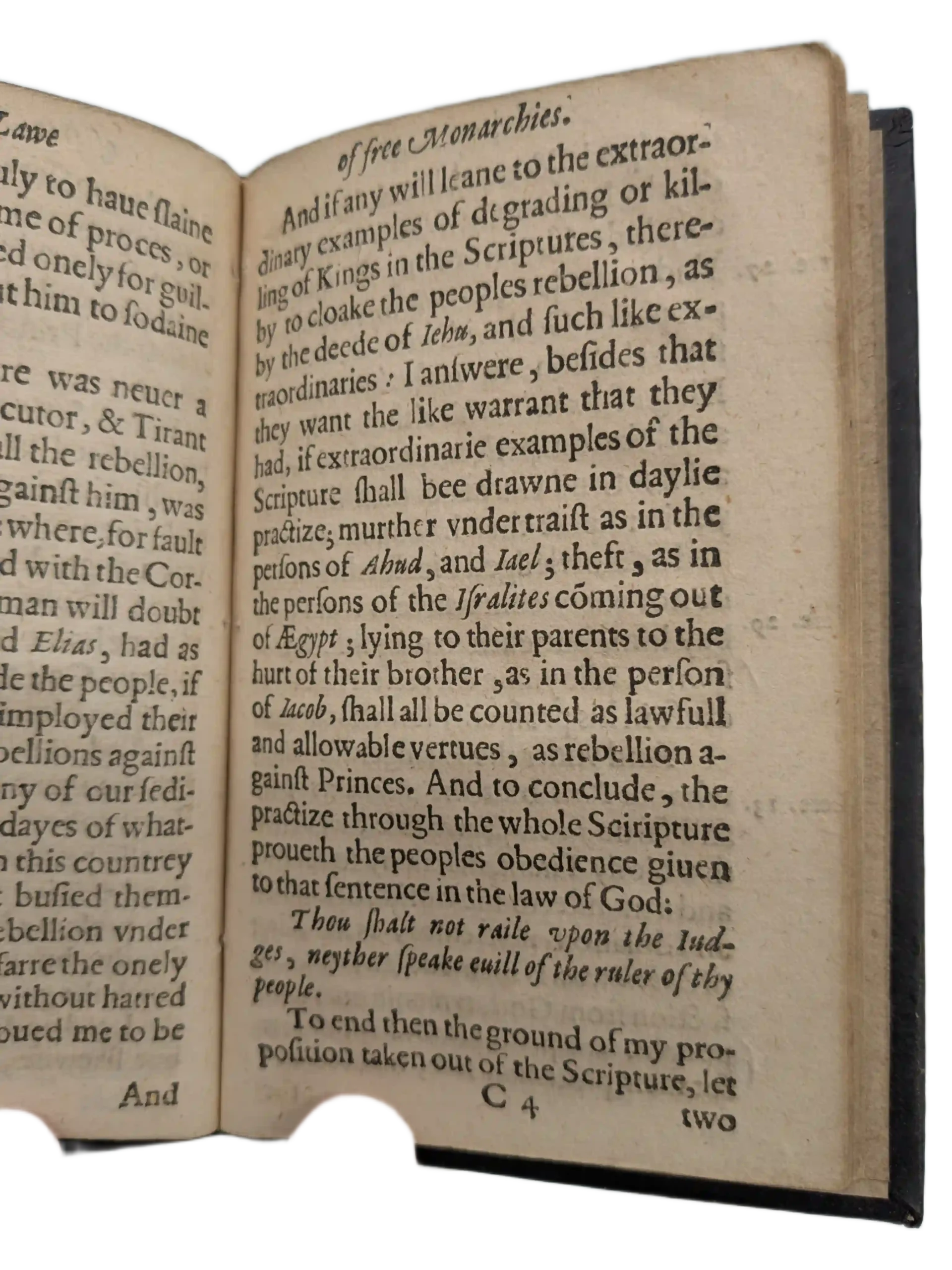
And if any will leane to the extraor-
dinary examples of degrading or kil-
ling of Kings in the Scriptures, there-
by to cloake the peoples rebellion, as
by the deede of Jehu, and such like ex-
traordinaries : I answere , besides that
they want the like warrant that they
had, if extraordinarie examples of the
Scripture shall bee drawne in daylie
practize; murther under traist as in the
persons of Ahud,and Jael; theft, as in
the persons of the Isralites coming out
of Ægypt; lying to their parents to the
hurt of their brother , as in the person
of Jacob, shall all be counted as lawfull
and allowable vertues, as rebellion a-
gainst Princes. And to conclude, the
practize through the whole Sciripture
proveth the peoples obedience given
to that sentence in the law of God:
Thou shalt not raile upon the Jud-
ges, neyther speake evill of the ruler of thy
people.
To end then the ground of my pro-
position taken out of the Scripture, let
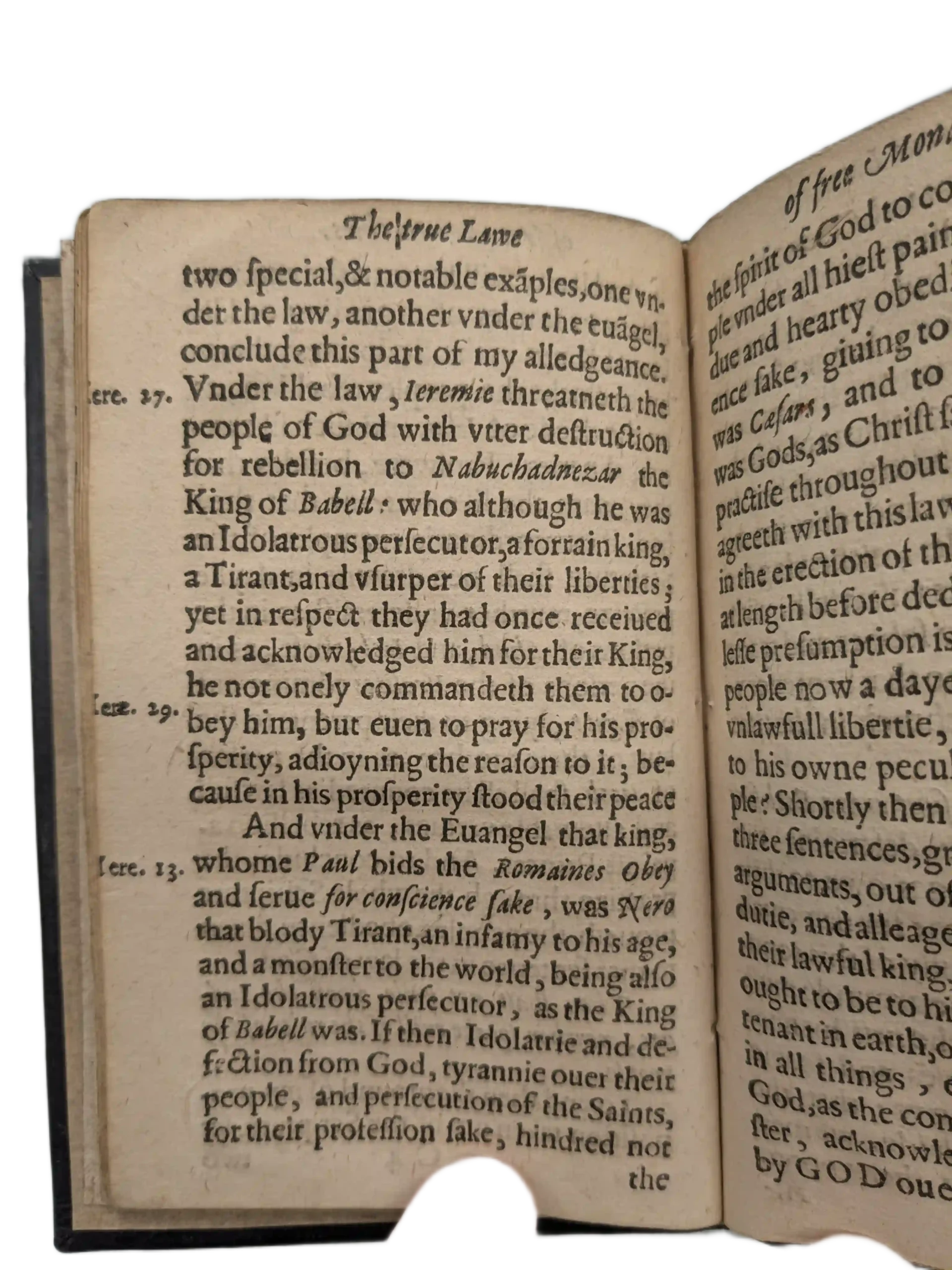
two special, & notable examples, one un-
der the law, another under the evangel,
conclude this part of my alledgeance.
{Jere. 27.} Under the law, Jeremie threatneth the
people of God with utter destruction
for rebellion to Nabuchadnezar the
King of Babell : who although he was
an Idolatrous persecutor, a forrain king,
a Tirant, and usurper of their liberties ;
yet in respect they had once received
and acknowledged him for their King,
he not onely commandeth them to o-
{Jere. 29.} bey him, but even to pray for his pro-
sperity, adjoyning the reason to it; he-
cause in his prosperity stood their peace
And under the Evangel that king,
{Jere. 13.} whome Paul bids the Romaines Obey
and serve for conscience sake, was Nero
that blody Tirant, an infamy to his age,
and a monster to the world, being also
an Idolatrous persecutor, as the King
of Babell was. If then Idolatrie and de-
fection from God, tyrannie over their
people, and persecution of the Saints,
for their profession sake, hindred not
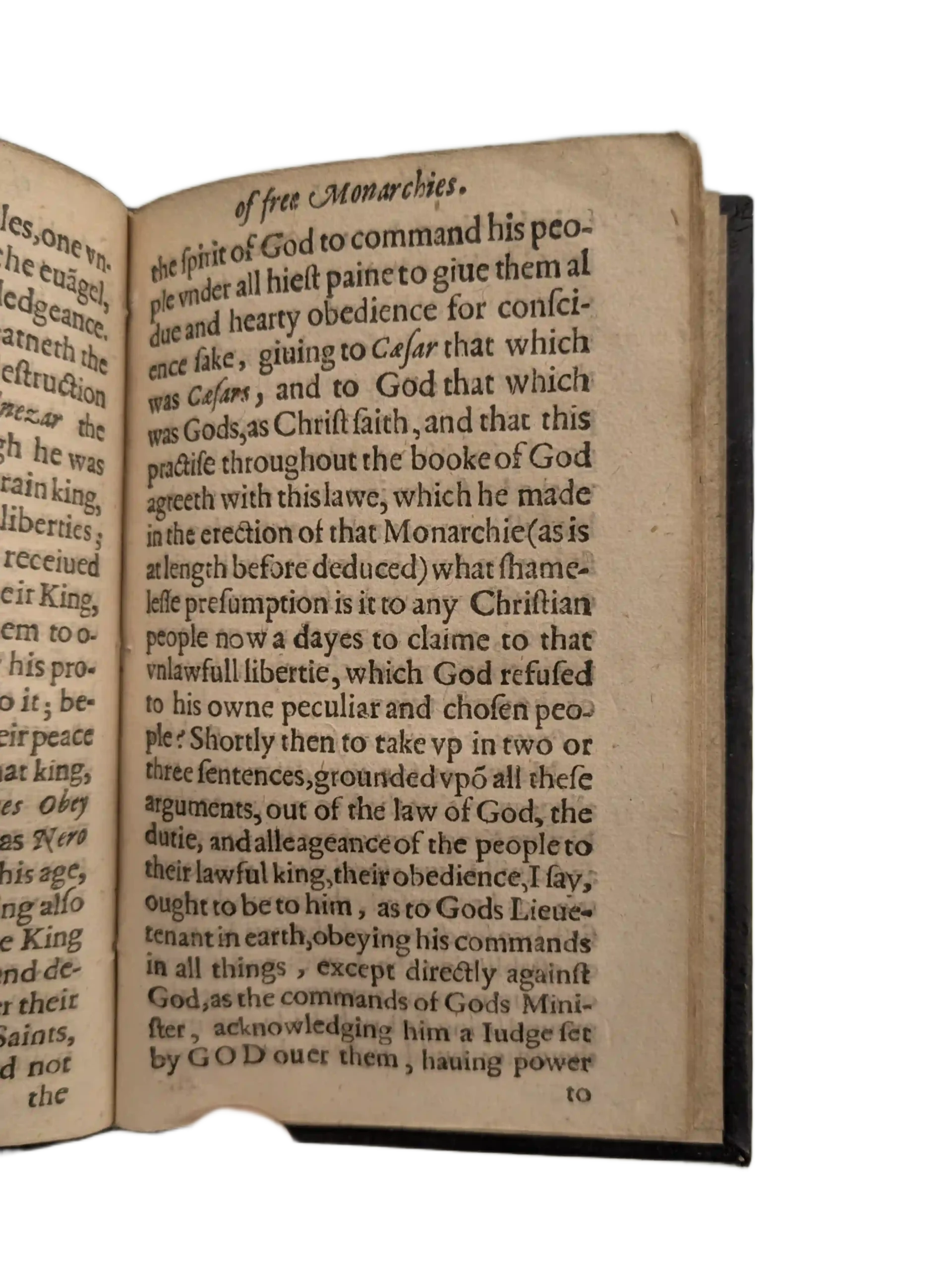
the spirit of God to command his peo-
ple under all hiest paine to give them al
due and hearty obedience for consci-
ence sake, giving to Cæsar that which
was Cæsars, and to God that which
was Gods, as Christ saith, and that this
practise throughout the booke of God
agreeth with this lawe, which he made
in the erection of that Monarchie (as is
at length before deduced) what shame-
lesse presumption is it to any Christian
people now a dayes to claime to that
unlawfull libertie, which God refused
to his owne peculiar and chosen peo-
ple. Shortly then to take up in two or
three sentences, grounded upon all these
arguments, out of the law of God, the
dutie, and alleageance of the people to
their lawful king, their obedience, I say,
ought to be to him, as to Gods Lieue-
tenant in earth, obeying his commands
in all things, except directly against
God, as the commands of Gods Mini-
ster, acknowledging him a Judge set
by GOD over them, having power
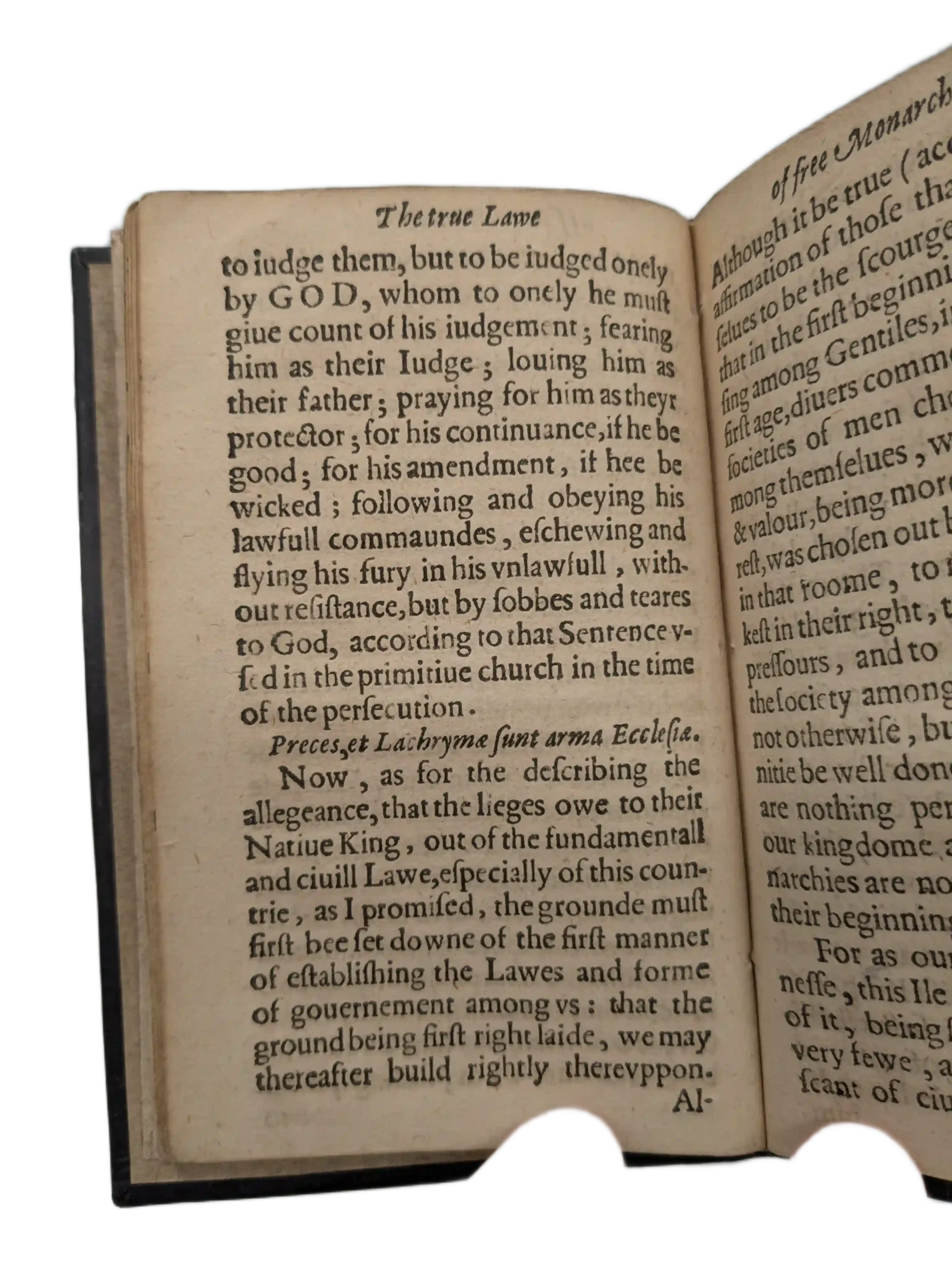
to judge them, but to be judged onely
by GOD, whom to onely he must
give count of his judgement; fearing
him as their Judge; loving him as
their father; praying for him as theyr
protector; for his continuance, if he be
good; for his amendment, if hee be
wicked; following and obeying his
lawfull commaundes, eschewing and
flying his fury in his unlawfull, with-
out resistance, but by sobbes and teares
to God, according to that Sentence u-
sed in the primitive church in the time
of the persecution.
Preces, et Lachymæ sunt arma Ecclesiæ.
Now, as for the describing the
allegeance, that the lieges owe to their
Native King, out of the fundamentall
and civill Lawe, especially of this coun-
trie, as I promised, the grounde must
first bee set downe of the first manner
of establishing the Lawes and forme
of governement among us : that the
ground being first right laide, we may
thereafter build rightly thereuppon.
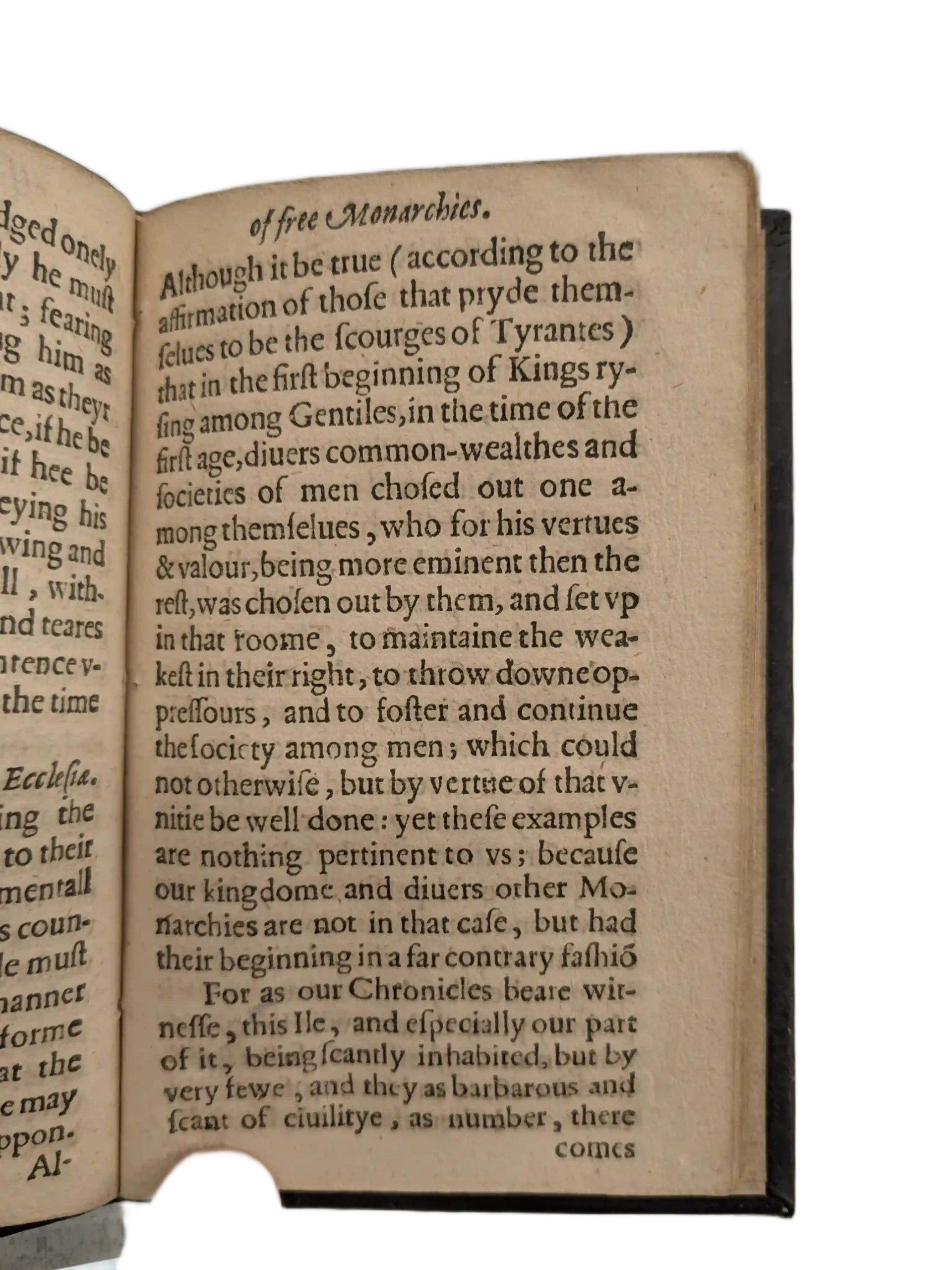
Although it be true (according to the
affirmation of those that pryde them-
selves to be the scourges of Tyrantes )
that in the first beginning of Kings ry-
sing among Gentiles, in the time of the
first age, divers common-wealthes and
societies of men chosed out one a-
mong themselves, who for his vertues
& valour, being more eminent then the
rest, was chosen out by them, and set up
in that roome, to maintaine the wea-
kest in their right, to throw downe op-
pressours, and to foster and continue
the society among men ; which could
not otherwise, but by vertue of that u-
nitie be well done: yet these examples
are nothing pertinent to us ; because
our kingdome and divers other Mo-
narchies are not in that case, but had
their beginning in a far contrary fashion
For as our Chronicles beare wit-
nesse, this Ile, and especially our part
of it, being scantly inhabited, but by
very fewe, and they as barbarous and
scant of civilitye, as number, there
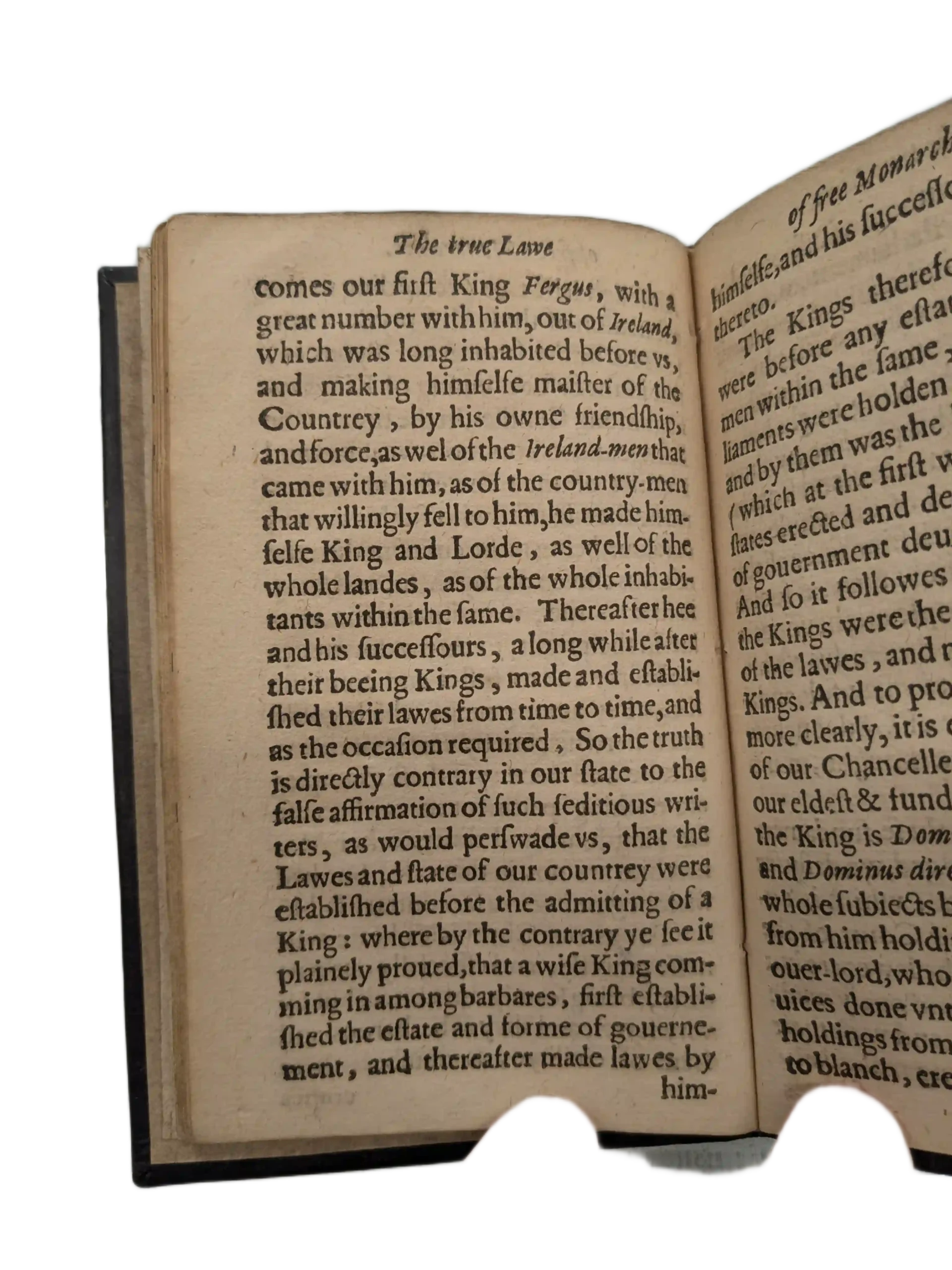
comes our first King Fergus, with a
great number with him, our of Ireland,
which was long inhabited before us,
and making himselfe maister of the
Countrey, by his owne friendship,
and force, as wel of the Ireland-men that
came with him, as of the country-men
that willingly fell to him, he made him-
selfe King and Lorde, as well of the
whole landes, as the whole inhabi-
tants within the same. Thereafter hee
and his successours, a long while after
their beeing Kings, made and establi-
shed their lawes from time to time, and
as the occasion required. So the truth
is directly contrary in our state to the
false affirmation of such seditious wri-
ters, as would perswade us, that the
Lawes and state of our countrey were
established before the admitting of a
King: where by the contrary ye see it
plainely proved, that a wise King com-
ming in among barbares, first establi-
shed the estate and forme of governe-
ment, and thereafter made lawes by
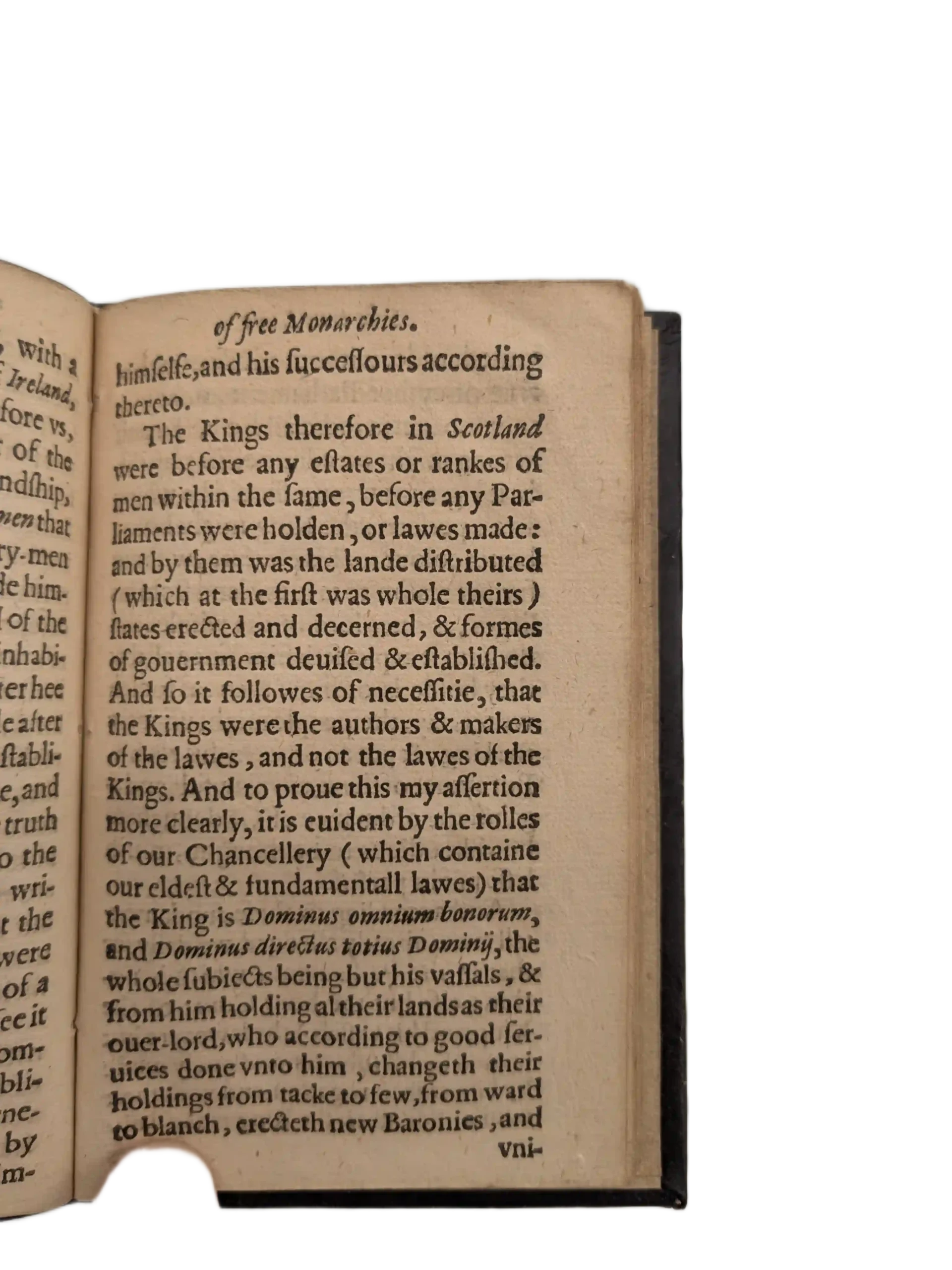
himselfe, and his successours according
thereto.
The Kings therefore in Scotland
were before any estates or rankes of
men within the same, before any Par-
liaments were holden, or lawes made:
and by them was the lande distributed
( which at the first was whole theirs )
states erected and decerned, & formes
of government devised & established.
And so it followes of necessitie, that
the Kings were the authors & makers
of the lawes, and not the lawes of the
Kings. And to prove this my assertion
more clearly, it is evident by the rolles
of our Chancellery (which containe
our eldest & fundamentall lawes) that
the King is Dominus omnium bonorum,
and Dominus directus totius Dominij, the
whole subjects being but his vassals, &
from him holding al their lands as their
over-lord, who according to good ser-
vices done unto him, changeth their
holdings from tacke to few, from ward
to blanch, erecteth new Baronies, and
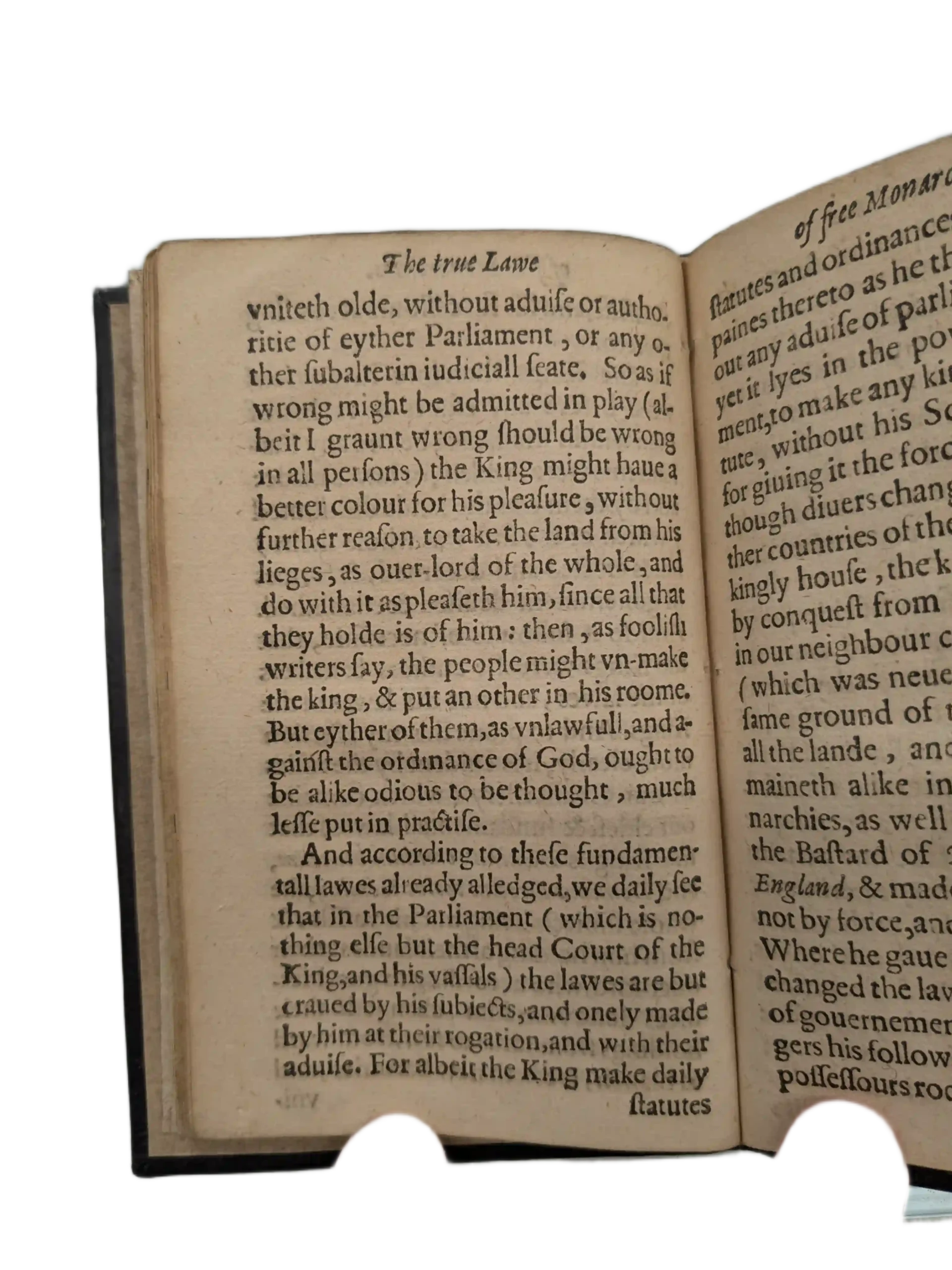
uniteth olde, without advise or autho-
ritie of eyther Parliament, or any o-
ther subalterin judiciall seate. So as if
wrong might be admitted in play ( al-
beit I graunt wrong should be wrong
in all persons ) the King might have a
better colour for his pleasure, without
further reason to take the land from his
lieges, as over-lord of the whole, and
do with it as pleaseth him, as foolish
writers say, the people might un-make
the king, & put an other in his roome.
But eyther of them, as unlawfull, and a-
gainst the ordinance of God, ought to
be alike odious to be thought, much
lesse put in practice.
And according to these fundamen-
tall lawes already alledged, we daily see
that in the Parliament (which is no-
thing else but the head Court of the
King, and his vassals) the lawes are but
craved by his subjects, and onely made
by him at their rogation, and with their
advise. For albeit the King make daily
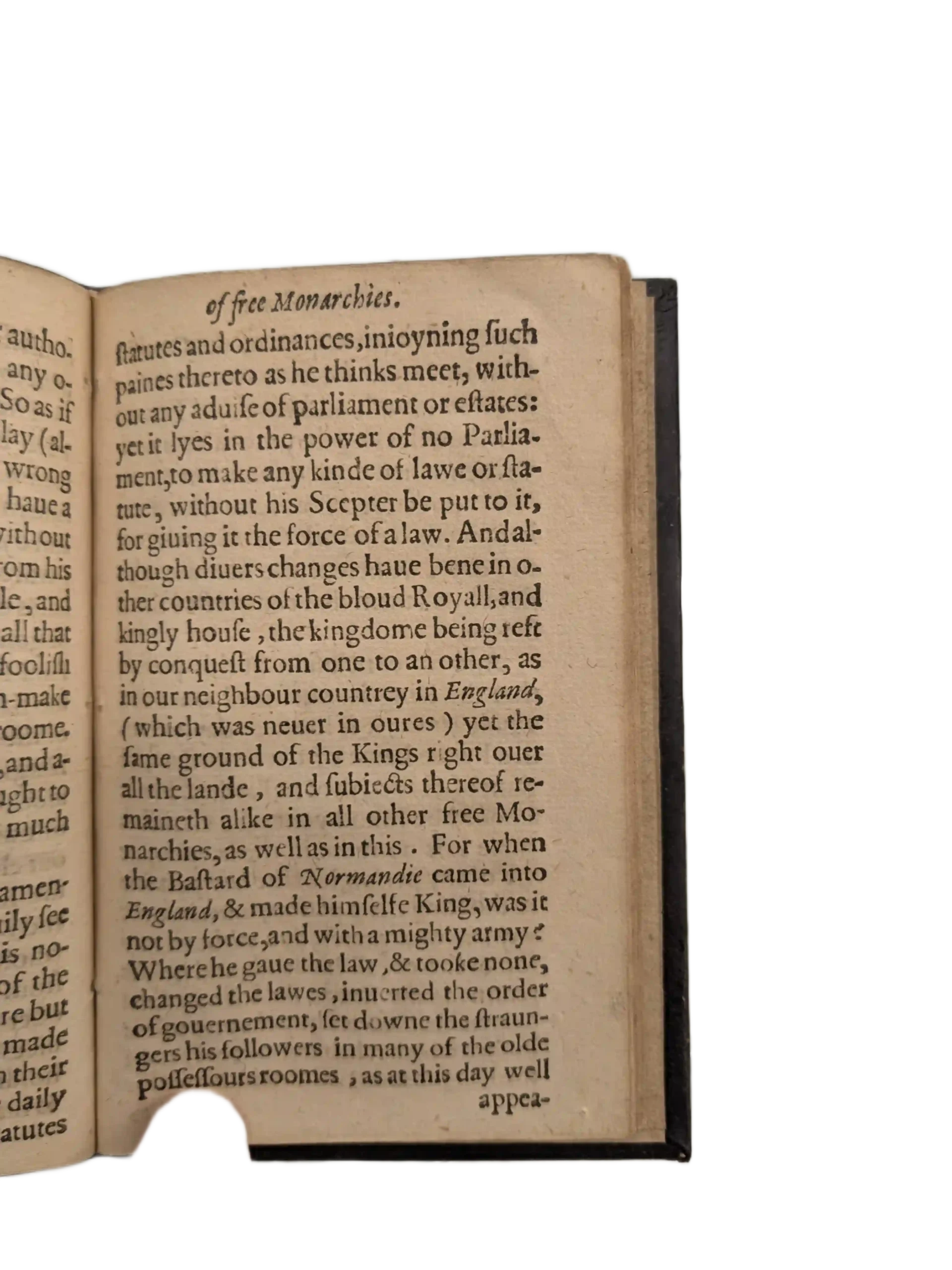
statutes and ordinances, injoyning such
paines thereto as he thinks meet, with-
out any advise of parliament or estates:
yet it lyes in the power of no Parlia-
ment, to make any kinde of lawe or sta-
tute, without his Scepter be put to it,
for giving it the force of a law. And al-
though divers changes have been in o-
ther countries of the bloud Royall, and
kingly house, the kingdome being rest
by conquest from one to an other, as
in our neighbour countrey in England,
(which was never in oures) yet the
same ground of the Kings right over
all the lande, and subjects thereof re-
maineth alike in all other free Mo-
narchies, as well as in this. For when
the Bastard of Normandie came into
England, & made himselfe King, was it
not by force, and with a mighty army?
Where he gave the law, & tooke none,
changed the lawes, inverted the order
of governement, set downe the straun-
gers his followers in many of the olde
possessours roomes, as at this day well
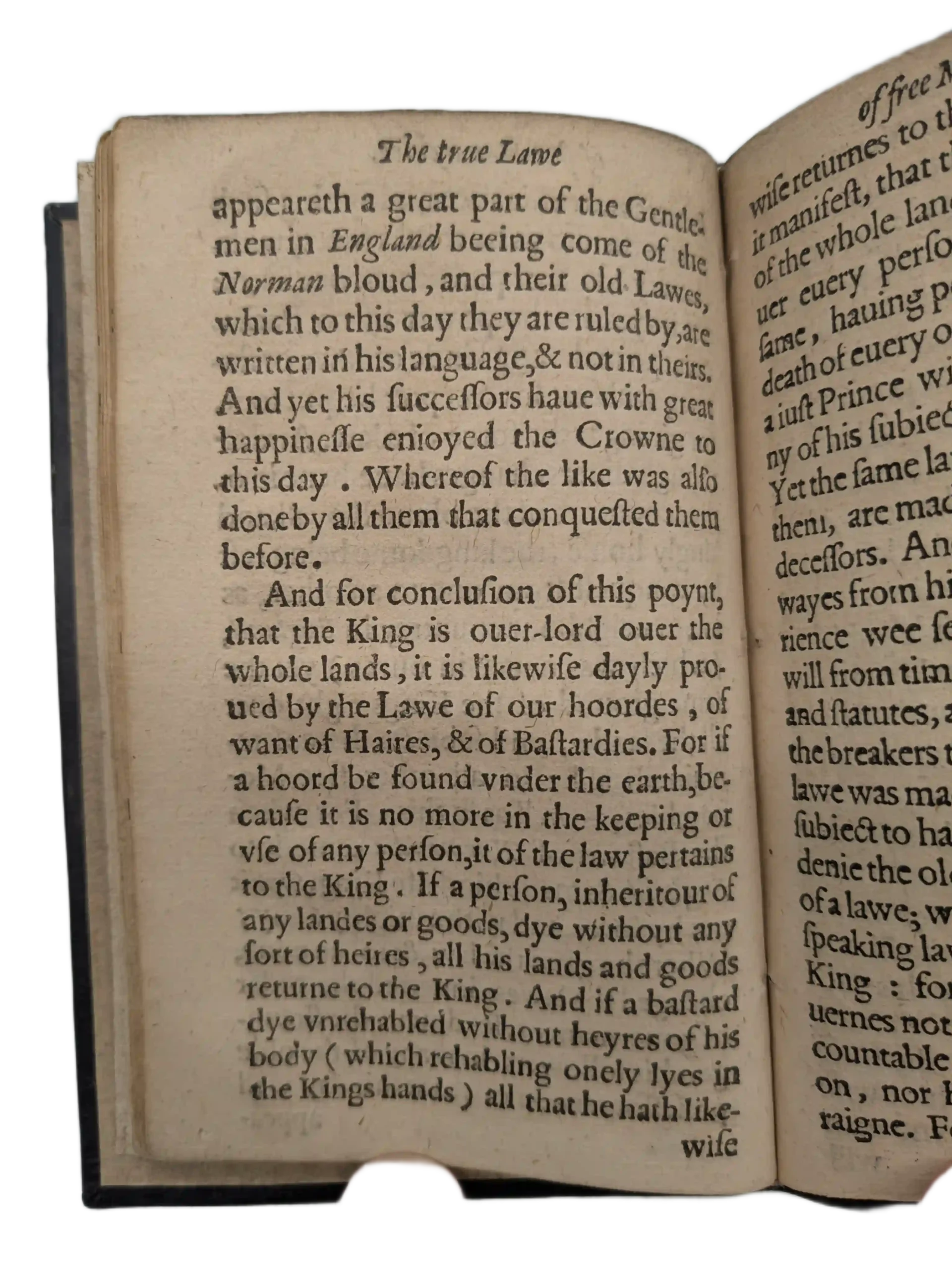
appeareth a great part of the Gentle-
men in England beeing come of the
Norman bloud, and their old Lawes,
which to this day they are ruled by, are
written in his language, & not in theirs.
And yet his successors have with great
happinesse enjoyed the Crowne to
this day. Whereof the like was also
done by all them that conquested them
before.
And for conclusion of this poynt,
that the King is over-lord over the
whole lands, it is like wise dayly pro-
ved by the Lawe of our hoordes, of
want of Haires, & of Bastardies. For if
a hoord be found under the earth, be-
cause it is no more in the keeping or
use of any person, it of the law pertains
to the King. If a person, inheritour of
any landes or goods, dye withour any
sort of heires, all his lands and goods
returne to the King. And if a bastard
dye unrehabled without heyres of his
body (which rehabling onely lyes in
the Kings hands) all that he hath like-
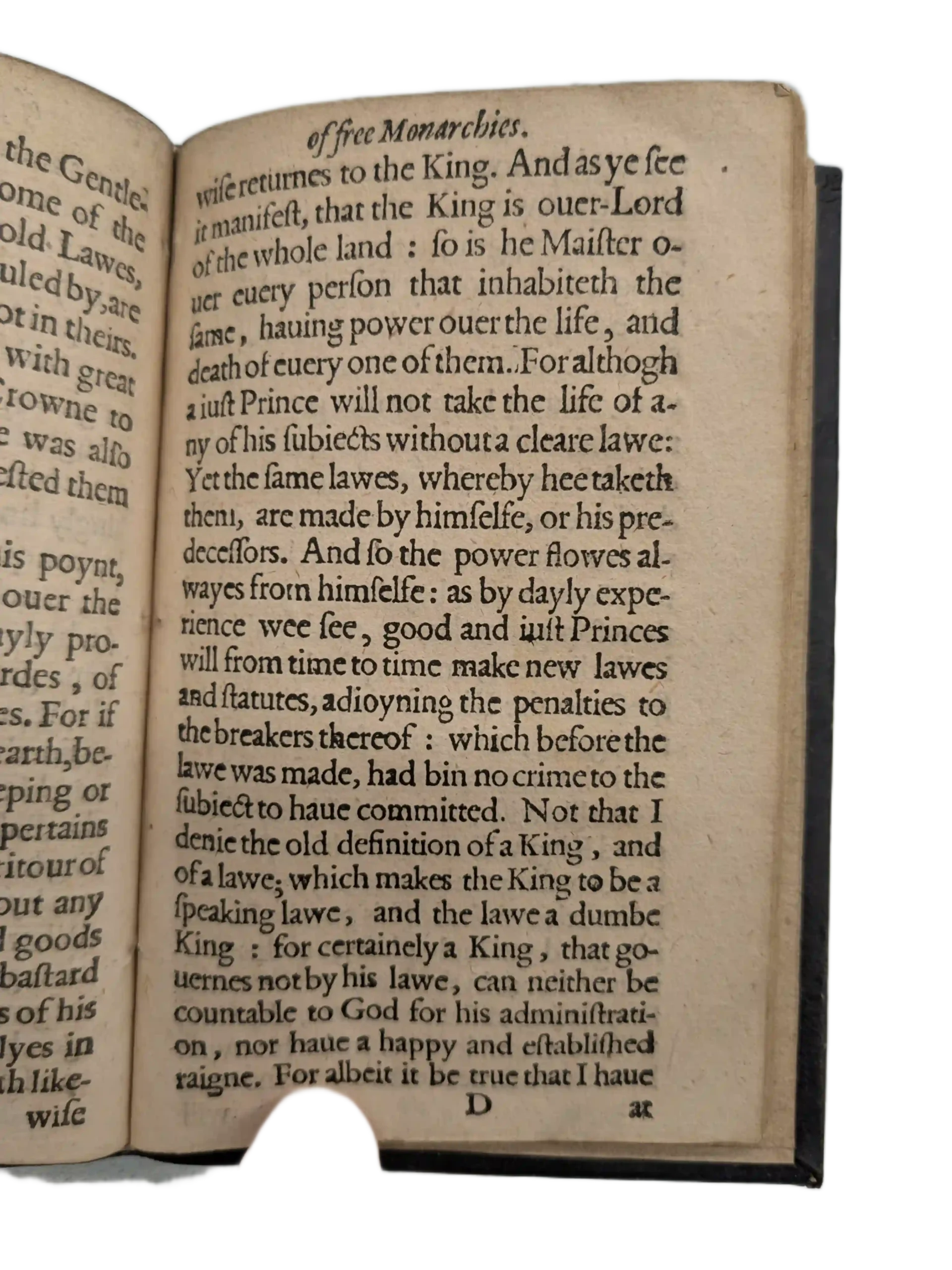
wise returnes to the King. And as ye see
it manifest, that the King is over-Lord
of the whole land : so is he Maister o-
ver every person that inhabiteth the
same, having power over the life, and
death of every one of them. For although
a just Prince will not take the life of a-
ny of his subjects without a cleare lawe:
Yet the same lawes, whereby hee taketh
them, are made by himselfe, or his pre-
decessors. And so the power flowes al-
wayes from himself: as by dayly expe-
rience wee see, good and just Princes
will from time to time make new lawes
and statues, adjoyning the penalties to
the breakers thereof : which before the
lawe was made, had bin no crime to the
subject to have committed. Not that I
denie the old definition of a King, and
of a lawe; which makes the King to be a
speaking lawe, and the lawe a dumbe
King : for certainely a King, that go-
vernes not by his lawe, can neither be
countable to God for his administrati-
on, nor have a happy and established
raigne. For albeit it be true that I have
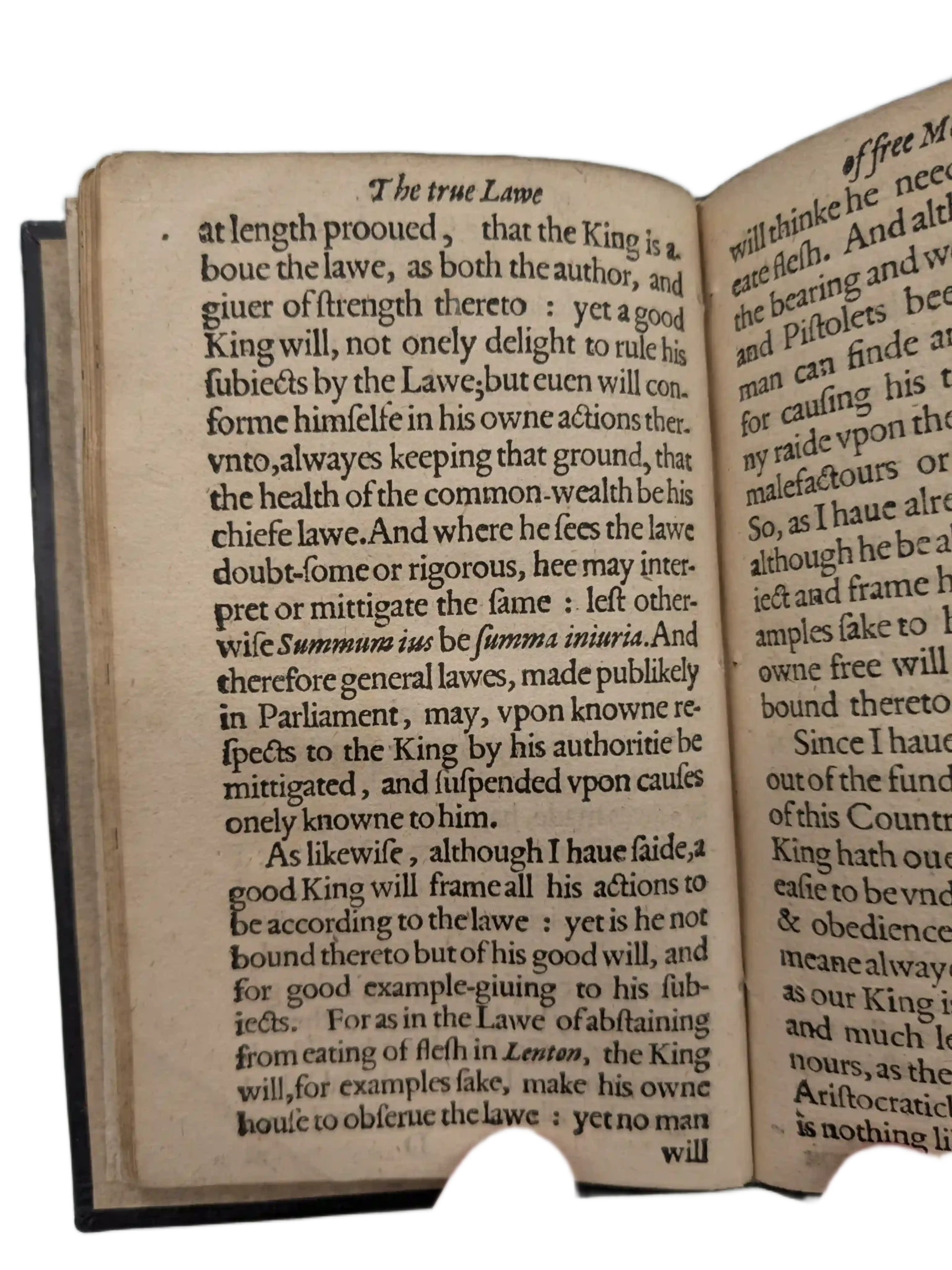
at length prooved, that the King is a-
bove the lawe, as both the author, and
giver of strength thereto : yet a good
King will, not onely delight to rule his
subjects by the Lawe; but even will con-
forme himselfe in his owne actions ther-
unto, alwayes keeping that ground, that
the health of the common-wealth be his
chiefe law. And where he sees the lawe
doubt-some or rigorous, hee may inter-
pret or mittigate the same : left other-
wise Summum jus be summa injuria. And
therefore general lawes, made publikely
in Parliament, may, upon knowne re-
spects to the King by his authoritie be
mittigated, and suspended upon causes
onely knowne to him.
As likewise, although I have saide, a
good King will frame all his actions to
be according to the lawe : yet is he not
bound thereto but of his good will, and
for good example-giving to his sub-
jects. For as in the Lawe of abstaining
from eating of flesh in Lenton, the King
will, for examples sake, make his owne
house to observe the lawe : yet no man
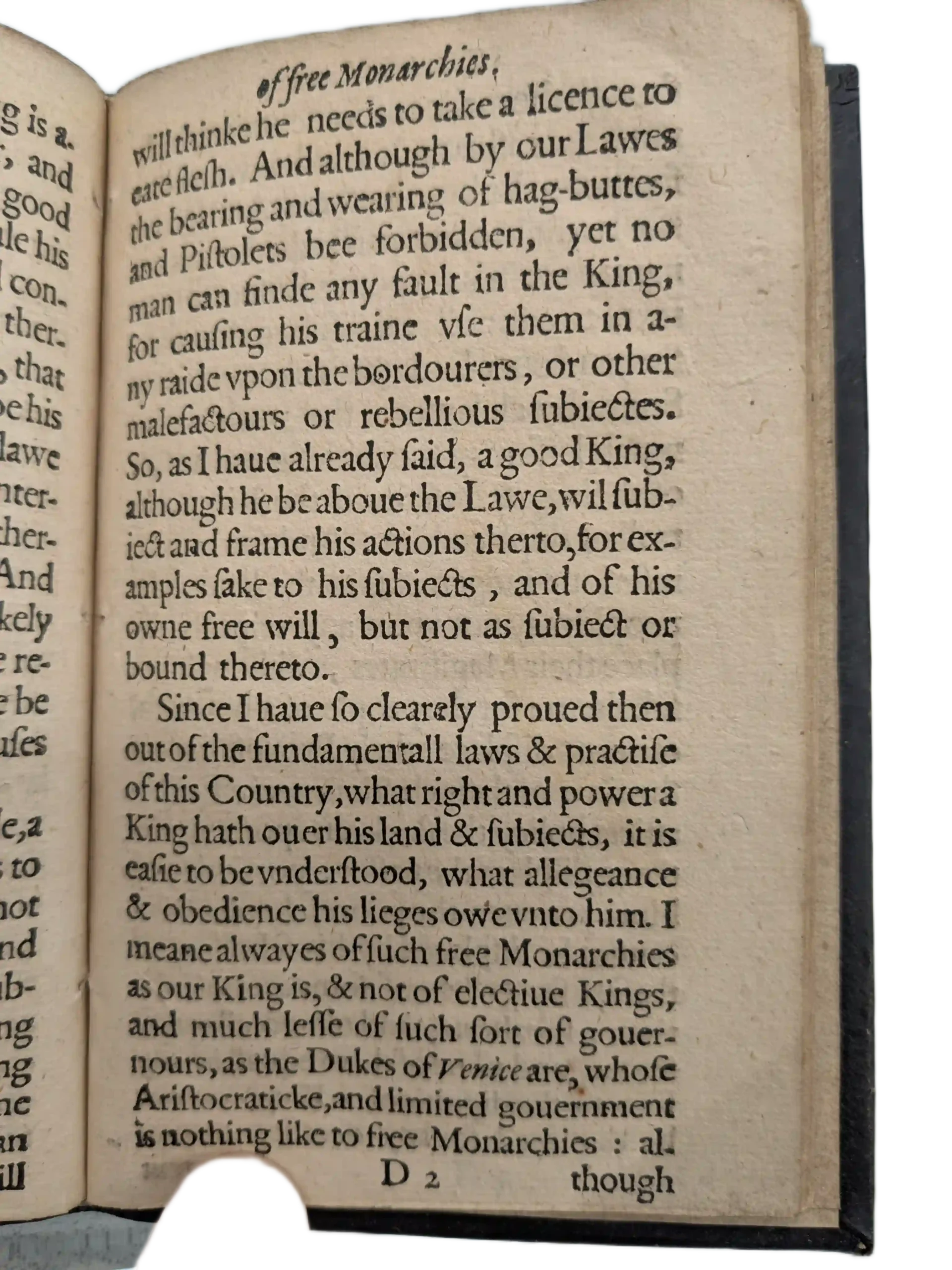
will thinke he needs to take a licence to
eate flesh. And although by our Lawes
the bearing and wearing of hag-buttes,
and Pistolets bee forbidden, yet no
man can finde any fault in the King,
for causing his traine use them in a-
ny raide upon the bordourers, or other
malefactours or rebellious subjectes.
So, as I have already said, a good King,
although he be above the Lawe, will sub-
ject and frame his actions therto, for ex-
amples sake to his subjects, and of his
owne free will, but not as subject or
bound thereto.
Since I have so clearely proved then
out of the fundamentall laws & practise
of this Country, what right and power a
King hath over his land & subjects, it is
easie to be understood, what allegeance
& obedience his lieges owe unto him. I
meane alwayes of such free Monarchies
as our King is, & not of elective Kings,
and much lesse of such sort of gover-
nours, as the Dukes of Venice are, whose
Aristocraticke, and limited government
is nothing like to free Monarchies: al-
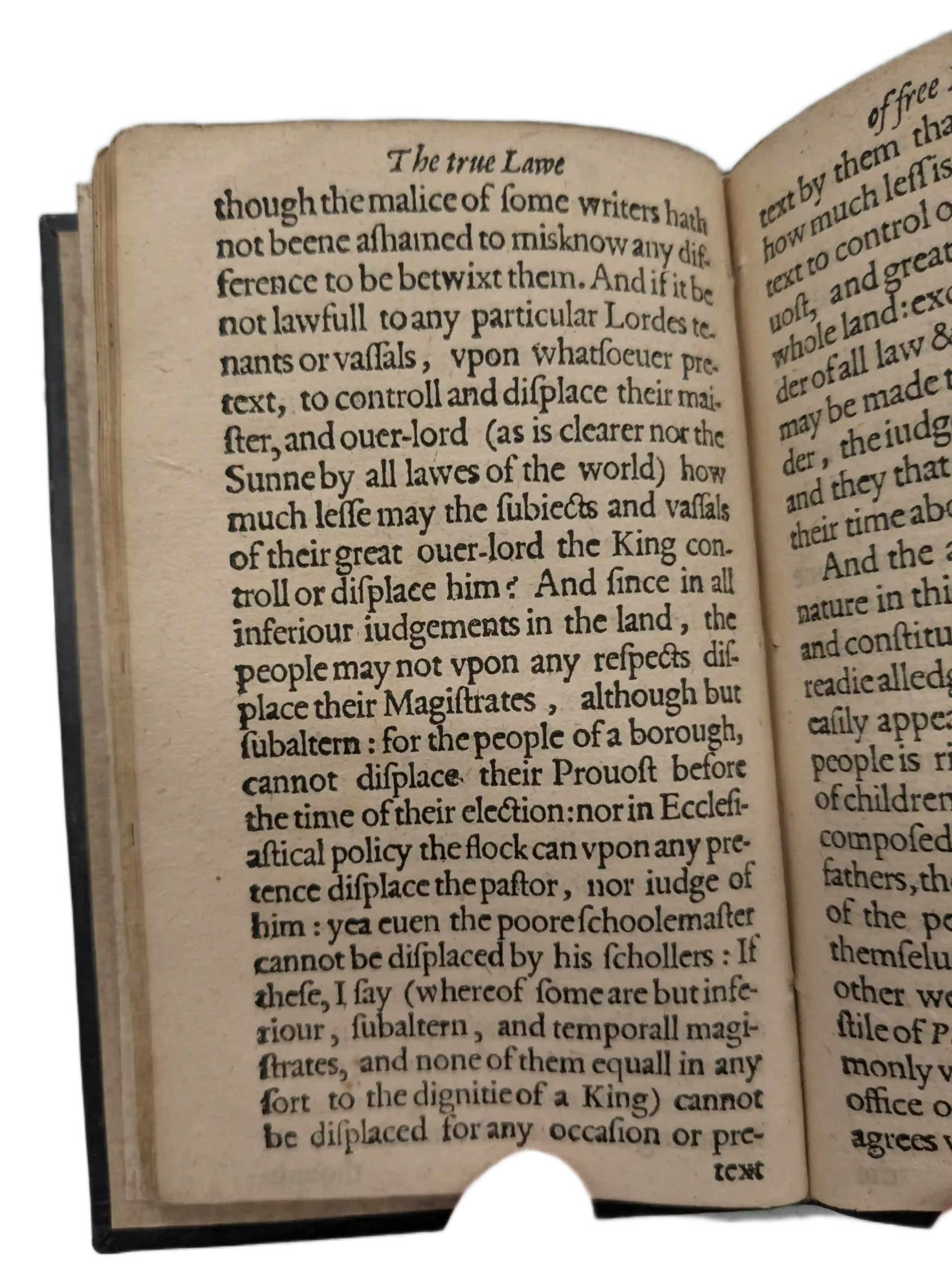
though the malice of some writers hath
not beene ashamed to misknow any dif-
ference to be betwixt them. And if it be
not lawfull to any particular Lordes te-
nants or vassals, upon whatsoever pre-
text, to controll and displace their mai-
ster, and over-lord (as is clearer nor the
Sunne by all lawes of the world) how
much lesse may the subjects and vassals
of their great over-lord the King con-
troll or displace him? And since in all
inferiour judgements in the land, the
people may not upon any respects dis-
place their Magistrates, although but
subaltern: for the people of a borough,
cannot displace their Provost before
the time of their election: nor in Ecclesi-
astical policy the flock can upon any pre-
tence displace the pastor, nor judge of
him: yea even the poore schoolemaster
cannot be displaced by his schollers : If
these, I say (whereof some are but infe-
riour, subaltern, and temporall magi-
strates, and none of them equall in any
sort to the dignitie of a King) cannot
be displaced for any occasion or pre-
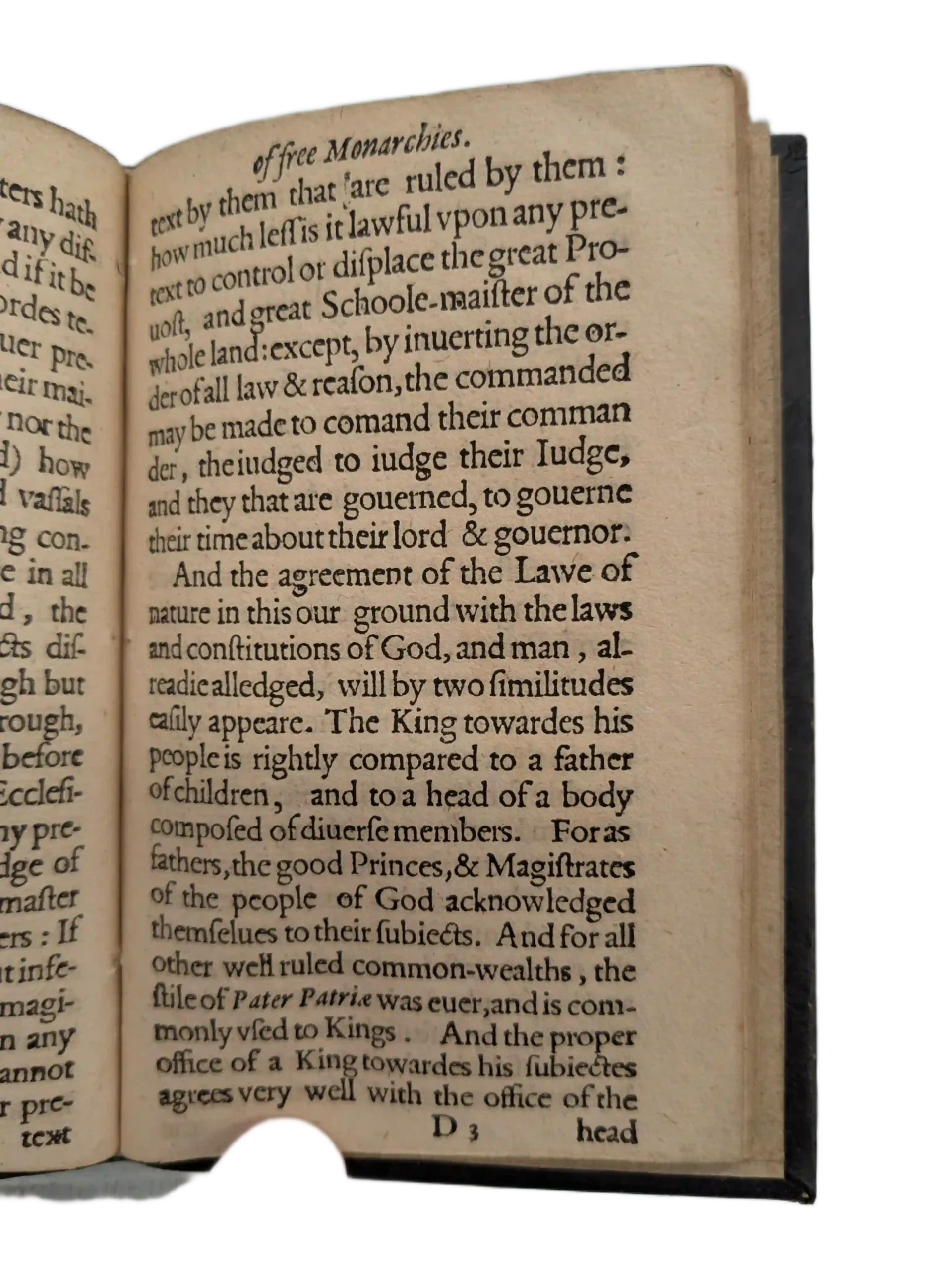
text by them that are ruled by them:
how much less is it lawful upon any pre-
text to control or displace the great Pro-
vost, and great Schoole-maister of the
whole land: except, by inverting the or-
der of all law & reason, the commanded
may be made to comand their comman-
der, the judged to judge their Judge,
and they that are governed, to governe
their time about their lord & governor.
And the agreement of the Lawe of
nature in this our ground with the laws
and constitutions of God, and man, al-
readie alledged, will by two similitudes
easily appeare. The King towardes his
people is rightly compared to a father
of childen, and to a head of a body
composed of diverse members. For as
fathers, the good Princes, & Magistrates
of the people of God acknowledged
themselves to their subjects. And for all
other well ruled common-wealths, the
stile of Pater Patriæ was ever, and is com-
monly used to Kings. And the proper
office of a King towardes his subjectes
agrees very well with the office of the
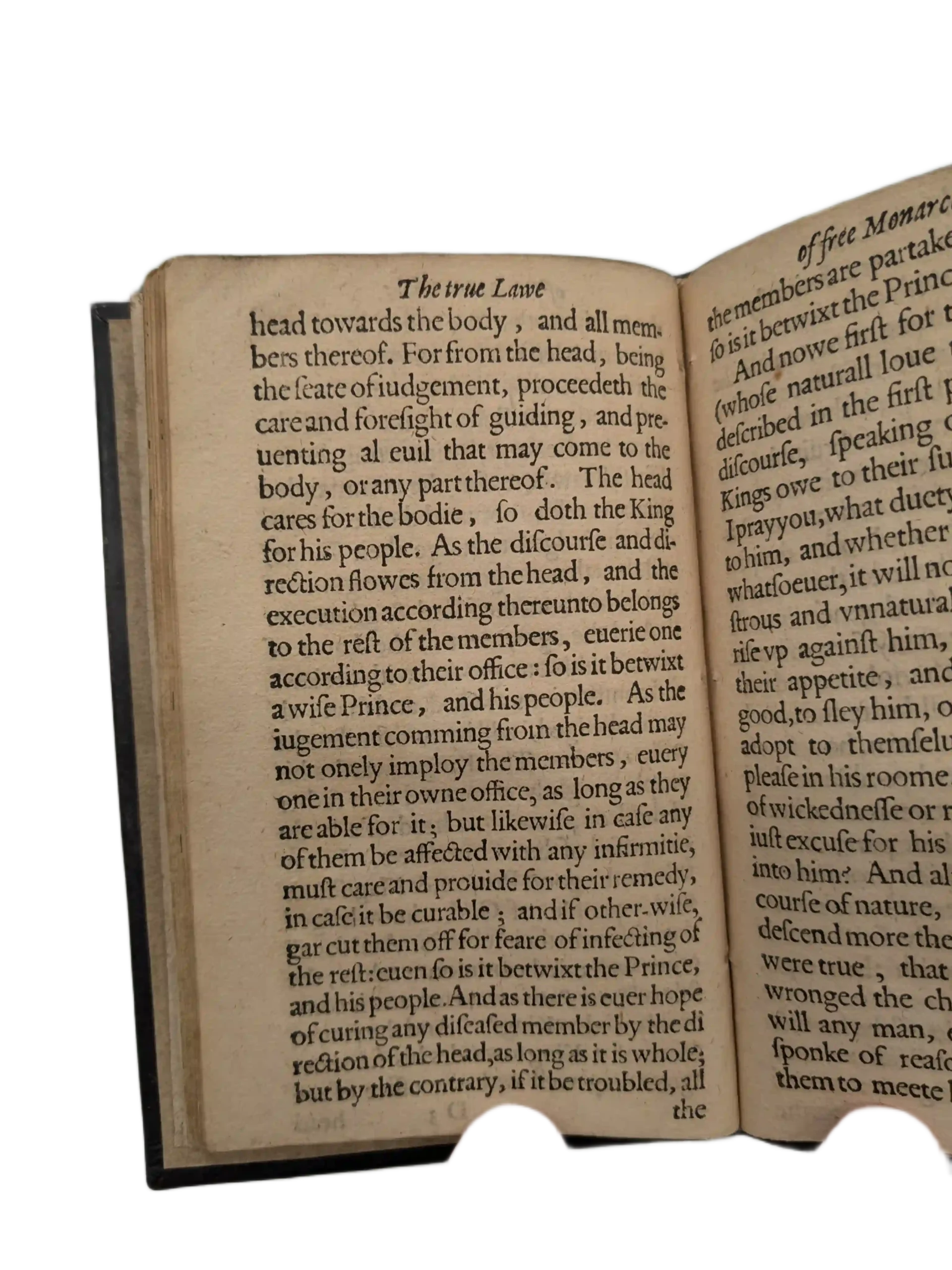
head towards the body, and all mem-
bers thereof. For from the head, being
the seate of judgement, proceedeth the
care and forefight of guiding, and pre-
venting al evil that may come to the
body, or any part thereof. The head
cares for the bodie, so doth the King
for his people. As the discourse and di-
rection flowes from the head, and the
execution according thereunto belongs
to the rest of the members, everie one
according to their office: so is it betwixt
a wise Prince, and his people. As the
jugement comming from the head may
not onely imploy the members, every
one in their owne office, as long as they
are able for it; but likewise in case any
of them be affected with any infirmitie,
must care and provide for their remedy,
in case it be curable; and if other-wise,
gar cut them off for feare of infecting of
the rest: even so it is betwixt the Prince,
and his people. And as there is ever hope
of curing any diseased member by the di-
rection of the head, as long as it is whole;
but by the contrary, if it be troubled, all
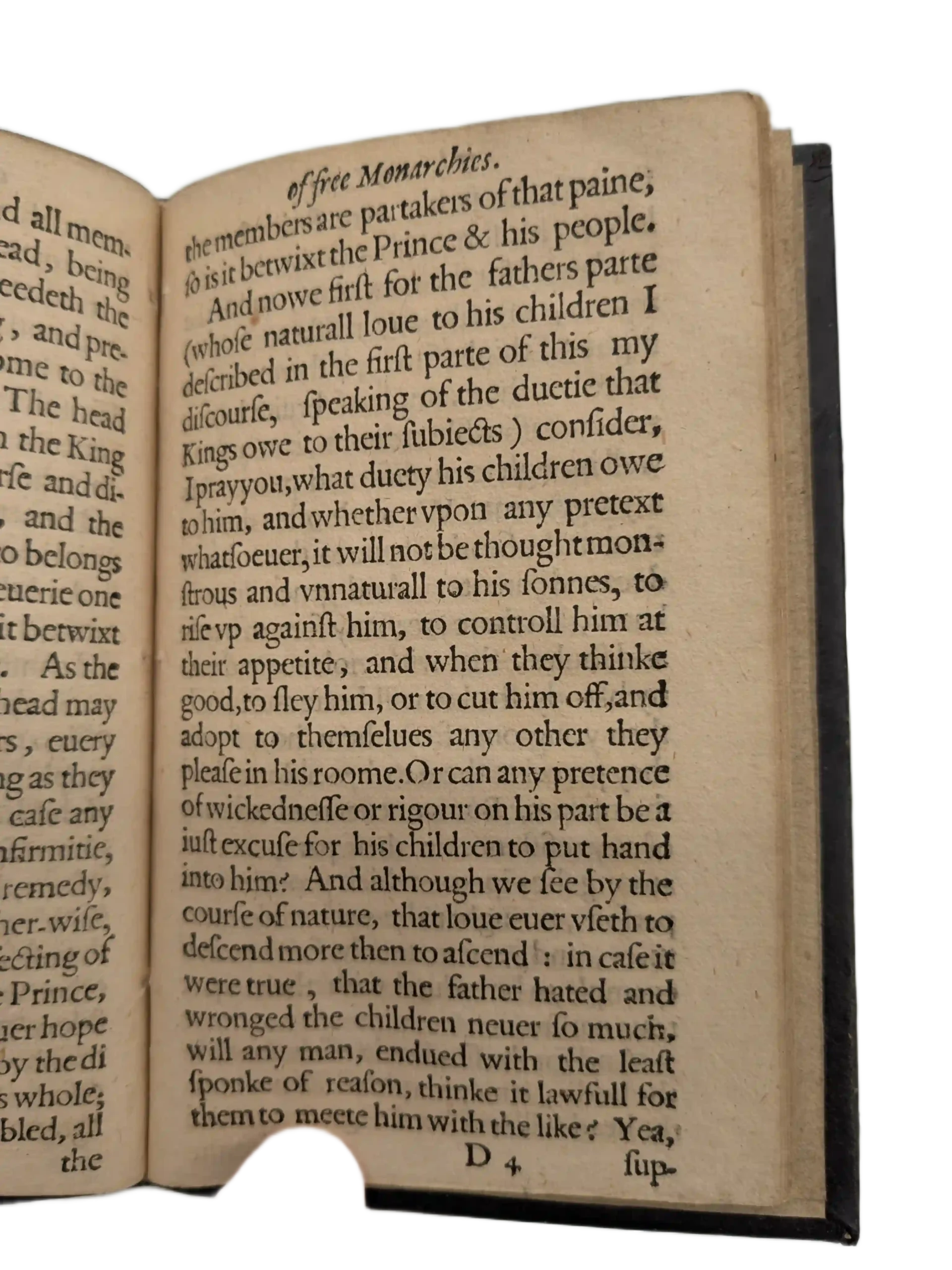
the members are partakers of that paine,
so is it betwixt the Prince & his people.
And nowe first for the fathers parte
(whose naturall love to his children I
described in the first parte of this my
discourse, speaking of the duetie that
Kings owe to their subjects ) consider,
I pray you, what duety his children owe
to him, and whether upon any pretext
whatsoever, it will not be thought mon-
strous and unnaturall to his sonnes, to
rise up against him, to controll him at
their appetite, and when they thinke
good, to sley him, or to cut him off, and
adopt to themselves any other they
please in his roome. Or can any pretence
of wickednesse or rigour on his part be a
just excuse for his children to put hand
into him? And although we see by the
course of nature, that love ever useth to
descend more then to ascend: in case it
were true, that the father hated and
wronged the children never so much,
will any man, endued with the least
sponke of reason, thinke it lawfull for
them to meete him with the like? Yea,
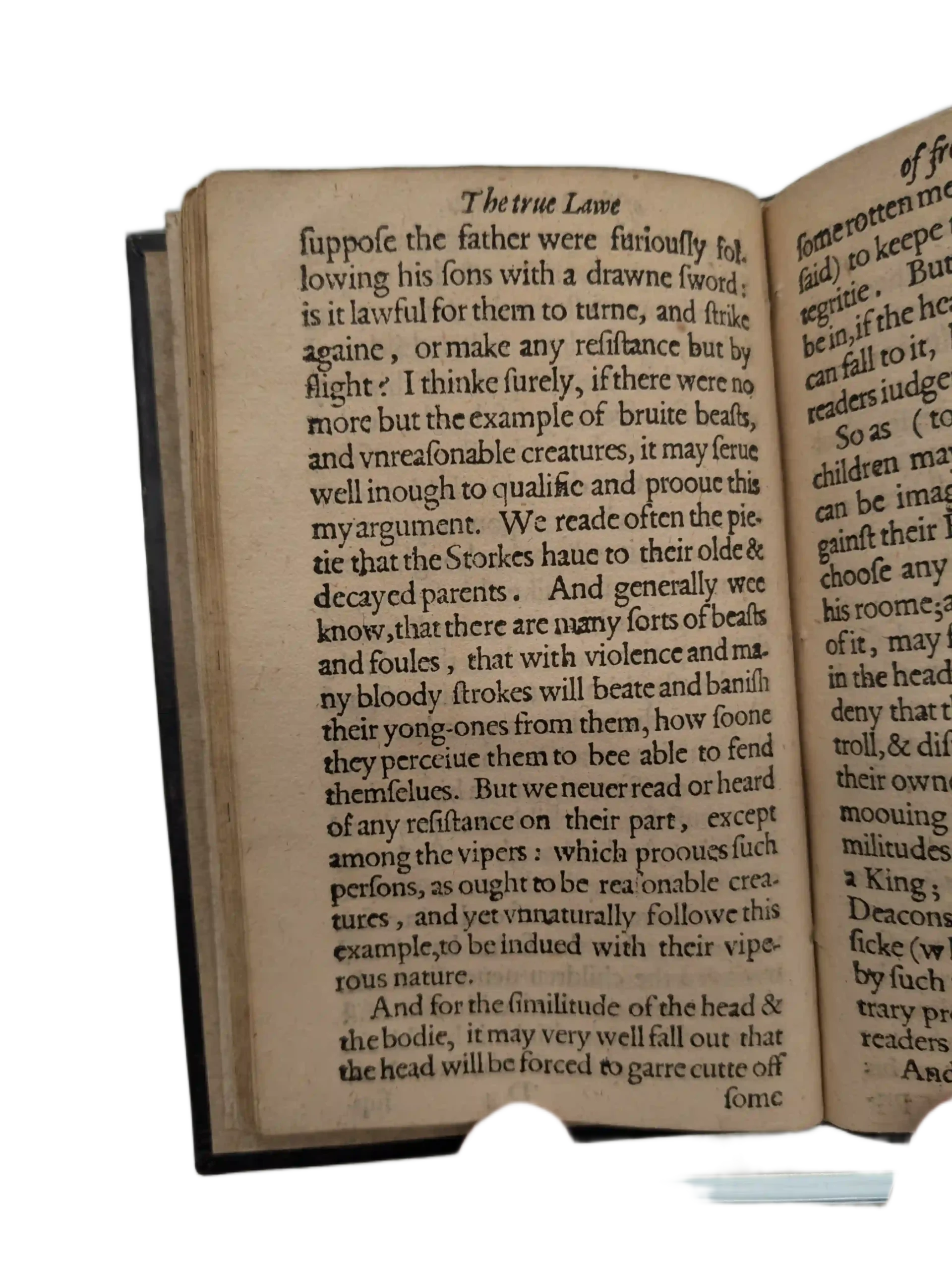
suppose the father were furiously fol-
lowing his sons with a drawne sword:
is it lawful for them to turne, and strike
againe, or make any resistance but by
flight? I thinke surely, if there were no
more but the example of bruite beasts,
and unreasonable creatures, it may serve
well inough to qualifie and proove this
my argument. We reade often the pie-
tie that the Storkes have to their olde &
decayed parents. And generally wee
know, that there are many sorts of beasts
and soules, that with violence and ma-
ny bloody strokes will beate and banish
their yong-ones from them, how soone
they perceive them to bee able to fend
themselves. But we never read or heard
of any resistance on their part, except
among the vipers : which prooves such
persons, as ought to be reasonable crea-
tures, and yet unnaturally followe this
example, to be indued with their vipe-
rous nature.
And for the similitude of the head &
the bodie, it may very well fall out that
the head will be forced to garre cutte off
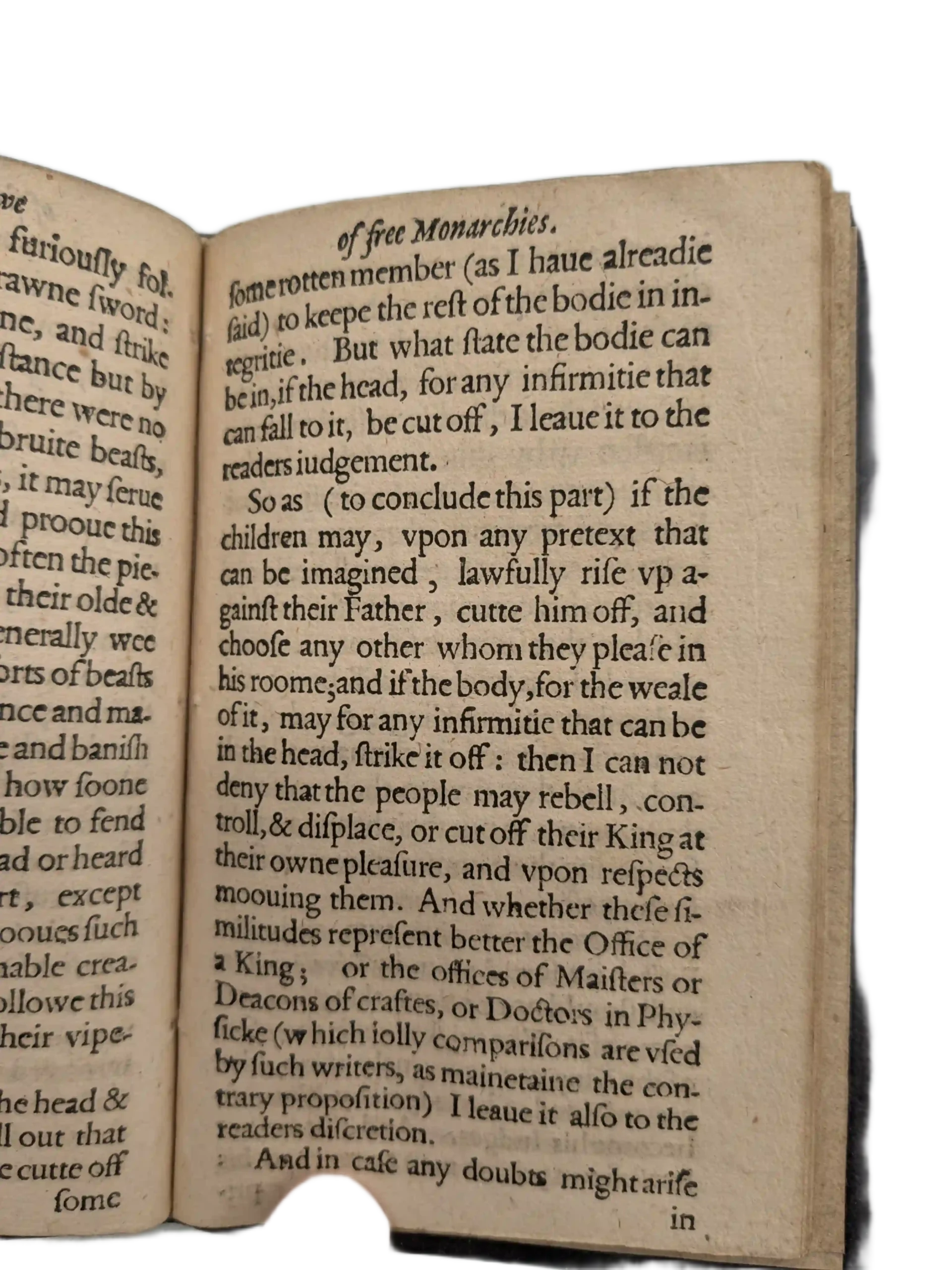
some rotten member (as I have alreadie
said) to keepe the rest of the bodie in in-
tegritie. But what state the bodie can
be in, if the head, for any infirmitie that
can fall to it, be cut off, I leave it to the
readers judgement.
So as (to conclude this part) if the
children may, upon any pretext that
can be imagined, lawfully rise up a-
gainst their Father, cutte him off, and
choose any other whom they please in
his roome; and if the body, for the weale
of it, may for any infirmitie that can be
in the head, strike it off: then I can not
deny that the people may rebell, con-
troll, & displace, or cut off their King at
their owne pleasure, and upon respects
mooving them. And whether these si-
militudes represent better the Office of
a King; or the offices of Maisters or
Deacons of craftes, or Doctors in Phy-
sicke (which jolly comparisons are used
by such writers, as mainetaine the con-
trary proposition ) I leave it also to the
readers discretion.
And in case any doubts might arise
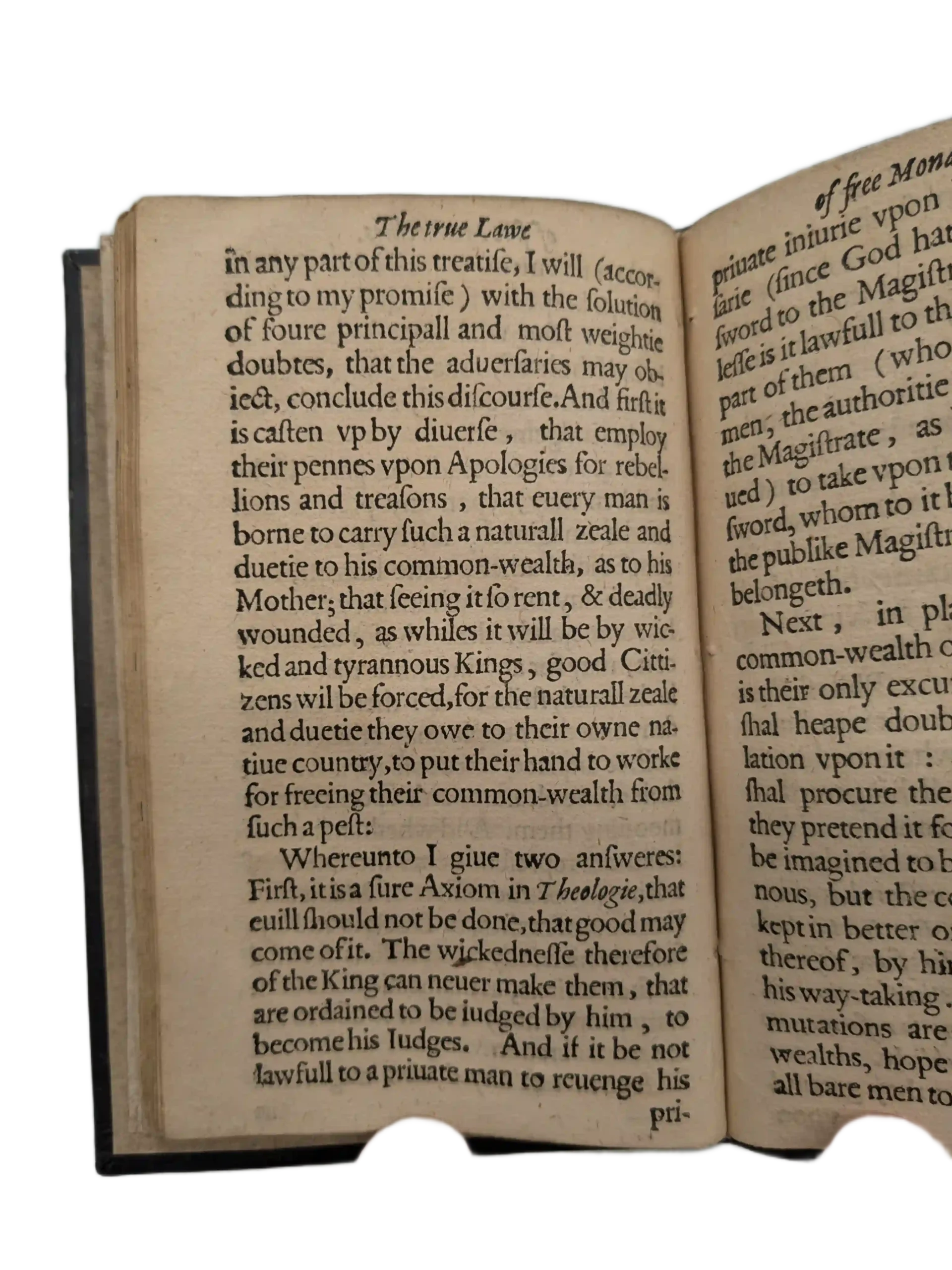
in any part of this treatise, I will (accor-
ding to my promise ) with the solution
of foure principall and most weightie
doubtes, that the adversaries may ob-
ject, conclude this discourse. And first it
is casten up by diverse, that employ
their pennes upon Apologies for rebel-
lions and treasons, that every man is
borne to carry such a naturall zeale and
duetie to his common-wealth, as to his
Mother; that seeing it so rent, & deadly
wounded, as whiles it will be by wic-
ked and tyrannous Kings, good Citti-
zens wil be forced, for the naturall zeale
and duetie they owe to their owne na-
tive country, to put their hand to worke
for freeing their common-wealth from
such a pest:
Whereunto I give two answeres:
First, it is a sure Axiom in Theologie, that
evill should not be done, that good may
come of it. The wickednesse therefore
of the King can never make them, that
are ordained to be judged by him, to
become his Judges. And if it be not
lawfull to a private man to revenge his
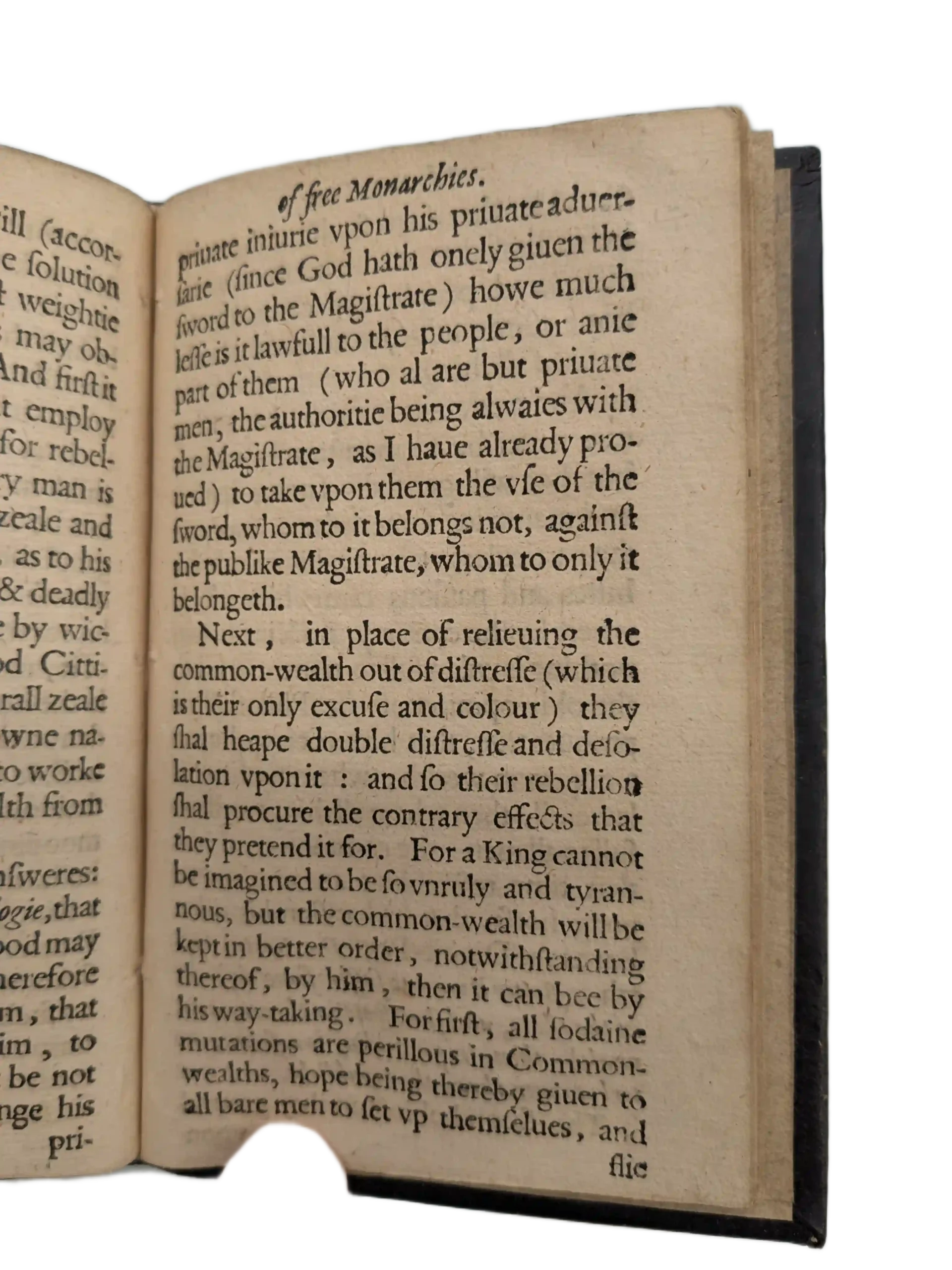
private injurie upon his private adver-
sarie (since God hath onely given the
sword to the Magistrate) howe much
lesse is it lawfull to the people, or anie
part of them (who al are but private
men, the authoritie being alwaies with
the Magistrate, as I have already pro-
ved) to take upon them the use of the
sword, whom to it belongs not, against
the publike Magistrate, whom to only it
belongeth.
Next, in place of relieving the
common-wealth out of distresse (which
is their only excuse and colour) they
shal heape double distresse and deso-
lation upon it : and so their rebellion
shal procure the contrary effects that
they pretend it for. For a King cannot
be imagined to be so unruly and tyran-
nous, but the common-wealth will be
kept in better order, notwithstanding
thereof, by him, then it can bee by
his way-taking. For first, all sodaine
mutations are perillous in Common-
wealths, hope being thereby given to
all bare men to set up themselves, and
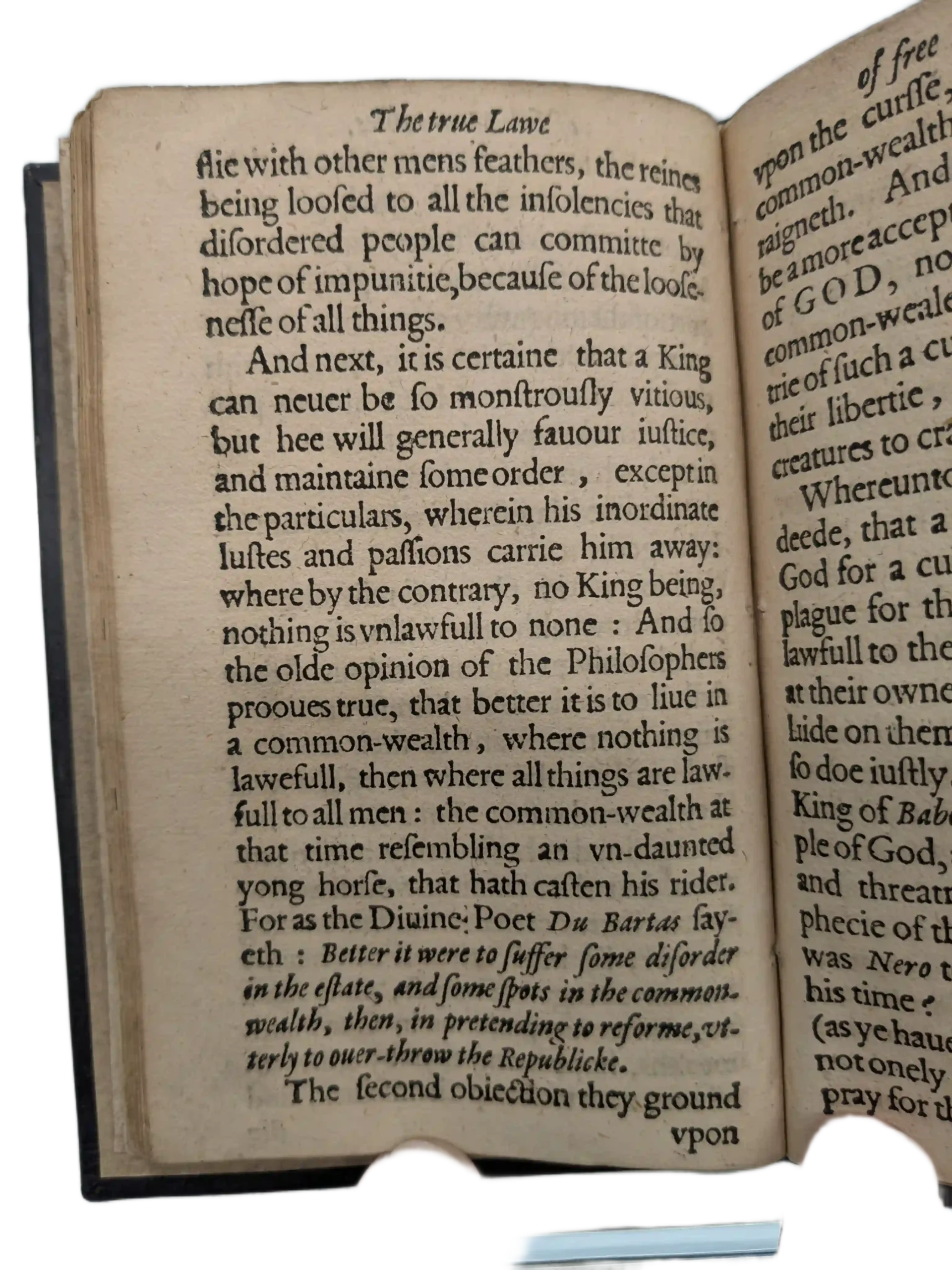
flie with other mens feathers, the reines
being loosed to all the insolencies that
disordered people can committe by
hope of impunitie, because of the loose-
nesse of all things.
And next, it is certaine that a King
can never be so monstrously vitious,
but hee will generally favour justice,
and maintaine some order, except in
the particulars, wherein his inordinate
lustes and passions carrie him away:
where by the contrary, no King being,
nothing is unlawfull to none: And so
the olde opinion of the Philosophers
prooves true, that better it is to live in
a common-wealth, where nothing is
lawefull, then where all things are law-
full to all men: the common-wealth at
that time resembling an un-daunted
yong horse, that hath casten his rider.
For as the Divine Poet Du Bartas say-
eth: Better it were to suffer some disorder
in the estate, and some spots in the common-
wealth, then, in pretending to reforme, ut-
terly to over-throw the Republicke.
The second objection they ground
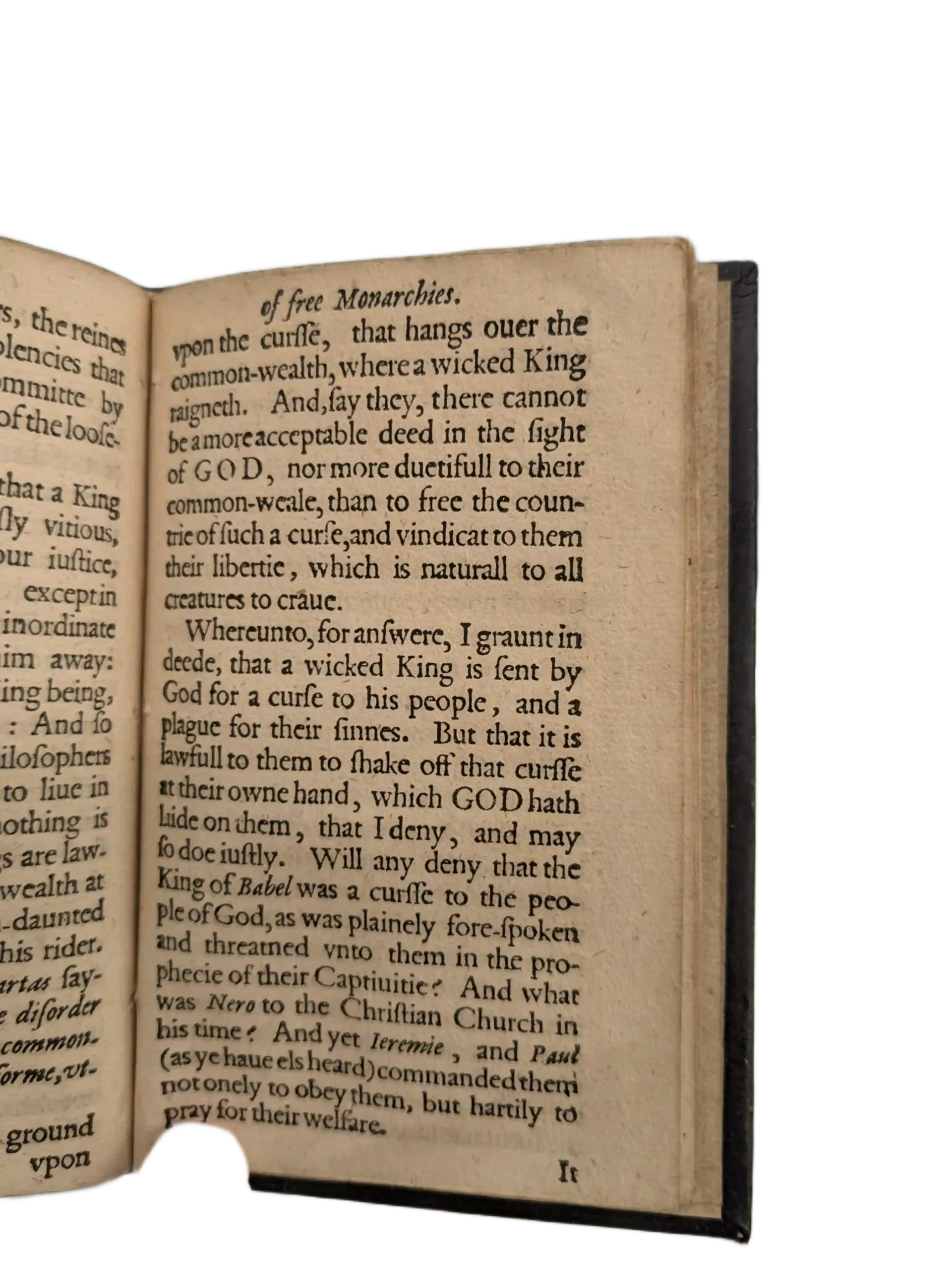
upon the cursse, that hangs over the
common-wealth, where a wicked King
raigneth. And, say they, there cannot
be a more acceptable deed in the fight
of GOD, nor more duetifull to their
common-weale, than to free the coun-
trie of such a curse, and vindicat to them
their libertie, which is naturall to all
creatures to crave.
Whereunto, for answere, I graunt in
deede, that a wicked King is sent by
God for a curse to his people, and a
plague for their finnes. But that it is
lawfull to them to shake off that cursse
at their owne hand, which GOD hath
laide on them, that I deny, and may
so doe justly. Will any deny that the
King of Babel was a cursse to the peo-
ple of God, as was plainely fore-spoken
and threatned unto them in the pro-
phecie of their Captivitie? And what
was Nero to the Christian Church in
his time? And yet Jeremie, and Paul
(as ye have els heard) commanded them
not onely to obey them, but hartily to
pray for their welfare.
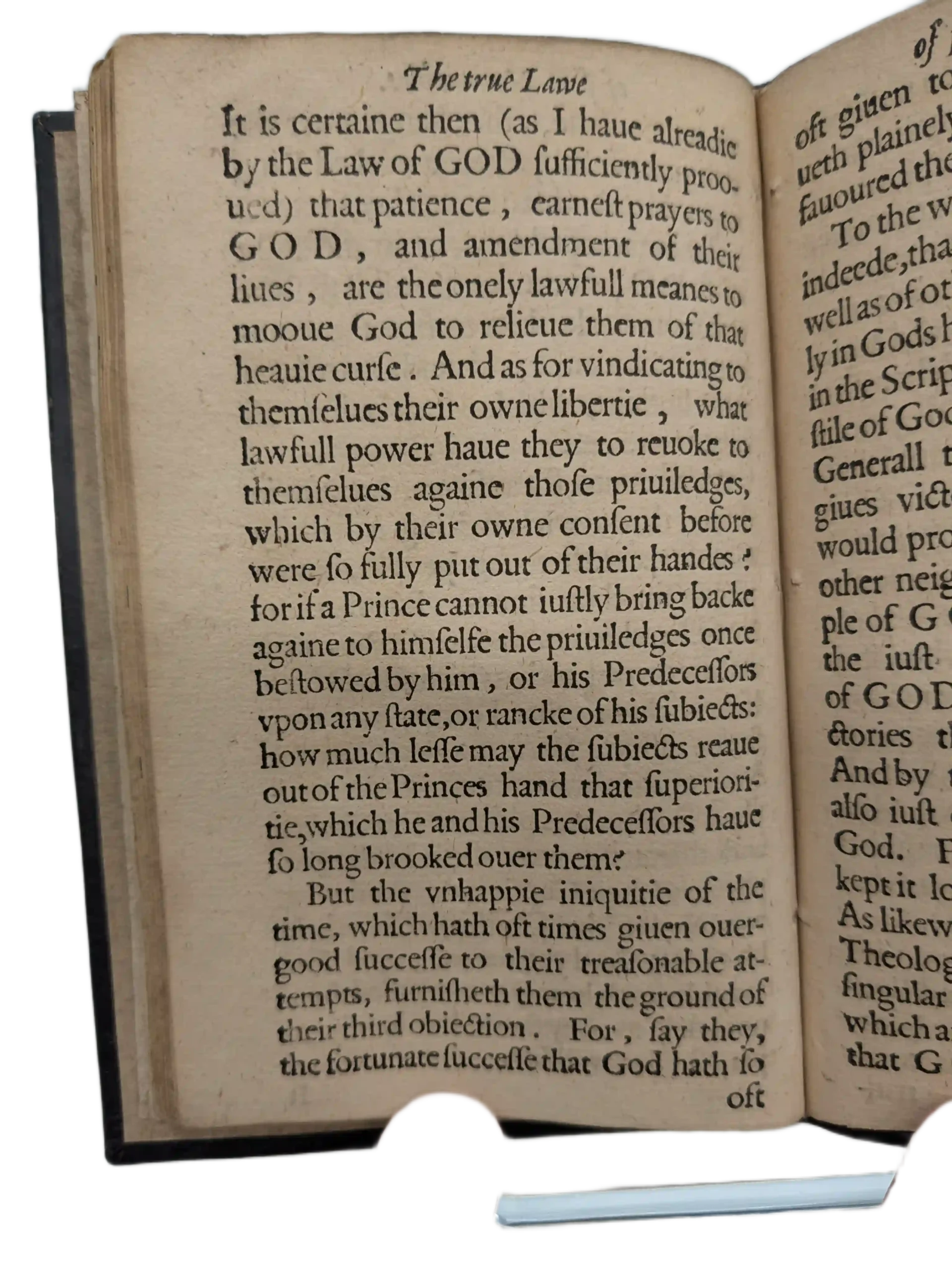
It is certaine then (as I have alreadie
by the Law of GOD sufficiently proo-
ved) that patience, earnest prayers to
GOD, and amendment of their
lives, are the onely lawfull meanes to
moove God to relieve them of that
heavie curse. And as for vindicating to
themselves their owne libertie, what
lawfull power have they to revoke to
themselves againe those priviledges,
which by their owne consent before
were so fully put out of their handes?
for if a Prince cannot justly bring backe
againe to himselfe the priviledges once
bestowed by him, or his Predecessors
upon any state, or rancke of his subjects:
how much lesse may the subjects reave
out of the Princes hand that superiori-
tie, which he and his Predecessors have
so long brooked over them?
But the unhappie iniquitie of the
time, which hath oft times given over-
good successe to their treasonable at-
tempts, furnisheth them the ground of
their third objection. For, say they,
the fortunate successe that God hath so
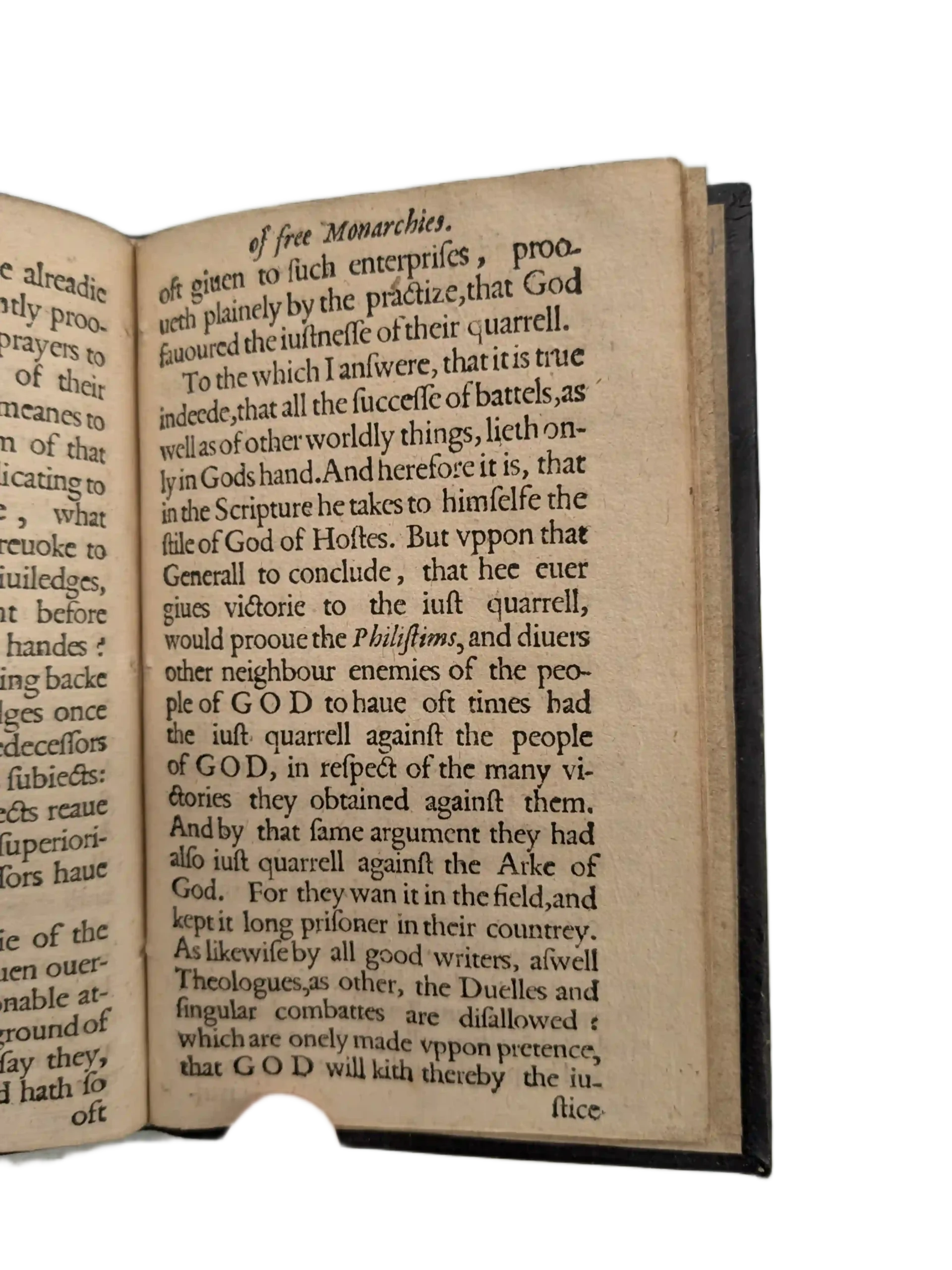
oft given to such enterprises, proo-
veth plainely by the practize, that God
favoured the justnesse of their quarrell.
To the which I answere, that this is true
indeede, that all the successe of battels, as
well as of other worldly things, lieth on-
ly in Gods hand. And herefore it is, that
in the Scripture he takes to himselfe the
stile of Gods of Hostes. But uppon that
Generall to conclude, that hee ever
gives victorie to the just quarrell,
would proove the Philistims, and divers
other neighbour enemies of the peo-
ple of GOD to have oft times had
the just quarrell against the people
of GOD, in respect of the many vi-
ctories they obtained against them.
And by that same argument they had
also just quarrell against the Arke of
God. For they wan it in the field, and
kept it long prisoner in their countrey.
As likewise by all good writers, aswell
Theologues, as other, the Duelles and
singular combattes are disallowed :
which are onely made uppon pretence,
that GOD will kith thereby the ju-
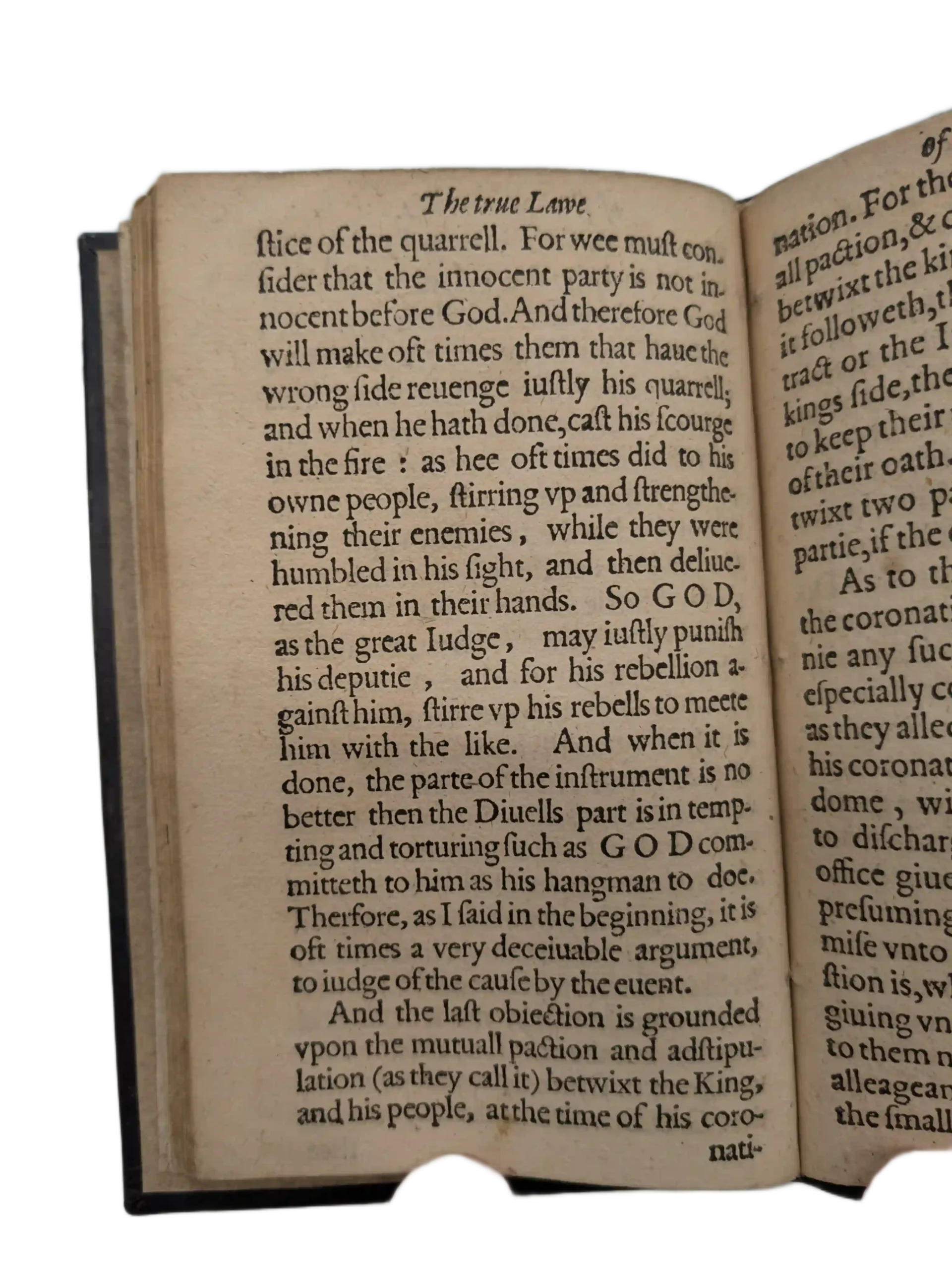
stice of the quarrell. For wee must con-
sider that the innocent party is not in-
nocent before God. And therefore God
will make oft times them that have the
wrong side revenge justly his quarrell;
and when he hath done, cast his scourge
in the fire: as hee oft times did to his
owne people, stirring up and strengthe-
ning their enemies, while they were
humbled in his fight, and then delive-
red them in their hands. So GOD,
as the Judge, may justly punish
his deputie, and for his rebellion a-
gainst him, stirre up his rebells to meete
him with the like. And when it is
done, the parte of the instrument is no
better then the Divells part is in temp-
ting and torturing such as GOD com-
mitteth to him as his hangman to doe.
Therfore, as I said in the beginning, it is
oft times a very deceivable argument,
to judge of the cause by the event.
And the last objection is grounded
upon the mutuall paction and adstipu-
lation (as they call it) betwixt the King,
and his people, at the time of his coro-
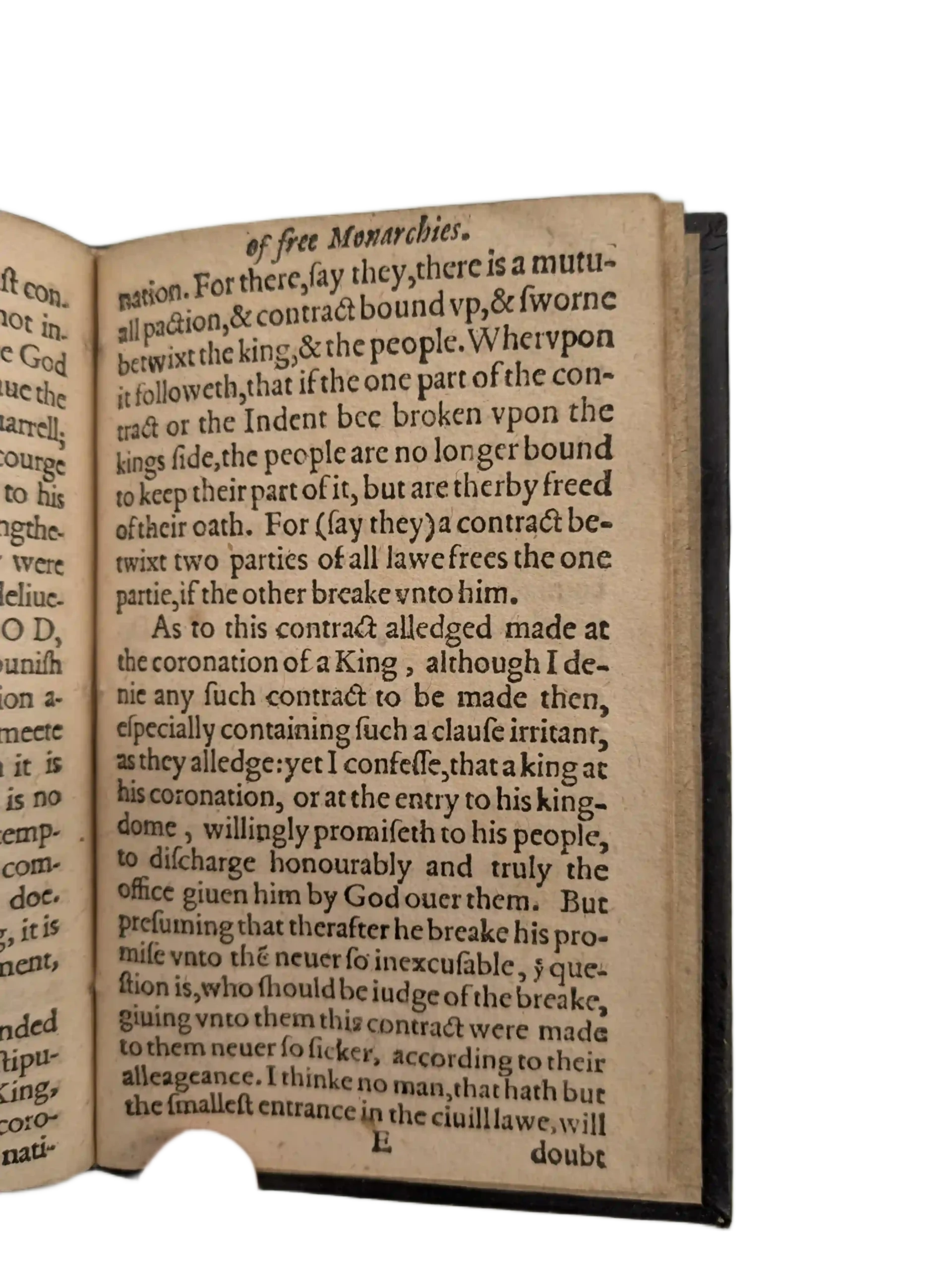
nation. For there, say they, there is a mutu-
all paction, & contract bound up, & sworne
betwixt the king, & the people. Wherupon
it followeth, that if the one part of the con-
tract or the Indent bee broken upon the
kings side, the people are no longer bound
to keep their part of it, but are therby freed
of their oath. For (say they) a contract be-
twixt two parties of all lawe frees the one
partie, if the other breake unto him.
As to this contract alledged made at
the coronation of a King, although I de-
nie any such contract to be made then,
especially containing such a clause irritant,
as they alledge: yet I confesse, that a king at
his coronation, or at the entry to his king-
dome, willingly promiseth to his people,
to discharge honourably and truly the
office given him by God over them. But
presuming that therafter he breake his pro-
mise unto them never so inexcusable, ye que-
stion is, who should be judge of the breake,
giving unto them this contract were made
to them never so sicker, according to their
alleageance. I thinke no man, that hath but
the smallest entrance in the civill lawe, will
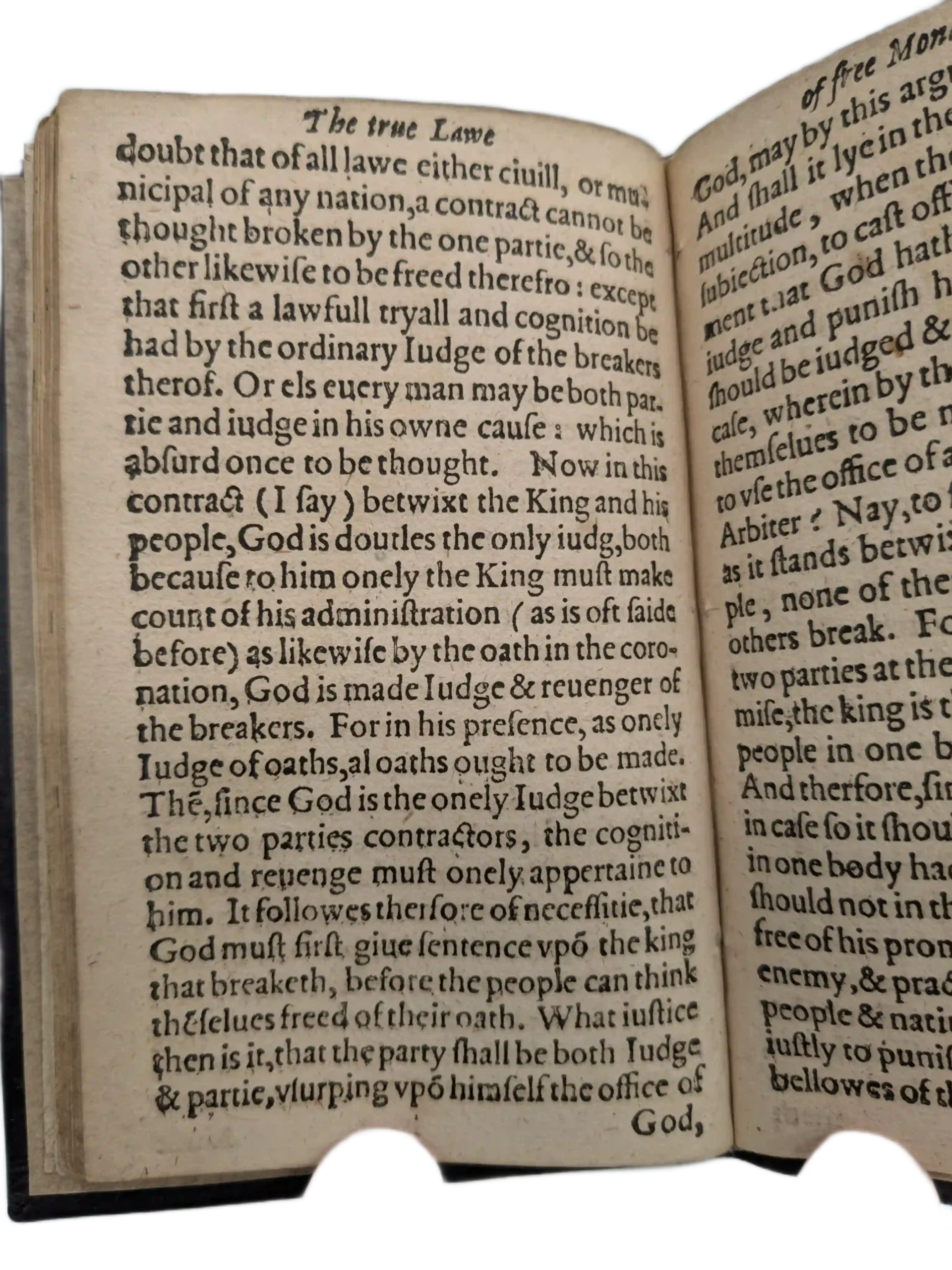
doubt that of all lawe either civill, or mu-
nicipal of any nation, a contract cannot be
thought broken by the one partie, & so the
other likewise to be freed therefro: except
that first a lawfull tryall and cognition be
had by the ordinary Judge of the breakers
therof. Or els every man may be both par-
tie and judge in his owne cause: which is
absurd once to be thought. Now in this
contract (I say) betwixt the King and his
people, God is doubtles the other judg, both
because to him onely the King must make
count of his administration ( as is oft saide
before) as likewise by the oath in the coro-
nation, God is made Judge & revenger of
the breakers. For in his presence, as onely
Judge of oaths, al oaths ought to be made.
Then, since God is the onely Judge betwixt
the two parties contractors, the cogniti-
on and revenge must onely appertaine to
him. It follows therfore of necessitie, that
God must first give sentence upon the king
that breaketh, before the people can think
themselves freed of their oath. What justice
then is it, that the party shall be both Judge
& partie, usurping upon himself the office of
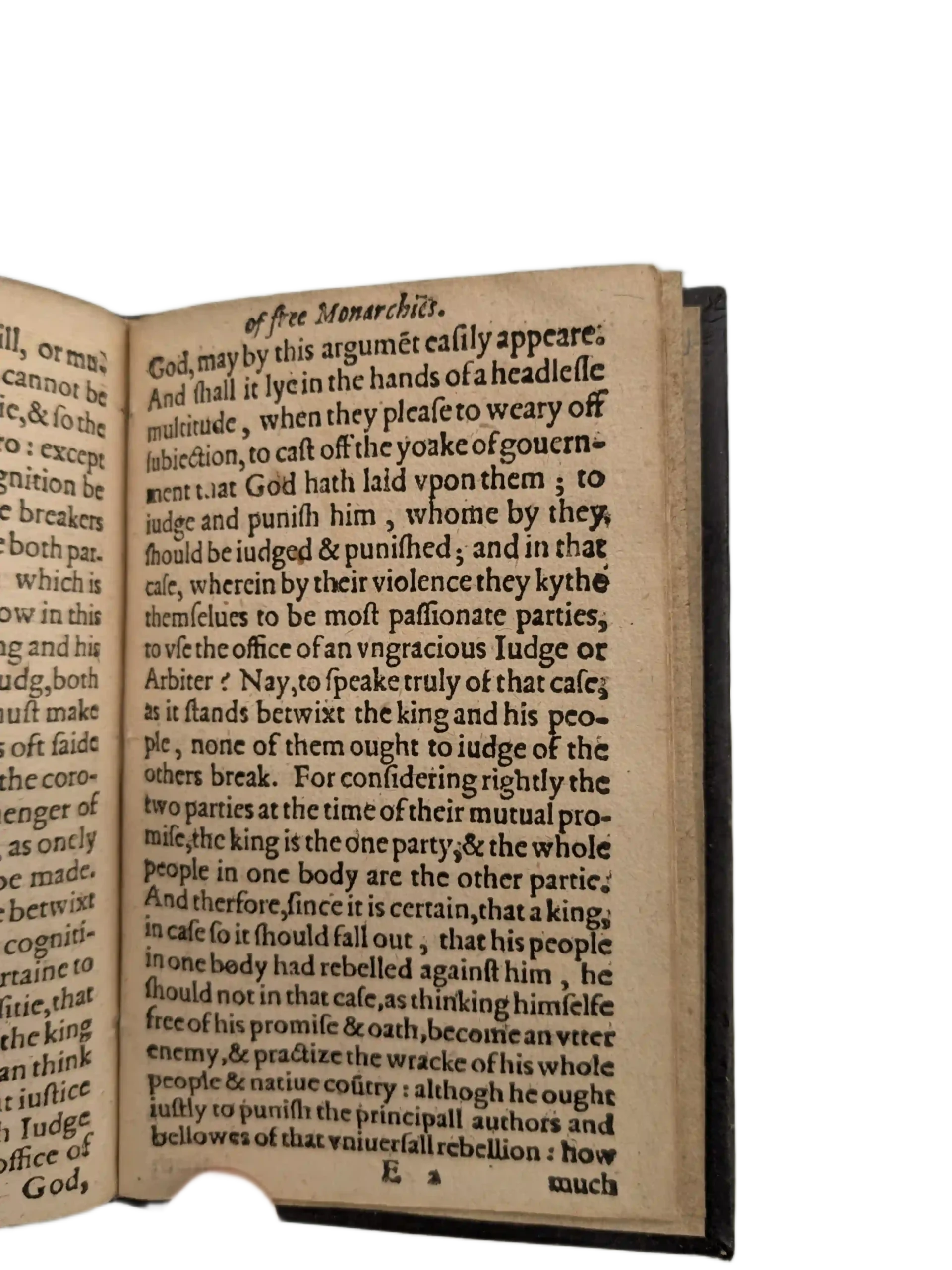
God, may by this argument easily appeare.
And shall it lye in the hands of a headlesse
multitude, when they please to weary off
subjection, to cast off the yoake of govern-
ment that God hath laid upon them; to
judge and punish him, whome by they,
should be judged & punished; and in that
case, wherein by their violence they kythe
themselves to be the most passionate parties,
to use the office of an ungracious Judge or
Arbiter? Nay, to speake truly of that case,
as it stands betwixt the king and his peo-
ple, none of them ought to judge of the
others break. For considering rightly the
two parties at the time of their mutual por-
mise, the king is the one party, & the whole
people in one body are the other partie.
And therfore, since it is certain, that a king,
in case so it should fall out, that his people
in one body had rebelled against him, he
should not in that case, as thinking himselfe
free of his promise & oath, become an utter
enemy, & practize the wracke of his whole
people & native country: althogh he ought
justly to punish the principall authors and
bellowes of that universall rebellion: how
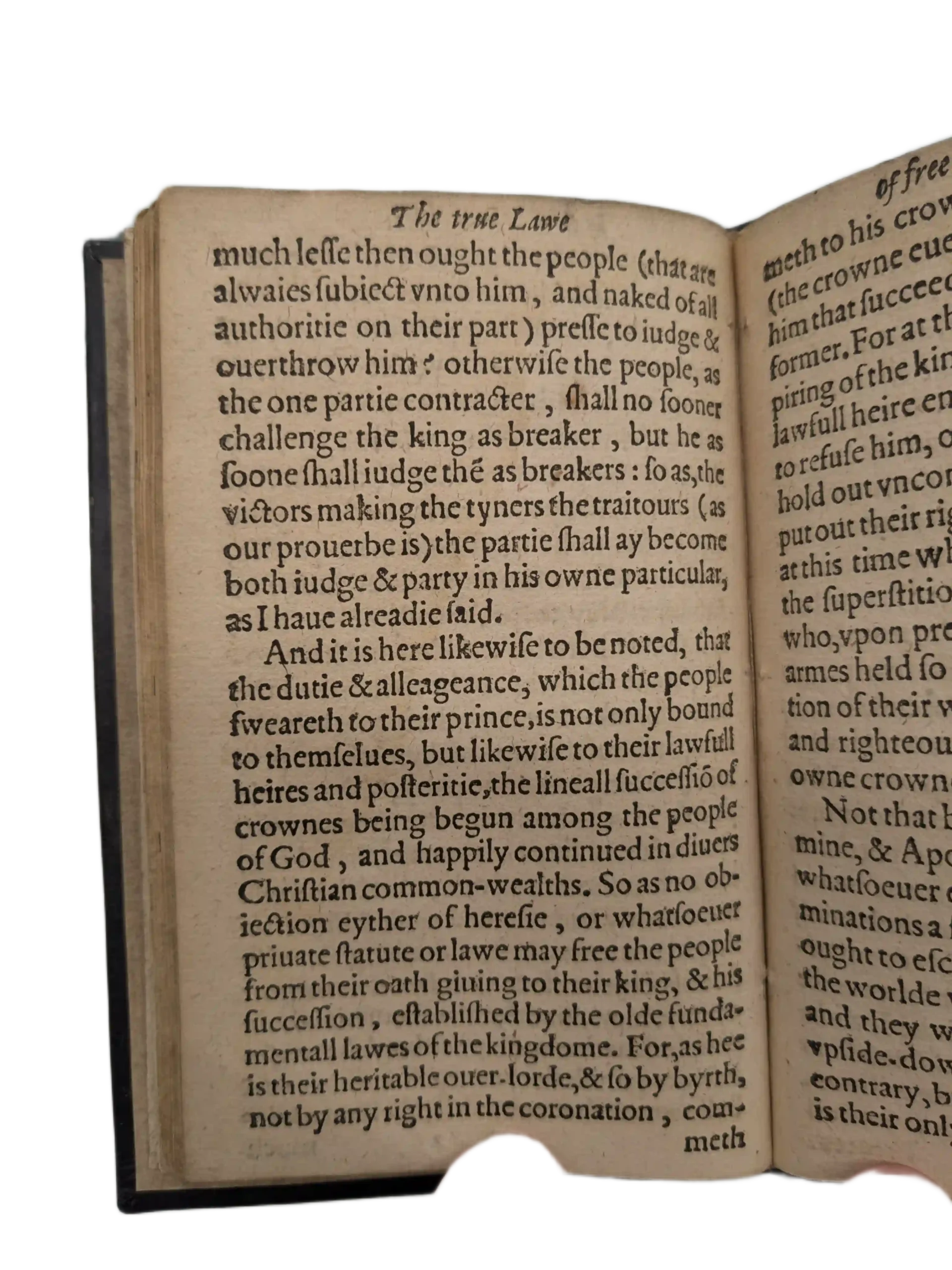
much lesse then ought the people (that are
alwaies subject unto him, and naked of all
authoritie on their part) presse to judge &
overthrow him? otherwise the people, as
the one partie contractor, shall no sooner
challenge the king as breaker, but he as
soone shall judge them as breakers: so as, the
victors making the tyners the traitours ( as
our proverbe is) the partie shall ay become
both judge & party his owne particular,
as I have alreadie said.
And it is here likewise to be noted, that
the dutie & alleageance, which the people
sweareth to their prince, is not only bound
to themselves, but likewise to their lawfull
heires and posteritie, the lineall succession of
crownes being begun among the people
of God, and happily continued in divers
Christian common-wealths. So as no ob-
jection eyther of heresie, or whatsoever
private statue or lawe may free the people
from their oath giving to their king, & his
succession, established by the olde funda-
mentall lawes of the kingdome. For, as hee
is their heritable over-lorde, & so by byrth,
not by any right in the coronation, com-
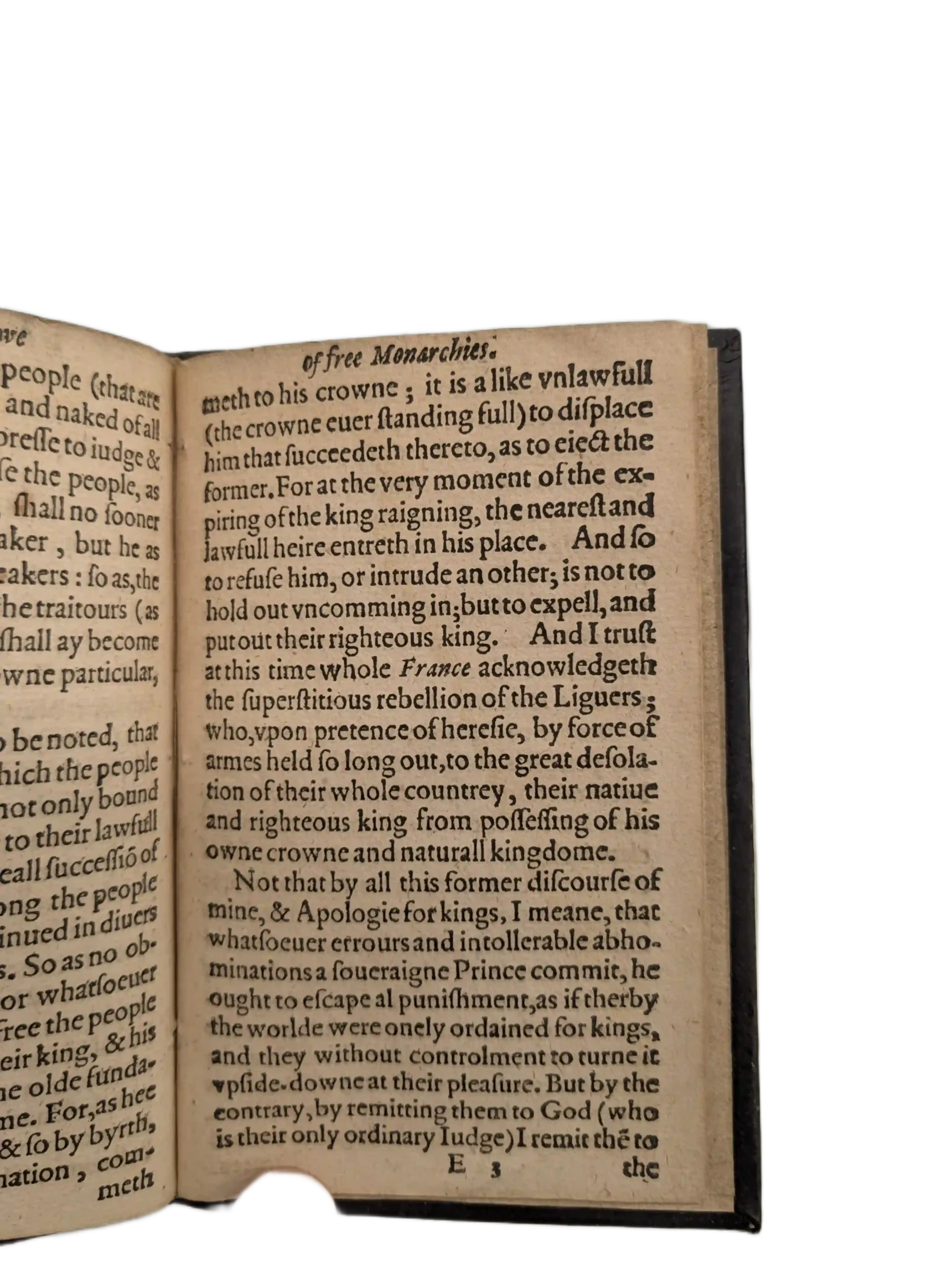
meth to his crowne; it is a like unlawfull
(the crowne ever standing full) to displace
him that succeedeth thereto, as to eject the
former. For at the very moment of the ex-
piring of the king raigning, the nearest and
lawfull heire entreth in his place. And so
to refuse him, or intrude an other; is not to
hold out uncomming in; but to expell, and
put out their righteous king. And I trust
at this time whole France acknowledgeth
the superstitious rebellion of the Liguers;
who, upon pretence of heresie, by force of
armes held so long out, to the great desola-
tion of their whole countrey, their native
and righteous king from possessing of his
owne crowne and naturall kingdome.
Not that by all this former discourse of
mine, & Apologie for kings, I meane, that
whatsoever errours and intollerable abho-
minations a soveraigne Prince commit, he
ought to escape al punishment, as if therby
the worlde were onely ordained for kings,
and they without controlment to turne it
upside-downe at their pleasure. But by the
contrary, by remitting them to God(who
is their only ordinary Judge) I remit them to
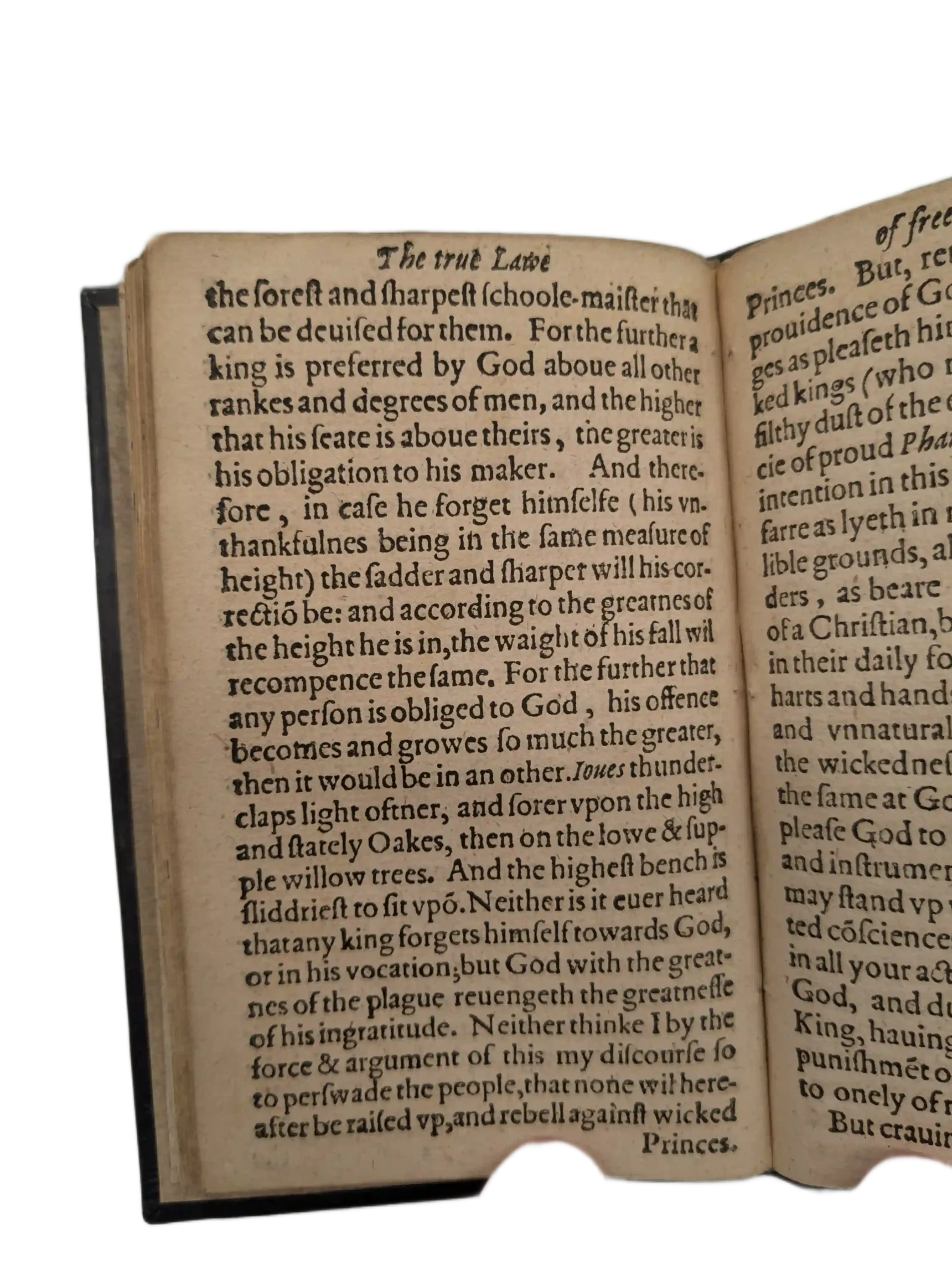
the sorest and sharpest schoole-maister that
can be devised for them. For the further a
king is preferred by God above all other
rankes and degrees of men, and the higher
that his seate is above theirs, the greater is
his obligation to his maker. And there-
fore, in case he forgot himselfe (his un-
thankfulnes being in the same measure of
height) the sadder and sharper will his cor-
rection be: and according to the greatnes of
the height he is in, the waight of his fall wil
recompence the same. For the further that
any person is obliged to God, his offence
becomes and growes so much the greater,
then it would be in an other Joves thunder-
claps light oftner, and sorer upon the high
and stately Oakes, then on the lowe & sup-
ple willow trees. And the highest bench is
sliddriest to sit upon. Neither is it ever heard
that any king forgets himself towards God,
or in his vocation; but God with the great-
nes of the plague revengeth the greatnesse
of his ingratitude. Neither thinke I by the
force & argument of this my discourse so
to perswade the people, that none wil here-
after be raised up, and rebell against wicked
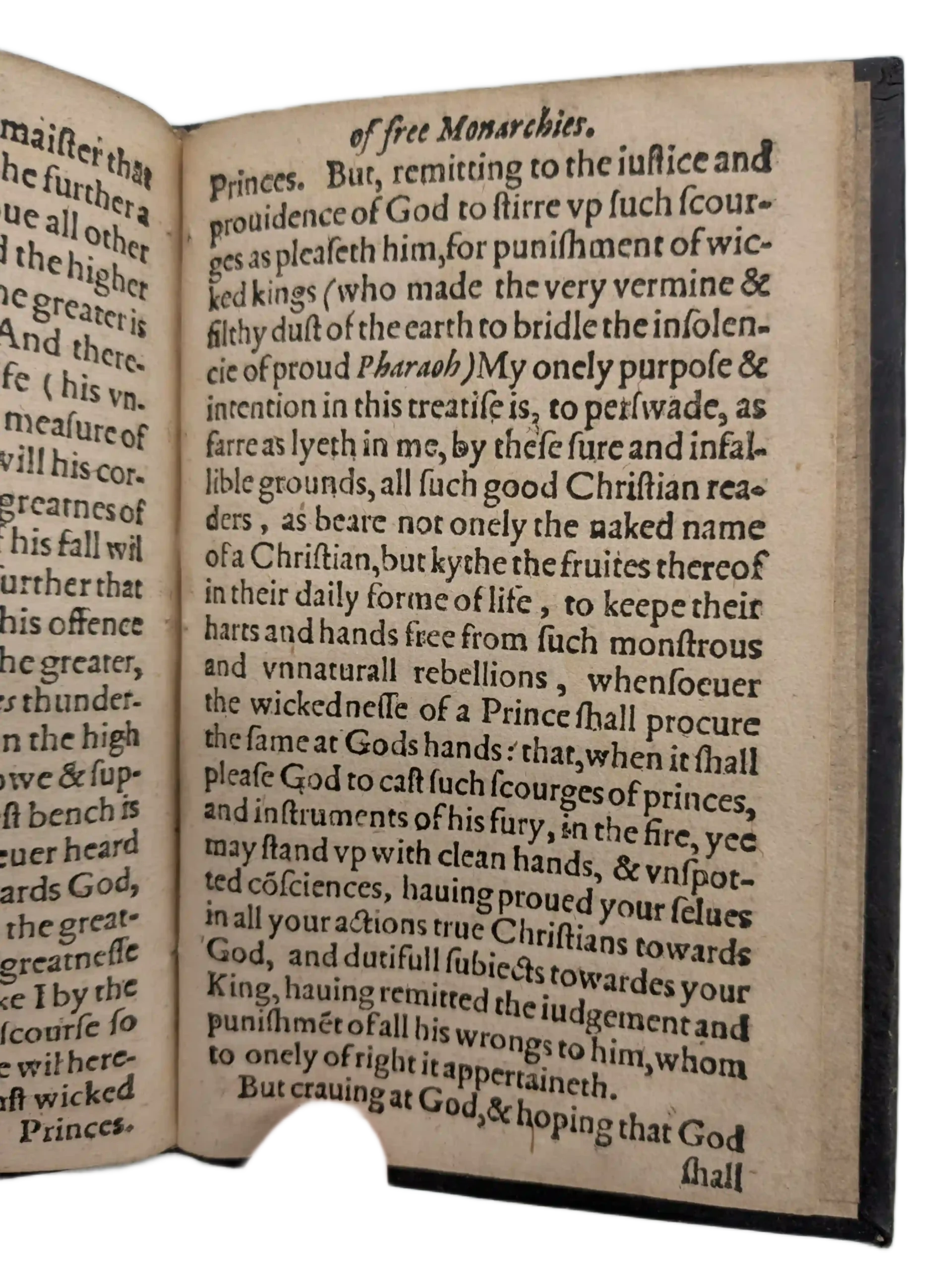
Princes. But, remitting to the justice and
providence of God to stirre up such scour-
ges as pleaseth him, for punishment of wic-
ked kings (who made the very vermine &
filthy dust of the earth to bridle the insolen-
cie of proud Pharaoh) My onely purpose &
intention in this treatise is, to perswade, as
farre as lyeth in me, by these sure and infal-
lible grounds, all such good Christian rea-
ders, as beare not onely the naked name
of a Christian, but kythe the fruites thereof
in their daily forme of life, to keepe their
harts and hands free from such monstrous
and unnaturall rebellions, whensoever
the wickednesse of a Prince shall procure
the same at Gods hands : that, when it shall
please God to cast such scourges of princes,
and instruments of his fury, in the fire, yee
may stand up with clean hands, & unspot-
ted consciences, having proved your selves
in all your actions true Christians towards
God, and dutifull subjects towardes your
King, having remitted the judgement and
punishment of all his wrongs to him, whom
to onely of right it appertaineth.
But craving at God, & hoping that God
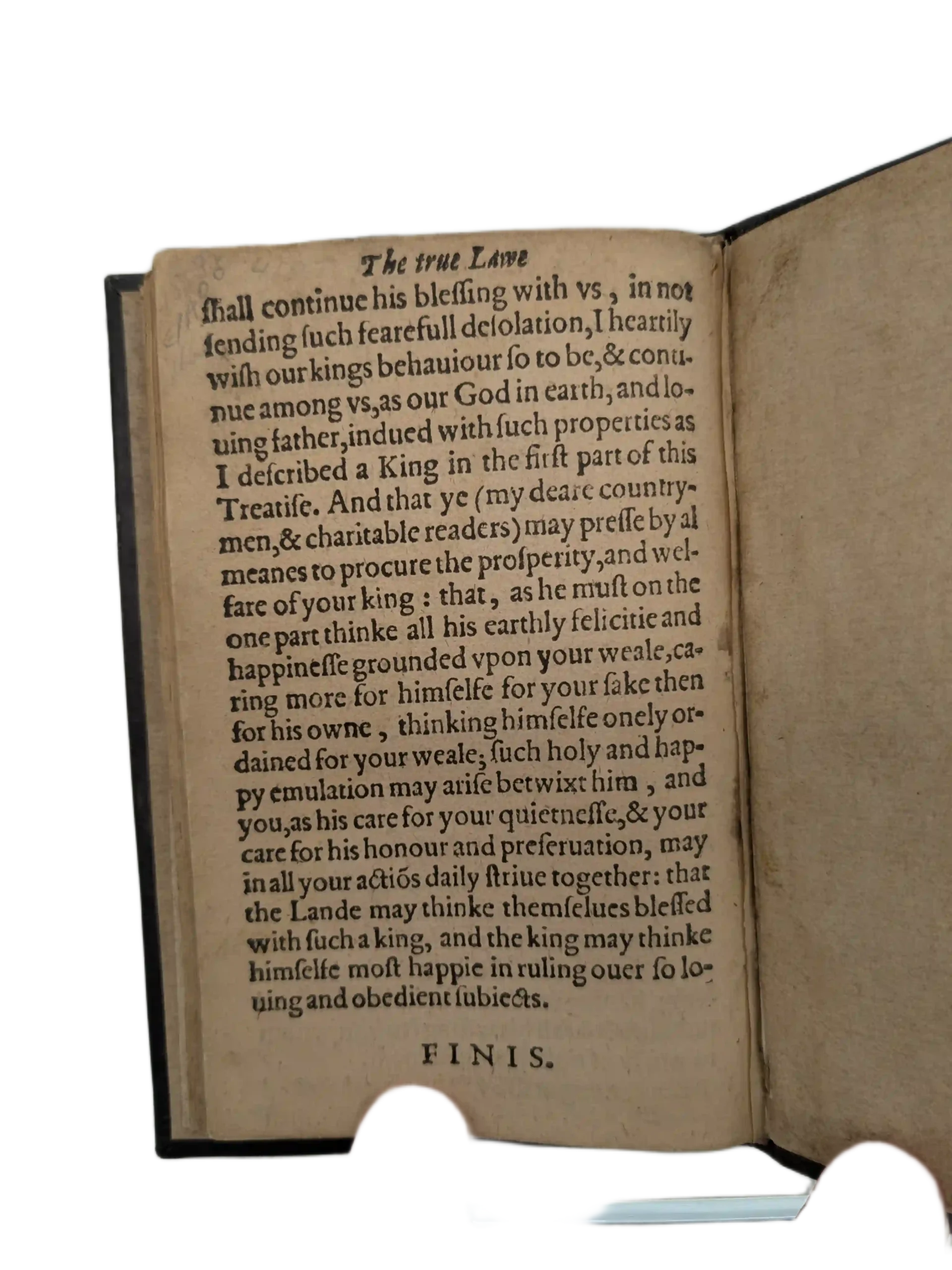
shall continue his blessing with us, in not
sending such fearefull desolation, I heartily
wish our kings behaviour so to be, & conti-
nue among us, as our God in earth, and lo-
ving father, indued with such properties as
I described a King in the first part of this
Treatise. And that ye (my deare country-
men, & charitable readers) may presse by al
meanes to procure the prosperity, and wel-
fare of your king : that, as he must on the
one part thinke all his earthly felicitie and
happinesse grounded upon your weale, ca-
ring more for himselfe for your sake then
for his owne, thinking himselfe onely or-
dained for your weale; such holy and hap-
py emulation may arise betwixt him, and
you, as his care for your quietnesse, & your
care for his honour and preservation, may
in all your actions daily strive together: that
the Lande may thinke themselves blessed
with such a king, and the king may thinke
himselfe most happie in ruling over so lo-
ving and obedient subjects.
FINIS.
Collections
Tags
EARLY ACCESS: Transcription is under editorial review and may contain errors.
Please do not cite or otherwise reproduce without permission.
Footnotes
- 1Psal. 82
- 2Psal. 101. 2 King 18. 2 Chro 29. 2 Kin 22. & 23.2.34, & 35. Psal 72 1 King. 3.
- 3Rom. 13.
- 41 Sam. 8..
- 5Jer.29.